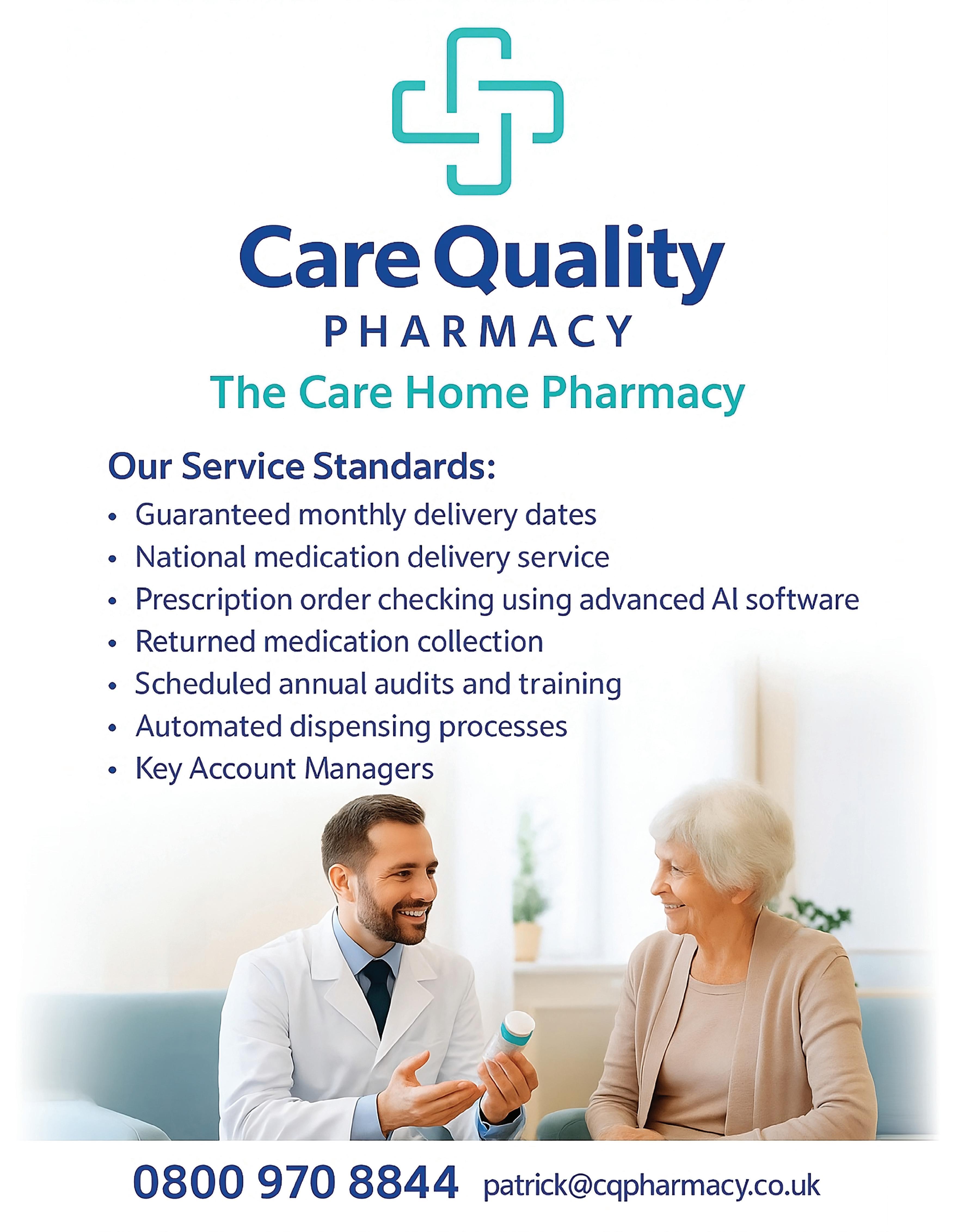

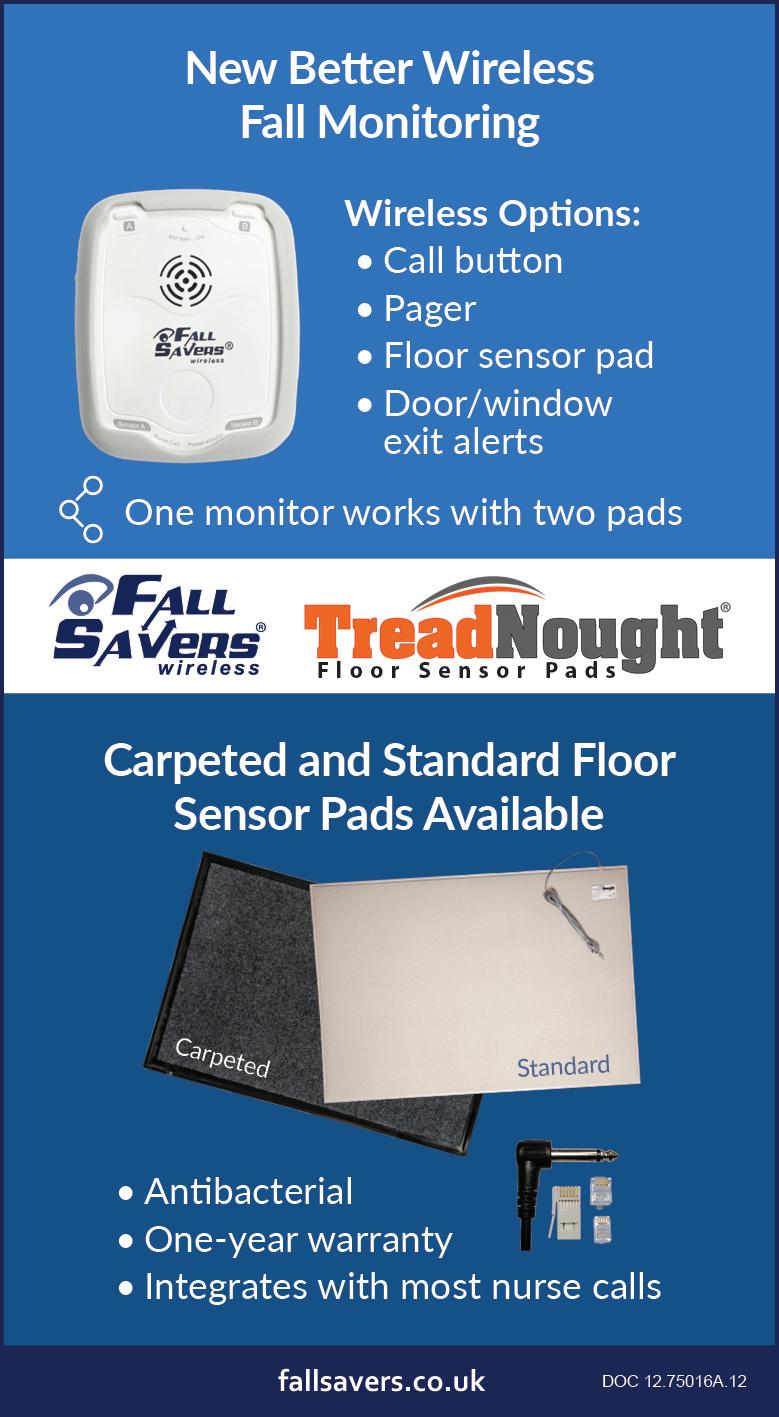














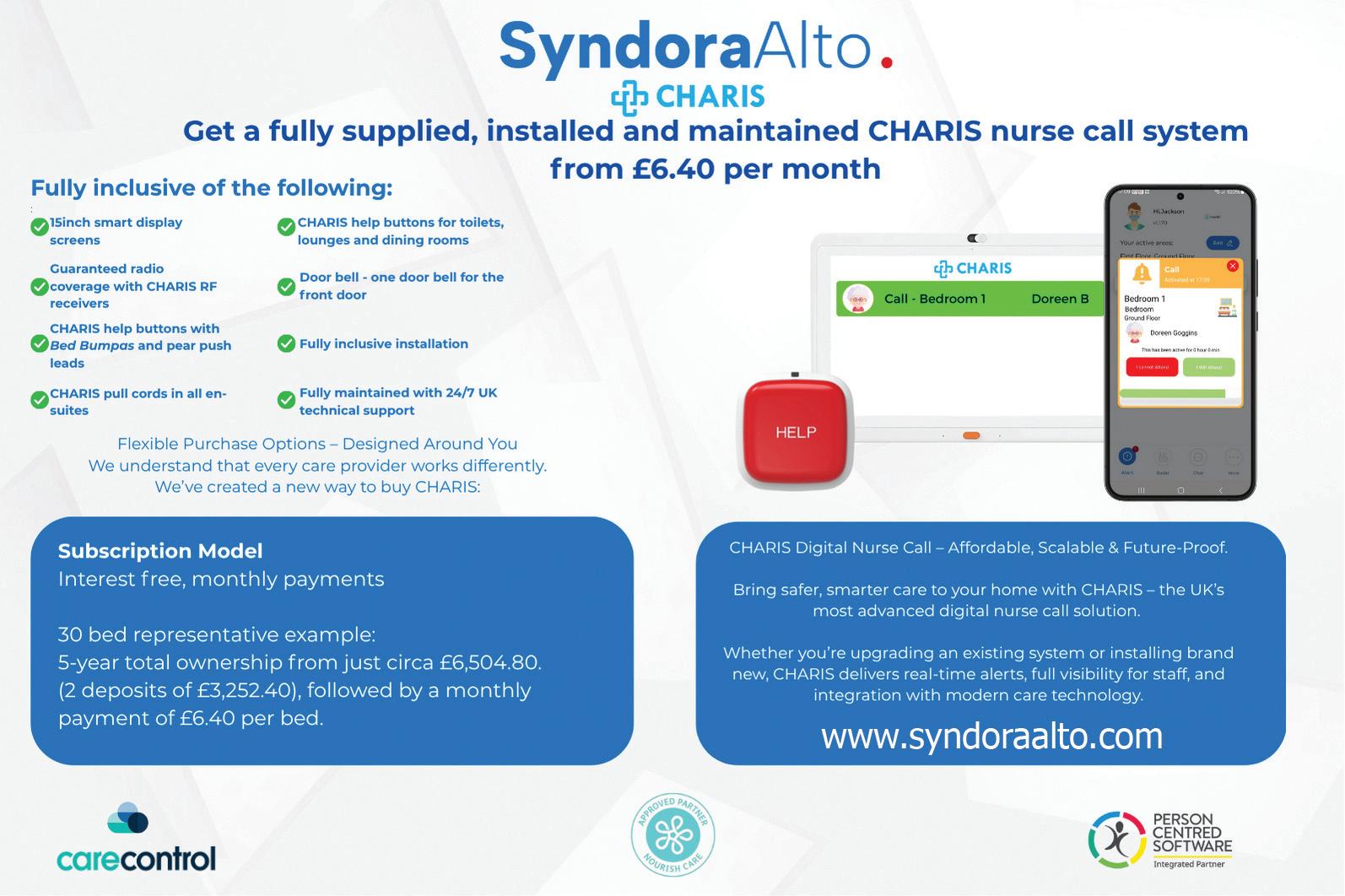
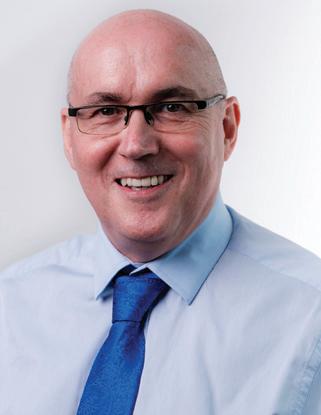
As I read and researched our lead story which highlights the scale of Britain's health crisis I found myself genuinely shocked by the numbers.
The Treasury faces an annual burden exceeding £20 billion due to long-term illness, with projections suggesting this could triple to over £66 billion within six years. Currently, eight million citizens depend on health-related benefits.
The statistics paint a stark picture: our workforce is contracting, output per worker is falling, and demands on healthcare and social services continue their relentless climb.
Analysts warn we could see long-term sick leave increase by half over the coming five years.
This trajectory could leave more than four million people absent from employment by decade's end—a crisis that threatens both individual employers and our national economy. These trends simply cannot continue.
There's a crucial distinction between living longer and living well. Medical science has extended our years, yet whether those additional years bring vitality or struggle depends entirely on our health.
British men now live to nearly 80, women to 83. But here's the troubling part: the years we can expect to enjoy in good health have plateaued or even retreated recently, despite better working and living standards than previous generations knew. We're seeing more people surviving with multiple chronic conditions requiring ongoing management.
As someone from an earlier generation, I find this trajectory deeply concerning.
This new partnership initiative deserves recognition. Addressing our national health emergency cannot fall solely to healthcare providers or policymakers—it demands commitment from business leaders and, frankly, from each of us as individuals.
The ancient Greek healer Hippocrates understood over two millennia ago that stopping illness before it starts beats treating it afterwards!
The care profession faces particular pressures, reflected in some of the sector's highest absence rates across all industries. And this initiative is encouraging businesses from all sectors to step forward with prevention strategies, timely support

and workplaces designed around wellbeing.
I'm pleased the social care sector acknowledges this responsibility.
When companies support their teams' health, everyone benefits: healthcare services face less strain, businesses operate more effectively, and people feel better.
Over the weeks ahead, particularly as we approach the festive period—when care professionals sacrifice time with their own families to serve others—we'll be sharing expert guidance on workplace wellness.
Finally, a personal request: here at THE CARER, we're eager to receive and publish your Remembrance Day tributes and commemorations. We've had the honour of producing special Remembrance supplements in previous years, and 2025 will be no different. We've already received some moving stories and tributes— please continue sending them our way!

I would encourage our readers to sign up for our bi-weekly digital newsletter at www.thecareruk.com and follow us on social media for all the latest news. I can always be contacted at editor@thecareruk.com
The Carer is published by RBC Publishing Ltd, 3 Carlton Mount, 2 Cranborne Road, Bournemouth, Dorset BH2 5BR.
damage. Views expressed within this publication are not necessarily those of the publisher or the
responsibility for any effects, errors or omissions therefrom. All rights reserved, reproduction is forbidden unless


(CONTINUED FROM FRONT COVER)
Published today (November 5), the landmark Review sets out the stark reality facing the UK:
• One in five working-age adults are now out of the labour force –800,000 more than in 2019 due to health reasons
The cost of ill-health that prevents work equals 7% of GDP – nearly 70% of all income-tax receipts
UK employment among disabled people stands at 53%, below leading OECD nations
Employers lose 85 billion a year from sickness, turnover, and lost productivity
In response, the government will partner with employers to reshape how health issues and disabilities are managed in the workplace with the launch of employer-led Vanguards.
REDUCE SICKNESS ABSENCE
The Vanguards – including Mayoral Combined Authorities and SMEs – are early adopters who will develop and refine workplace health approaches over the next three years to build the evidence base for what works.
They’re committing to embracing the report’s healthy working lifecycle – which aims to reduce sickness absence, improve return-to-work rates, and increase disability employment rates – which the government will work towards developing into a voluntary certified standard by 2029.
It builds on the work the government is doing to give businesses the skilled workforce they need by investing 1 billion annually in disability employment support by the end of the decade – giving people the skills and opportunities to move out of poverty and into good, secure jobs as part of the Plan for Change.
AVOIDABLE CRISIS
Sir Charlie Mayfield, author of the Keep Britain Working Review, said: “Britain is sliding into an avoidable crisis. Ill-health has become one of the biggest brakes on growth and opportunity. But this is not inevitable.
“Employers are uniquely placed to make a difference, preventing health issues where possible, supporting people when they arise, and helping them return to work. If we keep Britain working, everyone wins – people, employers, and the state.
“That’s why the action the government is taking forward from my Review is so important. I’m looking forward to working with them and with employers, large and small, to keep people in work, unlock potential and build a healthier, more prosperous Britain.”
To help drive this work forward Sir Charlie Mayfield will co-lead a
Vanguard Taskforce with Ministers, bringing together employers, disabled people, workers’ representatives, and health experts.
The Taskforce will work with Vanguards to develop the interventions and build the evidence for what works. This will inform wider reform by identifying what approaches could become part of the future employment landscape and drive adoption.
UK CARE SECTOR
Sickness, particularly due to mental ill-health and chronic stress, is a primary driver of high absenteeism and a significant contributor to the current staffing crisis in the UK care sector. Poor working conditions, high workloads, and insufficient resources are key underlying causes, creating a "vicious cycle" of staff shortages and burnout.
Key Statistics and Findings
Prevalence of Mental Ill-Health: Anxiety, stress, depression, and other psychiatric illnesses are consistently the most reported reasons for sickness absence in the health and social care sectors.
• Significant Days Lost: In one year (2022-2023), councils in England lost over 500,000 working days to mental ill-health and stress among their social care staff. Mental health issues and work-related stress combined accounted for nearly a third (30%) of all sickness absence days in the councils surveyed.
• Highest Among All Professions: The social care and social work sectors have among the highest levels of stress-related sickness absence in the UK compared to the general workforce. NHS employees are two to three times more likely to require absence for mental ill-health than the average UK employee.
Rising Rates: Sickness absence rates across the health and social care sectors have remained elevated since the COVID-19 pandemic, with reported rates in the NHS in 2022 being 29% higher than in 2019.
Impact on Workforce: High sickness absence is linked to staff burnout, lower job satisfaction, increased staff turnover, and a higher likelihood of individuals leaving the sector altogether
VITAL ROLE
Matthew Taylor, chief executive of the NHS Confederation, said: “We welcome this groundbreaking review into the number of people out of work due to health reasons and the significant cost of ill-health to the UK economy. As the report sets out, better workplace health support is beneficial for individuals, the NHS and the wider economy. By working together across sectors, we can stem the flow into economic inactivity and unlock the potential of a healthier, more prosperous population.
“The recommendations offer a clear path toward fulfilling the government’s Ten-Year Health Plan commitment to set outcome targets
for reducing economic inactivity across every Integrated Care Board. Health leaders know that employers have a vital role to play in delivering the shift from treatment to prevention – by creating healthier workplaces and supporting staff to stay well and in work.
“The review also builds on excellent work already happening across the system. Health leaders are working closely with employers and other key partners to develop a comprehensive, whole-system approach to help people return to, and remain in, work. Initiatives such as the Health and Growth Accelerators and WorkWell are demonstrating the power of collaboration as they integrate health support with employment services.”
ENGAGE LOCAL EMPLOYERS
Cllr Dr Wendy Taylor, Chair of the LGA’s Health and Wellbeing Committee, said: “The LGA supports the ambition of the Keep Britain Working report to tackle economic inactivity and support people to stay in and return to work. Councils are already leading efforts to improve health, reduce inequalities, engage local employers and help people overcome barriers to employment through public health, social care, and employment support programmes such as Connect to Work.
"However, these proposals will only succeed if local government is fully involved. Councils have statutory responsibilities for public health and social care and are uniquely placed to deliver integrated, placebased solutions that address the wider determinants of health. We urge Government to work with councils and combined authorities to ensure reforms are joined up and make the most of local expertise.”
David Hare, Chief Executive of the Independent Healthcare Providers Network (IHPN), said: “This important new report makes crystal clear the need for Government and businesses to work together and make improving workplace health a top priority.
“Independent healthcare providers have a key role to play in supporting the health of the workforce, including through the delivery of much-needed occupational health services, as well as vital treatment funded by private medical insurance which is now offered by record numbers of employers.
“We look forward to continuing our work with the Government on this important agenda – helping to build up a sustainable market for occupational health services, along with the sector’s involvement in the rollout of employer- led “Vanguards” which will be integral to building the evidence base for “what works” in reducing the rates of economic activity and improve the health of the workforce”.
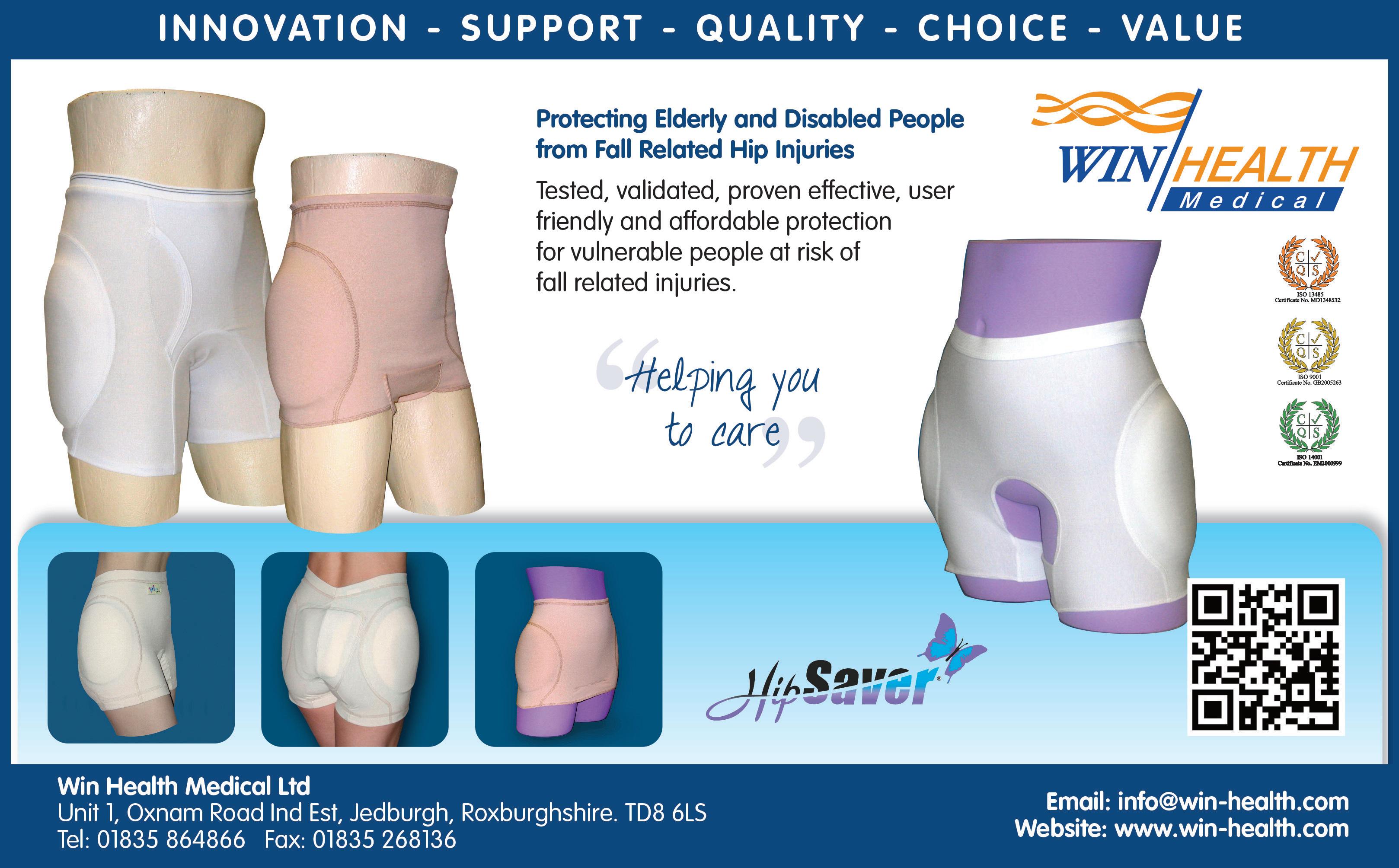
By Greg McNally, founder of independent VAT advisory firm

A practice that until recently was accepted by HMRC, and in many cases encouraged by advisors, is now being labelled tax avoidance. Care providers need to take urgent notice as HMRC expects action, so the sooner this is addressed the better.
The UK care sector sits at a unique intersection of social responsibility, public funding, and complex taxation. For decades, the provision of care, whether residential or at home, has been exempt from VAT. That means most care providers do not charge VAT, many do not need to register for VAT, and crucially, they cannot recover VAT on the costs they incur.
This has long been a frustration for operators in an industry already under immense financial strain. Rising energy costs, wage pressures, and tightening local authority budgets have left little room for manoeuvre. It’s no surprise, then, that creative advisors began looking for a way to improve VAT recovery and for many years, they found one.
Around 15 years ago, a number of specialist advisors developed a structure that enabled care operators to register for VAT, charge VAT to local authorities, and reclaim a significant portion of the VAT paid on operating and capital costs. For providers with large developments or refurbishments, these recoveries could be substantial.
Here’s how it worked: a new unregulated subsidiary company was created to deliver the care, and that subsidiary was grouped for VAT purposes with the regulated parent entity. The care provider charged VAT to the local authority, but since local authorities can reclaim VAT under Section 33 of the VAT Act, this was largely neutral for them. The net result was the ability to recover significant amounts of VAT for providers, and no additional cost to the funding bodies.
Initially, this arrangement had the quiet acceptance, and in some cases the awareness, of all relevant stakeholders, including local authorities, the Care Inspectorate, and even HMRC. For a time, it seemed a sensible, well-understood way to level the playing field.
Over the years, word spread. More and more advisors began to promote the model, and several boutique firms emerged that specialised solely in implementing it. While the majority followed the correct channels, some operators adopted the structure without seeking prior approval from HMRC.
For a while, the tax authorities appeared unbothered. But in April 2025, the tone changed dramatically. A new policy statement confirmed that VAT structures involving the use of VAT groups would now be viewed as tax avoidance. Moreover, HMRC announced that any new VAT group applications designed to facilitate this model would be rejected outright.
The timing is telling. With the government facing a significant fiscal shortfall, and scrutiny on every potential source of “lost” tax revenue, it is easy to see why HMRC might now be tightening the rules.
For providers currently using this structure, HMRC has told them to make contact through a dedicated team. The clear direction is that the structure’s days are numbered, though the precise details of how and when it will be unwound remain uncertain.
At VITA, we have already seen HMRC begin contacting care operators and seem to be working through its list systematically. Local authority support is also waning, with some councils proactively asking providers for updates.
Unfortunately, there is a degree of apathy in the sector, with some operators taking a “head in the sand” approach. That is risky. Our advice is simple: take the lead.
Engage with HMRC early, demonstrate transparency, and work towards a fair cessation plan. Those who do will be in a far stronger position to negotiate reasonable treatment and timelines.
While most affected operators are privately run, a proportion are charitable organisations. For them, the issue carries added weight: trustees must be kept informed, and inaction could raise governance concerns.
Accredited and experienced professional advisors can support both commercial and charitable operators through this process, liaising with HMRC, local authorities, and trustees to ensure full compliance and minimal disruption.
There is also a broader policy story here. For years, the now-defunct VAT structure helped reduce operators’ costs and kept care fees more affordable, even as local authority funding stagnated. Now, with the model being withdrawn, providers will need to revisit their pricing and ensure future contracts reflect their true cost base.
Local authorities, already under pressure, will no doubt feel the ripple effects. If VAT can no longer be reclaimed through this structure, the underlying cost of care is likely to rise, an outcome that will have both political and practical implications across the sector.
Ultimately, this change marks the end of an era for VAT planning in the care sector. It is a reminder that while creative structuring can deliver real value, it must evolve with policy and compliance trends. For providers still using or considering such arrangements, the message is clear: act now. Take professional advice, communicate openly with stakeholders, and prepare for change.
In a sector as vital as care, it is better to be leading the conversation than catching up after the fact.
The Barchester Care Awards 2025 were held on October 23rd at The Midland Hotel in Manchester. Regional finalists from across Barchester’s six divisions gathered in person and virtually to celebrate the outstanding achievements of Barchester’s many exemplary staff members who work tirelessly to deliver the best person-centred care to their residents and patients every day. Homes and hospitals dialled in to cheer on their nominees with banners, balloons and confetti cannons at the ready.
The Barchester Care Awards take place annually to celebrate the staff who go the extra mile for the benefit of the 13,500 residents living in Barchester’s 268 care homes and private hospitals across the country.
The 19 different categories up for grabs range from ‘Team of the Year’ and ‘Carer of the Year’ to ‘Dementia Care Champion’ and ‘Activities Coordinator of the Year’. This year, a staggering 5,258 nominations were received for teams from homes and hospitals all across the UK.
THIS YEAR’S DESERVING WINNERS WERE:
Deputy Manager of the Year – Ovi Gall, Chalfont Lodge Learner of the Year – Donna Johnston, Cherry Trees

Health & Safety Champion – Peter Laing, Crandon Springs
Volunteer of the Year – Andrew Morrison, Canmore Lodge
Resident Ambassador – Kaye Bracegirdle, Lanercost House
Carer of the Year – Yvonne Smith, Falmouth Court
Care Practitioner of the Year – Josephine Shingwele, Austen House
Barchester’s Charitable Foundation Champion – Amy Melia
Registered Nurse of the Year – Michaela Hallett, Castle Lodge Team of the Year – Hall Park
Home Administrator of the Year – Laura Hayden, Hundens Park Lifetime Achievement Award – Ahmet Akkur, Archview Lodge
Dementia Champion – Katherine Smith, Tixover House
Activities Coordinator of the Year – Agata Prendota, Glenroyd
Maintenance Champion of the Year – Gareth Lewis, Chacombe Park
Chef of the Year – Abin Babu, Friston House
Garden of the Year – Chalfont Lodge
Hospitality Champion – Tracy Millichap, Mount Vale
General Manager of the Year – Subin Sebastian, Atfield House
Dr Pete Calveley, CEO of Barchester Healthcare, commented: “Everyone knows that my favourite day of the year is hosting the Barchester Care Awards where we recognise and thank all of our colleagues for their hard work and dedication. We have the best teams in the world and I couldn’t be prouder of each and every one of them, they are all remarkable people and it is my privilege to work alongside them.”
A staff member who moved over to the UK from Germany has marked 20 years’ service with the home.
Gabriela Ryder moved to Lincoln from Germany just over 20 years ago and started working at MHA Stones Place soon after.
Despite having reservations initially and feeling homesick, Gabriela wasn’t expecting to stay, but fast forward 20 years later and she is still a part of the MHA Stones Place family.
To mark her achievement, Gabriela was presented with some flowers, her long service certificate as well as other gifts by the management team.
Speaking after the presentation Gabriela said: “When I came over from Germany, my mother-in-law told me there would be plenty of jobs around the area, so within the first year I found MHA Stones Place and the manager at the time told me she would contact me when something came available.
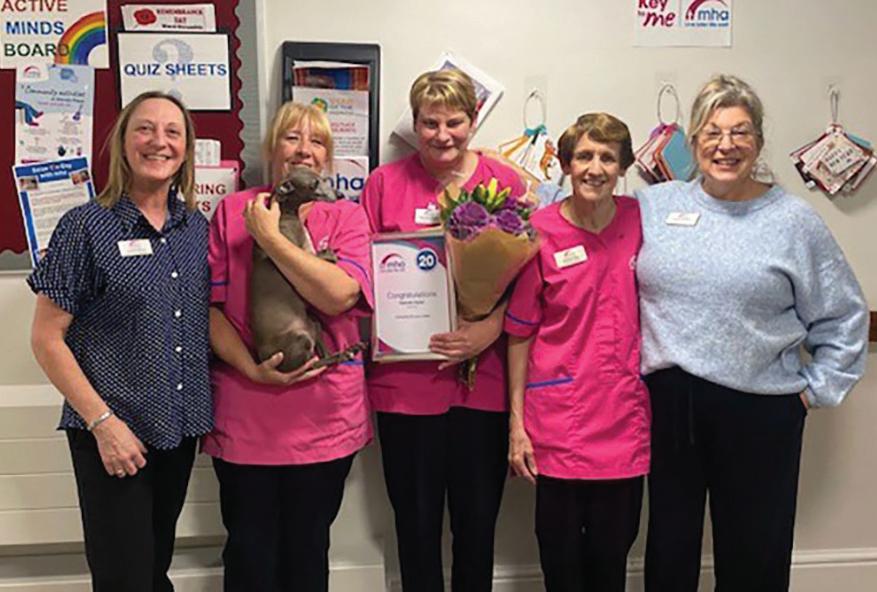
“I live a 10-minute walk away, so it was an ideal location to walk as I don’t drive.
“I have been a domestic assistant the whole 20 years, but the job itself has changed over the years.
“I didn’t think I would be here for 20 years as I was home sick at first from leaving Germany, but the longer I stayed I started to enjoy working here.
“The residents were great to get to know, and they helped me with learning English, and I am very happy to still be working here.
“I was surprised when I was awarded my gifts and achievement certificate, but it was very nice to receive my flowers, certificate, badge and voucher from MHA presented to me in front of the residents and staff.
“For me to succeed in working in care you have to give it a good try, stick it out as you will really enjoy it and you will be well supported by the homes management team and colleagues”.
A new survey of councils in England reveals that just two per cent believe the £842 million-a-year Crisis and Resilience Fund (CRF) will be sufficient to meet the local welfare needs of their to a great extent.
The recent survey by the Local Government Association (LGA) sought the views of councils in England on the design of the new fund and other aspects of local welfare provision. Two thirds of respondents reported they had seen households’ financial hardship increase in the last year and expected this trend to continue.
Councils are currently engaging with government on the design of the new fund due to replace the existing council-delivered Household Support Fund (HSF) and Discretionary Housing Payments (DHP) from April 2026.

The multi-year CRF will combine emergency support and preventative approaches with the aim of building greater financial resilience among households and communities.
The HSF provides a vital source of funding for councils to provide crisis support to families at risk of immediate hardship, both through cash-first support and as vouchers and in-kind support, as well as funding longer-term financial resilience support such as debt advice. DHP enables councils to provide additional financial support to people who are struggling to meet their housing costs.
Over two thirds of surveyed councils were in favour of a new fully funded statutory requirement for local advice provision, and nearly half of upper tier councils surveyed have an additional local welfare scheme in place to support the poorest households.
Councils said they recognise the potential benefits of bringing the two funds together and the commitment from government to putting funding for local welfare provision on a more sustainable footing.
However, some expressed concerns about tight delivery timelines, funding adequacy and the administrative burden of introducing the new fund – only 15 per cent of councils are confident the CRF will be ready to implement by April 2026.
Cllr Dr Wendy Taylor, Chair of the LGA’s Health and Wellbeing Committee, said: “Financial security and wellbeing are closely intertwined with the overall health and wellbeing of individuals and families and life expectancy, so reducing financial hardship can have a direct impact on reducing existing health inequalities across the country.
“We are pleased that the Government has maintained funding for local welfare support through the new CRF by bringing together the current HSF and DHP schemes. However, it is important that the best of these schemes is retained, particularly their role in supporting long-term financial resilience.
“Streamlining the funds together will be a challenge as they are currently administered by different tiers of local government, with different rules and purposes. Local councils are ready to work closely with DWP and MHCLG as they develop and implement the new approach.
“Councils should have a key role in commissioning and the delivery of these services to ensure that they can be effectively integrated with local services to improve health and wellbeing and deliver for those households in most need. Local councils are best placed to represent the needs of their residents. With only 15 per cent of councils confident the new fund will be ready to implement by April, it is vital that the development of the new approach is informed by the experiences of residents, support organisations and councils.”
At The Carer, we consider it a great privilege to publish and share the meaningful ways care homes across the UK commemorate Remembrance Day.
As we approach this year’s commemorations, communities throughout the country will gather to honour those who served. Remembrance Sunday falls on 9th November, followed by Armistice Day on Tuesday, 11th November, when the nation will fall silent at 11am.
These occasions give us the opportunity to remember the service and sacrifice of those who defended our freedoms – the Armed Forces and their families from Britain and the Commonwealth, the emergency services, and all who lost their lives through conflict or

terrorism.
Last year, we were honoured to share your 2024 commemorations with our readers across print, digital and online platforms, and the response was deeply moving.
We would love to feature your 2025 Remembrance commemorations. We warmly invite you to send us your stories, photographs, activities and tributes – whether you’re holding special services, displaying memory boards, sharing residents’ personal wartime experiences, or marking the occasion in other meaningful ways.
Please send your contributions to: editor@thecareruk.com
Help us honour the memory of those who served by sharing how your home remembers.

Comment from Paul Ko Ferrigno,
CEO at éclateral (https://eclateral.com)
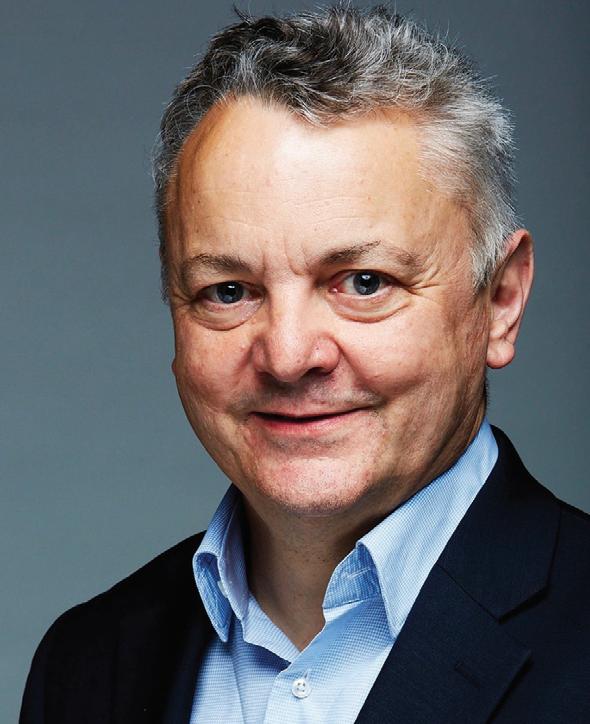
Earlier this year, the Government launched its 10 Year Health Plan, which set out an ambitious strategy to provide healthcare in the community as part of a more sustainable model for the future of the NHS.
The plan outlined significant change in the way the health care system works, with a more integrated, digital model that will see benefits for patients and healthcare professionals alike.
The plan has been generally well received, as the strategy it outlines will shift pressure away from the health system and distribute it more widely across the community. However, despite the fact that Social Care is already community based, and to a great extent already digitally integrated, the sector gets barely a mention.
It may be that this is because we need to wait for the outcome of the Casey review to see how Social and healthcare will work together at community level. However it feels as though, as crucial care givers in the community, it is important that those working in Social Care are empowered to help achieve this shift and to understand what a greater focus on community-first care means for them. Ultimately this shift will result in a significant change of procedure. There will be opportunities for upskilling as medical care is provided closer to patients, including clients in domiciliary settings and care homes themselves. This will give carers the opportunity to expand their roles but this must also mean discussions about the impact of increased responsibility on care workers, and the need for registration of staff and care settings who start providing medical care. Empowering care sector professionals to take this step towards an increased role in health and wellbeing in an informed and well-supported system will be essential.
This first step toward a greater role in residents’ healthcare will be facilitated by the introduction of digitally connected diagnostic devices for use by carers and care workers, meaning illnesses can be diagnosed in the home. As seen by the introduction of lateral flow tests during the Covid pandemic, early detection and diagnosis of disease can effectively slow spread of community transmission and is key in early-stage care. With the ability to identify a wide range of diagnoses from a care setting, care professionals can be empow-
ered to take the appropriate steps with residents who are unwell, and ensure the care provided will meet CQC expectations.
To facilitate this, the introduction of fully-quantitative, clinical grade CRP (C-reactive protein) diagnostic tests have a crucial role to play by bringing a much higher degree of accuracy to rapid diagnostics than has previously been possible. CRP is probably the most measured blood protein and is used to monitor inflammation and detect bacterial infections. Such diagnostic devices, integrated with smartphones to deliver rapid results, could deliver a wide variety of diagnoses that would previously have required a hospital transfer to achieve.
Indeed, it's hard to overstate the benefit these and other tests will have on social care and primary healthcare services, particularly in early detection and intervention, and it’s for this reason we need to see the Government prioritising funding for their development. We can see a future with these tests informing residents’ treatment and reducing unnecessary hospital visits.
Of course, existing clinical pathways will be complemented by community diagnostics rather than replaced, GPs and community health teams can and must be involved, but new tests will allow social care professionals to triage residents for further GP intervention, a hospital transfer, or care that can be provided by regular carers. Clear data will reduce ambiguity and therefore allow both health and care professionals to act more quickly when providing appropriate treatment.
These early detection tests for bacterial infection will also begin to tackle the growing threat of antibiotic resistance, which affects all areas of the health system but is a particularly pressing threat in residential care settings, where the risk of transmission is high due to the close proximity of staff and residents.
Reliable and rapid distinction of viral from bacterial infections will reduce the number of unnecessarily prescribed antibiotics thus reducing the risk of development of antibiotic resistance. This will also contribute towards reducing blanket prescriptions to limit infection, which often results in far more patients receiving antibiotics than need them. This shift from treatment to prevention before these precious drugs are necessary is a vital step in tackling one of the biggest long-term threats to the UK’s health system.
Overall, the Government’s Health Plan lays the groundwork for increasingly devolved healthcare interventions, easing the strain placed on health services by creating more opportunities for early-stage diagnosis and intervention across the community. For the care sector, this represents an exciting opportunity but to realise it, we must ensure we empower carers with the training, the knowledge and the tools they need. The implementation of clinical-grade, digitally connected rapid diagnostics tools within the care setting will be crucial to this.
Members of the finance team at Salutem Care and Education traded spreadsheets and calculators for gardening gloves during a volunteering day at Birchwood specialist service in Chesham, Buckinghamshire.
The team spent the day weeding, planting, and trimming in the home’s gardens, helping to prepare the outdoor spaces for spring. Between bouts of hard work, there was plenty of laughter and teamwork as the group got their hands dirty.
They were warmly welcomed by service manager Katarzyna StopaKucab, along with volunteers Anita and Barbara, and the rest of the dedicated Birchwood team.
The visiting colleagues were also treated to a delicious homecooked lunch prepared by Katarzyna, which was greatly appreciated after a busy morning outdoors.
In the afternoon, the finance team had the opportunity to meet some of the people who are supported at Birchwood and to join them for an
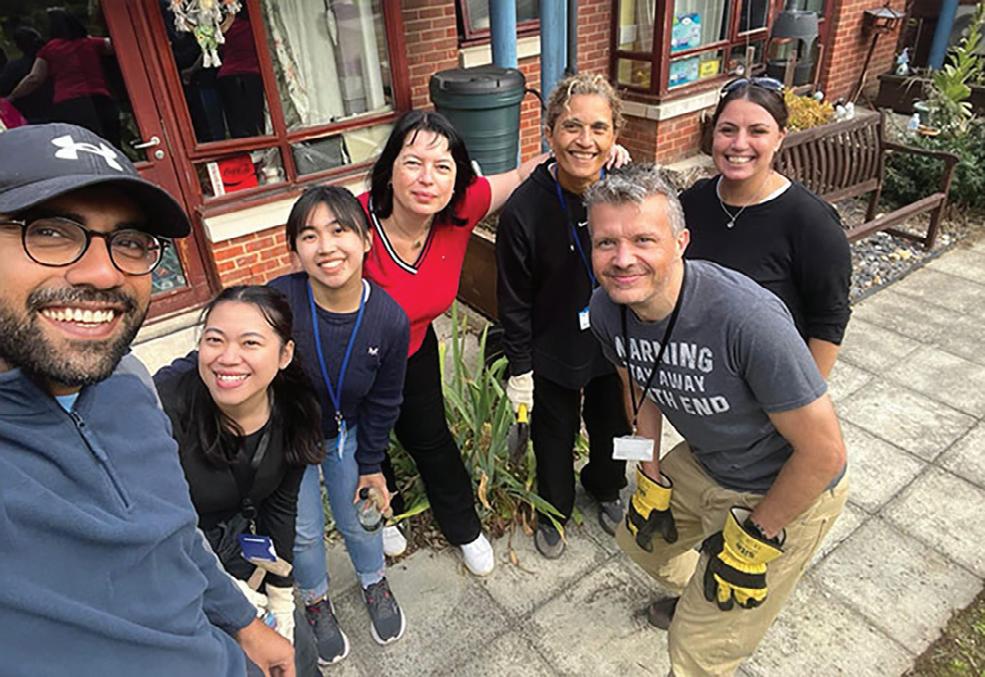
engaging art session. Watching residents create their incredible works of art proved to be one of the highlights of the day.
At Salutem, volunteering days such as this are seen as an invaluable opportunity for colleagues to connect with the people supported across the group, gain first-hand insight into the vital work carried out in services, and make a tangible difference.
These off-site experiences not only benefit the services through practical improvements but also help to strengthen relationships, boost morale, and reinforce the organisation’s shared sense of purpose.
Carolyn Symcox, finance director at Salutem Care and Education, said: “It was a fantastic experience to spend time at Birchwood and get involved in something so different from our usual day jobs.
The team was amazing, and it was inspiring to meet the individuals we support and see the wonderful work being done by the staff. We can’t wait to go back and see the gardens in full bloom next spring.”
Residents at an Ilkley home can visit places such as Scotland and the North York Moors without leaving their home thanks to a new train experience.
MHA Glen Rosa have installed the Jolly Journey Train Experience, a new initiative by Little Islands, who specialise in creating unique interactive environments.
The train experience showcases journeys across the UK from the viewpoint of a passenger looking out of the window.
The team from Little Islands installed and decorated a part of the home’s dementia unit and converted it into a train carriage with props such as suitcases, train times and journey information displays.
MHA Glen Rosa provides residential and residential dementia care for 47 residents.
Adam Carling, home manager said: “The Jolly Journey Train experience is a new initiative and one that is proving to be very popular here.
“We have received some great feedback since the experience has been installed.
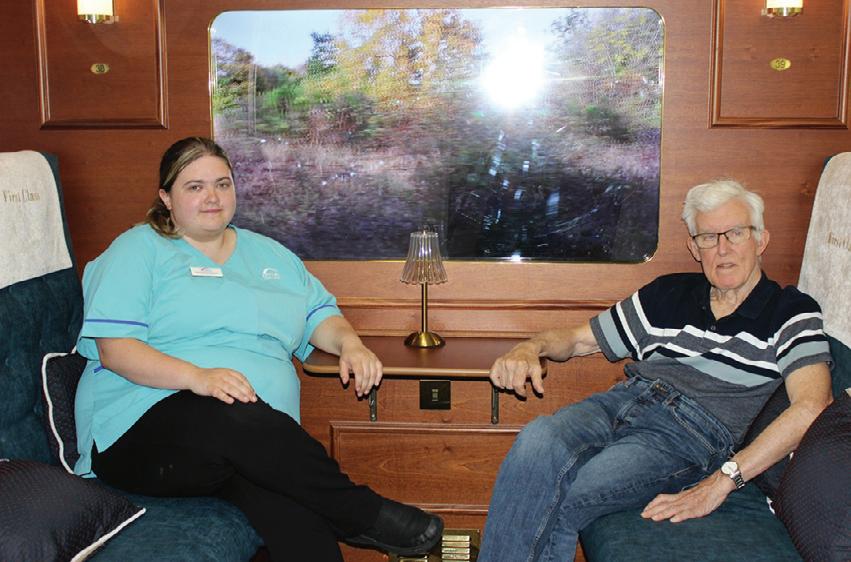
“Our residents love it, you will often see a number of them sat in the carriage and watching a journey.
“The idea came to me from my area who forwarded it to me, and I decided to look into it.
“I then contacted the team at Little Islands and the whole process took a couple of months from start to finish.
“We are quite privileged here at MHA Glen Rosa, where thanks to the generosity of the local community we are able to provide services such as this for our residents.
“We received a very generous donation via our Legacy Fund which enabled us to go for this experience.
“The location of the experience is really good as it’s in a high footfall area, where both residents and their relatives can sit and enjoy it.
“Alongside the Train Experience, we have also prepared a sensory garden thanks to funds we received.
“I do think this is something other MHA homes can look into having, it’s something quite unique and I do feel other homes will see the benefits just like we have.”
Experience,
Marie Curie, the UK’s leading end of life charity, has fired an urgent open letter directly at Secretary of State for Health and Social Care, Wes Streeting, warning that without immediate action, palliative care in England faces catastrophe.
With more than 5.75 million deaths projected in the next decade and more than 5 million people set to need palliative care, Marie Curie says the system risks being overwhelmed unless the UK Government takes bold steps now.
The charity lays out the crisis: There’s still no national plan to close the end of life care gap for those missing out, or to support a rising number of people with complex health conditions. Financial pressures are forcing services to slash provision just as demand surges; two in five hospice providers are bracing for even deeper cuts. “Completely unsustainable,” warns Marie Curie, demanding a radical overhaul and fair, sustainable funding at the heart of a new national plan.

Referencing recent parliamentary debates and broad consensus on the need for reform, the letter is clear: “Warm words won’t fix our broken system,” it tells Streeting, “we now need decisive action”. With the possibility of assisted dying legislation becoming law in the coming months, the call to the UK
government is urgent and clear—commit to a strong, comprehensive national delivery plan for palliative and end of life care, before it is too late.
Even with positive intentions in the 10 Year Health Plan, the facts are stark: people in their last year already account for one in six emergency admissions and nearly a third of all hospital bed days. “There is little chance of building an NHS fit for the future without a comprehensive plan to improve care for dying people,” the letter states, however.
Marie Curie calls for urgent national leadership from the UK government —guaranteeing high-quality palliative care for all, everywhere in England.
Matthew Reed, Chief Executive, said: “No one at the end of life should worry about getting the compassion and dignity they deserve. The government must deliver a plan so everyone, no matter where they live, has access to high-quality palliative care. For many, this means relief, precious time together, and avoiding needless trips to A&E. Too many families are still missing out. We cannot let people go unsupported at their most vulnerable. The government must act now and work with the charity sector to fix end of life care for good.”
Residents at Southgate Beaumont in Southgate celebrated World Opera Day, with a beautiful live performance from opera singer Harry Kersley.
A special afternoon was spent showcasing the timeless beauty and emotional power of Opera. This event provided a unique opportunity for residents to experience the drama and passion of live opera, evoking emotions and sparking memories.
Beatrice Godfrey, General Manager at Southgate Beaumont commented: “Our residents love to listen to all different kinds of music, and to discuss their favourite songs and singers, so World Opera Day was a fantastic excuse for us all to listen to this
wonderful style of music.”
Michael, a resident at the home, said: “Lots of people think opera is really stuffy but it is amazing how much opera music is part of everyday life, either as theme tunes or in ads on TV. People know far more opera music than they think they do –even if they’ve never been to see one!”
Our varied life enrichment programme keeps residents active, and provides a daily choice of engaging physical, mental and spiritual activities tailored to residents’ interests and abilities.



By Victoria Welsh, Partner and Head of Business Immigration at Taylor Rose

The UK Government’s decision to restrict sponsorship of frontline adult social care workers marks a major shift in immigration policy. In May 2025, the Immigration White Paper was published, which outlined reforms to the immigration framework to reduce net migration. At the same time, enforcement of right-to-work laws and scrutiny of sponsor licence compliance have increased with more rigorous checks on documentation and sector-specific audits.
As of July, some of those proposed reforms were implemented. New sponsorship rules require roles to be graded at the Regulated Qualifications Framework (RQF) level 6 - equivalent to graduate levelfor eligibility under the Skilled Worker route. These changes impact every business looking to hire or retain overseas workers. Foreign talent is an important resource for UK businesses, with over 136,000 organisations and institutions registered as licensed sponsors for work
and study. In particular, the Health & Care Worker visa is returning to pre-2022 rules with the removal of adult social care workers (SOC Codes 6135/6136 – considered RQF level 2) from the Immigration Salary List. After July 2028, it will not be possible to sponsor foreign workers in these jobs, and until then, only workers who are already in the UK can remain with or change their sponsors.
With hundreds of thousands of care workers sponsored since the introduction to the former Shortage Occupation List, care providers have relied heavily on this international workforce. Although somewhat circular, as immigration policy often is, the implications for care providers are nevertheless significant. The pipeline for new international recruits has been severely restricted. Providers can no longer access new care workers arriving from overseas. Thousands of international workers who arrived legally, many during a time of national crisis, now face uncertainty for their future. Care home providers should now be considering their staffing needs beyond July 2028, and how vacancies will be filled without sponsored workers in core roles.
There are a number of simultaneous developments for care home providers to consider. To offset the impact of reduced overseas recruitment, the UK Government is introducing a Fair Pay Agreement (FPA) for adult social care, currently in public consultation and expected to be in place by July 2028. This legally binding framework will establish minimum pay and conditions, negotiated by a national body representing employers and workers. While the FPA is a step toward long-overdue reform, its funding is limited. The initial £500 million commitment equates to a modest uplift in hourly pay, and local authorities warn that without full central funding, councils may face budget shortfalls. This could lead to reduced care eligibility or service cuts. It remains to be seen whether it will help to fill the recruitment gap after the tap of sponsored workers has been turned off.
Politically, we are already seeing a response to national policy from devolved Governments. The SNP has called on the UK Government to reverse its decision to close the route for international care workers in
Scotland, framing the issue as part of its broader independence agenda. It further looks to build on the existing International Recruitment Regional Fund scheme in England & Wales by making available £500,000 to support displaced sponsored care workers relocate to the Scottish public health sector. Presented as a pragmatic response to Westminster’s policy, the scheme reflects Scotland’s unique demographic and workforce needs.
At the same time, sponsor licence compliance has become a critical strategic concern, with the risk of Home Office compliance action or licence revocation a genuine threat to care businesses. Immigration compliance is no longer peripheral; it is central to business continuity and long-term sustainability. Robust HR systems, accurate records, regular staff training on right to work processes and sponsor compliance – aiming to be ‘audit-ready’ – is becoming standard practice. Immigration due diligence in the sector is often as essential as financial audits in mergers, acquisitions, or restructurings.
In the face of these sweeping reforms, the care sector stands at a crossroads. The legal, operational, and ethical challenges posed by closing sponsorship for international adult social care workers demand more than reactive measures. Compliance, recruitment, and strategic reimagining of how to attract, retain, and support the social care workforce must now be central to every provider’s operation. Those who adapt swiftly and responsibly will not only weather the immediate disruption but help shape a more resilient and equitable care system.
As the sector navigates this new terrain, collaboration between legal advisors, policymakers, and providers will be essential. Investing in domestic talent through apprenticeships, partnerships with local colleges, and clear career progression pathways to build sustainable recruitment pipelines. Through coordinated action and forward-thinking leadership, businesses can ensure that care services remain resilient, inclusive, and equipped to meet the needs of an ageing population in a return to a non-sponsored worker era.
Grace Donovan, whose mum Lisa Donovan is team leader at Sully Day Opportunities in Sully, Vale of Glamorgan, completed the Cardiff Half Marathon to raise money for additional sensory equipment for the service. Many of the individuals supported by Sully Day Opportunities were there on the day to cheer Grace on as she took on the 13.1-mile challenge through the streets of Cardiff.
Sully Day Opportunities, part of Salutem Care and Education, offers a wide range of social, educational and leisure activities for individuals with physical and/or learning disabilities. The service supports people to develop new skills, build confidence and form meaningful friendships within the community.
Lisa Donovan said: “I’m incredibly proud of Grace for taking on the half marathon and for choosing to raise money for Sully Day Opportunities. The peo-

ple we support will really benefit from the new sensory equipment, which will enhance their experience and wellbeing.”
Grace Donovan said: “Running the Cardiff Half Marathon was tough but so rewarding, especially knowing that the funds raised will go towards something that will make a real difference. Seeing everyone from Sully Day Opportunities cheering me on gave me such a boost.”
John Godden MBE, chief executive of Salutem Care and Education, said: “It’s fantastic to see the sense of community and commitment shown by both Grace and Lisa. Their efforts embody the spirit of Salutem, where we work together to enrich the lives of the individuals we support. Well done, Grace, on this brilliant achievement.”
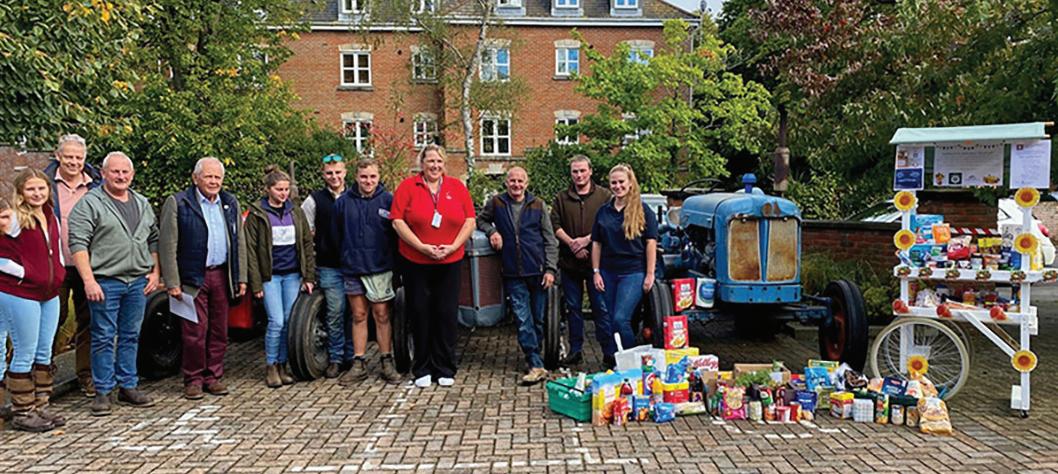
tractor myself and was quite happy in the company of the young farmers talking about tractors and restoration.”
The visit was organised in partnership with young farmers’ Secretary Izzy Bennett.
She was joined by community association representatives and David da Cunha, a Trustee of the New Forest Basics Bank, who spoke to Linden House residents and staff about its work, thanking all for their “kind and generous donations”. Linden House Companionship Team Leader Sian Harris said: “As ever, our residents, families and colleagues are proud to forge such community links and do our bit to help local causes.”

The National Care Association has responded to a recent The Daily Mail which lays bare the reality of serious failings in the health system which has a direct impact on the lives of real people needing care and attention.
The NHS spends approximately £2.6 billion annually on patients who remain in hospital beds despite being medically ready for discharge, with insufficient social care resources identified as the primary cause of these hold-ups, according to newly released official data.
NHS England has published its first calculations showing that discharge delays for medically cleared patients result in monthly expenses of roughly £220 million.
The organization estimates each unnecessary overnight hospital stay at £562, noting that nearly 391,000 patients remained in facilities beyond the point their physicians deemed medically appropriate during September.
Whilst the government continues to invest billions into a healthcare system struggling with structural challenges, it is failing to consider viable alternatives, according to industry representatives. They argue that
“10 Years Later, Still
investment in the social care system could provide a significant solution to the growing crisis.
In a statement, the National Care Association said it is “appalled” by the wastage of public funds outlined in recent reports, which it believes underestimate the true scale of the problem. With Local Authorities commissioning social care at approximately £800 per week, the organisation argues that utilising social care services would deliver substantial cost savings. “This really is not rocket science,” the Association stated.
The National Care Association has reiterated that the social care sector does have capacity across the country, but claims Local Authorities are not accessing it due to a complex funding framework of their own design. “Creating complex frameworks for the cheapest options has become an art for commissioners,” the organisation observed.
The Association also raised concerns that Continuing Healthcare Assessments are not being applied in the best interests of eligible individuals. It described the system as one where eligibility criteria are complex, opaque to the public, and applied inconsistently across the country.
Nadra Ahmed CBE, EC of National Care Association said: ‘Social Care remains the solution to ensuring that those who need care and can access it in a timely manner in their best interest. We cannot continue to pour money into a broken NHS systems led approach which continues to fail those who need care and support. The reality is our NHS colleagues should concentrate on acute care and funding should be made available through their budgets and government settlements to invest on the social care solutions.’
The deputy home manager at a Carterton home has marked 10 years working at the home and says she still looks forward to coming into work every day.
Verity Perkins started her journey with MHA The Homestead in 2015, working her way up from care assistant to senior carer and then deputy home manager.
It was a complete transformation in terms of career choice as prior to this she was a landlady at a village pub.
Verity found out about the home from a friend who worked there at the time and got the job on the same day she interviewed for the role.
To mark her service, home manager Pawel Wisniowski presented Verity with a bouquet of flowers and a card.
Speaking after the presentation she said: "Working in a care home was a transition
for me, as I had never worked in a care home before.
“Being a landlady of a pub, I managed to build a good rapport with the regulars, and a good amount of them were elder members of the community
“Initially it was a challenge, working with residents who had dementia was unfamiliar territory for me but I managed to get through the tough period at the start and then the rest is history.
“My journey at MHA The Homestead has been very rewarding and one that I am very proud of.
“I absolutely love my job, 10 years later, I still look forward to coming into work every day and I wouldn't change it for anything.”
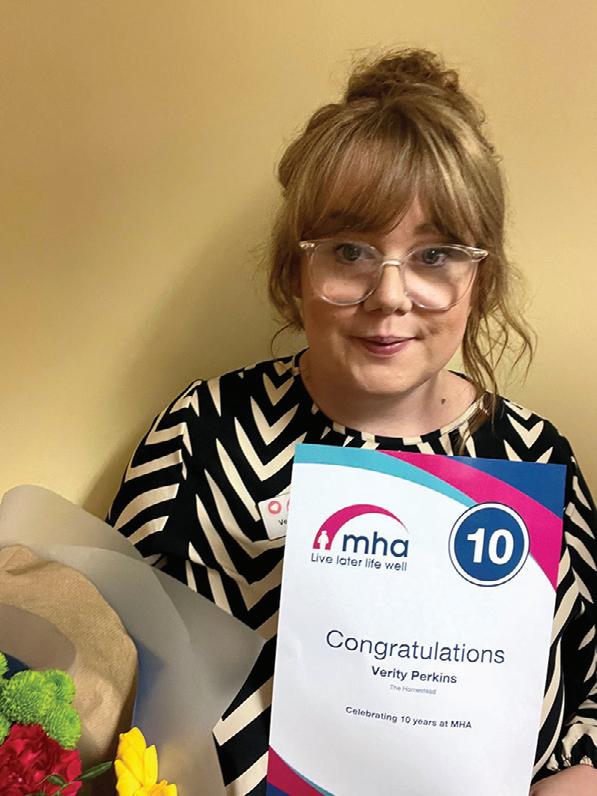
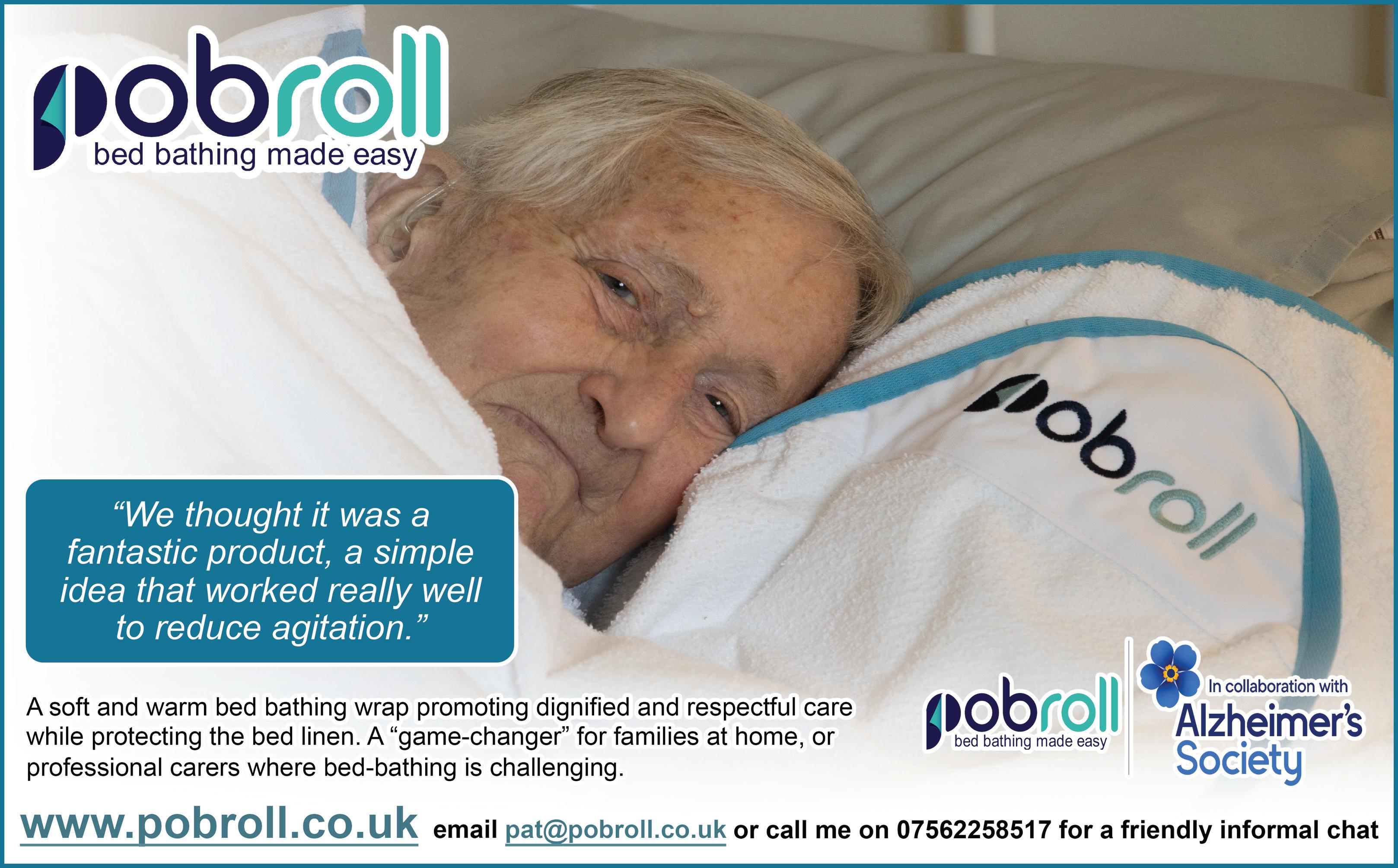
By Tony Smith BDS DPDS, Retired Dentist and Founder of care4teeth.org

Dental pain is one of the most common and distressing health problems — yet surprisingly, there are still very few accessible resources to help people understand and manage it. That’s why I began developing a series of videos and digital tools aimed at helping the public and carers recognise, prevent, and respond to common dental issues. FROM GUIDELINES TO GUIDANCE EVERYONE CAN USE
During the COVID pandemic, I used the Scottish Clinical Effectiveness Programme as a reference for managing dental pain remotely, alongside the American Dental Association’s (ADA) more recent guidance. These resources are thorough, but not easily accessible to the public — or to carers who often have to make quick decisions without dental support.
So, I started converting these professional guidelines into something simpler: a chatbot assistant that explains dental pain in plain English and directs users toward appropriate care. It’s still in development, but even in its early stages, it shows real promise for improving access to advice.
You can try an early version of this Dental Pain Assistant on my websites: www.care4teeth.org
www.dentalhealthservice.net
MAKING AI WORK FOR ORAL HEALTH
Learning about artificial intelligence (AI) has been both exciting and challenging. The potential is enormous — imagine a simple app that uses AI to assess your diet and predict your risk of tooth decay or diabetes, giving tailored preventive advice.
But for this kind of innovation to happen, it needs support from government and public health bodies, not commercial interests. Investment in AI-driven prevention would save money, reduce pain, and improve wellbeing — particularly in care homes.
PREVENTION IS BETTER (AND CHEAPER) THAN TREATMENT
Most of my work now focuses on prevention. It’s far more cost-effective and impactful to teach carers and dental care professionals how to maintain oral health than to treat preventable pain later.
My own motivation began around eight years ago, when my father became unwell. I wanted to help improve mouth care in care homes — something I couldn’t do for him directly, but could try to do for others. That’s when I began developing educational videos and online tools to make good oral care simpler and more widely available.
INNOVATION APPLIED TO CARE HOMES
I am also developing a care home assistant.
As with everything in this fast changing world we need to keep up-to-date. Most people prefer “how to” videos, rather than read text. And the way these assistants work means they can be changed and updated and ideally improve with feedback. To do this as an individual is extremely time-consuming, but if we all discuss our problems and potential solutions openly then we will help the well-being of residents and ourselves.
WHAT’S NEXT
On the Care4teeth website, you’ll now find resources for:
• Managing dental pain
• Supporting residents in care homes
• Preventing denture loss
• Training dental nurses in tele-dentistry
I continue to refine these materials — including animations, care videos, and interactive assistants — to make oral care more accessible, especially for older adults.
WHAT CAN YOU DO?
Sign the petition here on the care4teeth.org website.
We need to empower the whole dental team to be able to visit care homes and screen residents through the use of digital mouth cameras, scanners. Dentists to give advice remotely, and allow nurses to scan dentures before they are lost, and treat disease with varnish applications to stop disease in the mouth progressing to a surgical intervention.
This work is personal. It’s for people like my dad, and for every carer doing their best to help residents stay comfortable, healthy, and confident in their smile.
If you’d like to offer feedback, get involved, or share your own care experiences, please visit care4teeth.org. Together, we can make oral health care more compassionate, connected, and effective for everyone.
A care home in Cardiff has welcomed the local community to a very special art exhibition in aid of charity.
Care UK’s Llys Cyncoed, on Cyncoed Road, hosted the unveiling of botanical art produced by resident and award-winning artist Vivien Burgess.
The exhibition was launched on Friday 3rd October with a champagne and canape reception. Friends and family members had flown in especially for the occasion, and the home was full to bursting with the number of visitors who joined the event.
Guests had the opportunity to view and purchase 28 original pieces of Vivien’s work, displayed throughout the home’s library. Just over £2000 was raised during the exhibition, all of which will be donated to three charities chosen by Vivien which are Velindre Cancer Centre, Salvation Army and UNICEF, and Children in Gaza.
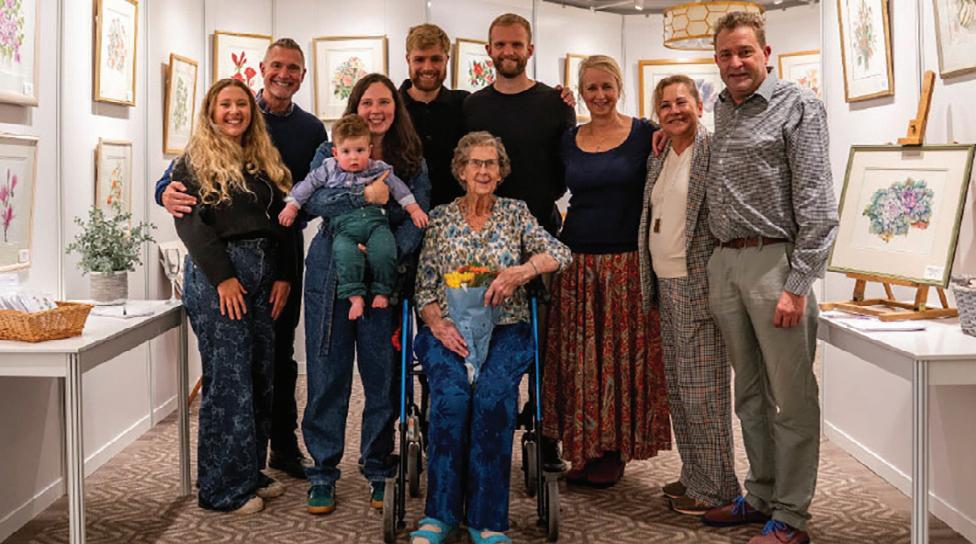
The exhibition runs until the end of October with other pieces of art available to purchase to support these charities.
Vivien’s art venture began in the 1980s, pressing flowers between the pages of old Yellow Pages and creating intricate collages. Her work caught the eye of luxury department store Liberty London, which
featured her pressed flower pictures in collections. As trends evolved, Vivien shifted to botanical painting, studying at Richmond College, West Dean College in Chichester and RHS Garden Wisley.
Her work, which has been displayed in many galleries, has won her multiple awards from the Society of Botanical Artists, Royal Horticultural Society and Ringwood Art Society. She also became a fellow member of the Society of Botanical Artists and a member of the Royal Miniature Society, Hilliard Society and Society of Limners.
Carley Hunt, Home Manager at Llys Cyncoed, said: “The art exhibition was a huge success.Vivien is incredibly talented and we were thrilled to be able to showcase her work to the local community.
“It was a truly beautiful day and so heartwarming to see the smile on Vivien’s face as everyone browsed her work. It is really important to us here at Llys Cyncoed to encourage residents to keep up their hobbies and passions and events like these are a great way to do that.
“I’d like to extend a huge thank you to everyone who attended and helped us to raise funds for her chosen charities”
HC-One’s Adelaide House Care Home in Walton-on-Thames, Surrey, was alive with laughter, cheers, and plenty of cake as residents and colleagues gathered to celebrate the 85th birthday on the 2nd October of one of their most cherished residents, Eric Shurmer.
Fondly known as the “Quiz Genius” of Adelaide House, Eric has become a cornerstone of community life. His passion for learning, razor-sharp memory, and quick wit make him a natural leader during the home’s much-loved quiz sessions. Whether the topic is history, geography, music, or the most obscure trivia, Eric’s encyclopaedic knowledge keeps everyone engaged and eager to rise to the challenge.
Ghody John Dano, Wellbeing Coordinator at HC-One’s Adelaide House Care Home, said: “Eric doesn’t just answer questions – he brings the whole room to life. He has a wonderful way of turning an ordinary activity into an extraordinary one, encouraging everyone to take part, laugh, and learn together. Happy 85th
birthday Eric!” The birthday celebration featured a beautifully decorated cake, balloons, and a special gathering where residents shared stories and tributes about Eric’s kindness, humour, and the friendly rivalry he brings to their regular quiz nights. Colleagues presented Eric with a personalised quiz booklet highlighting questions from his favourite categories – a nod to the countless games he has helped make so memorable.
Fellow residents described Eric as both an inspiration and a friend. “He makes you want to try harder, not just to win, but because he makes it fun,” one resident shared with a smile.
At 85, Eric continues to prove that age is no barrier to curiosity and camaraderie. His presence enriches the life of Adelaide House, reminding everyone that joy is found not only in knowledge, but in the friendships built around it.
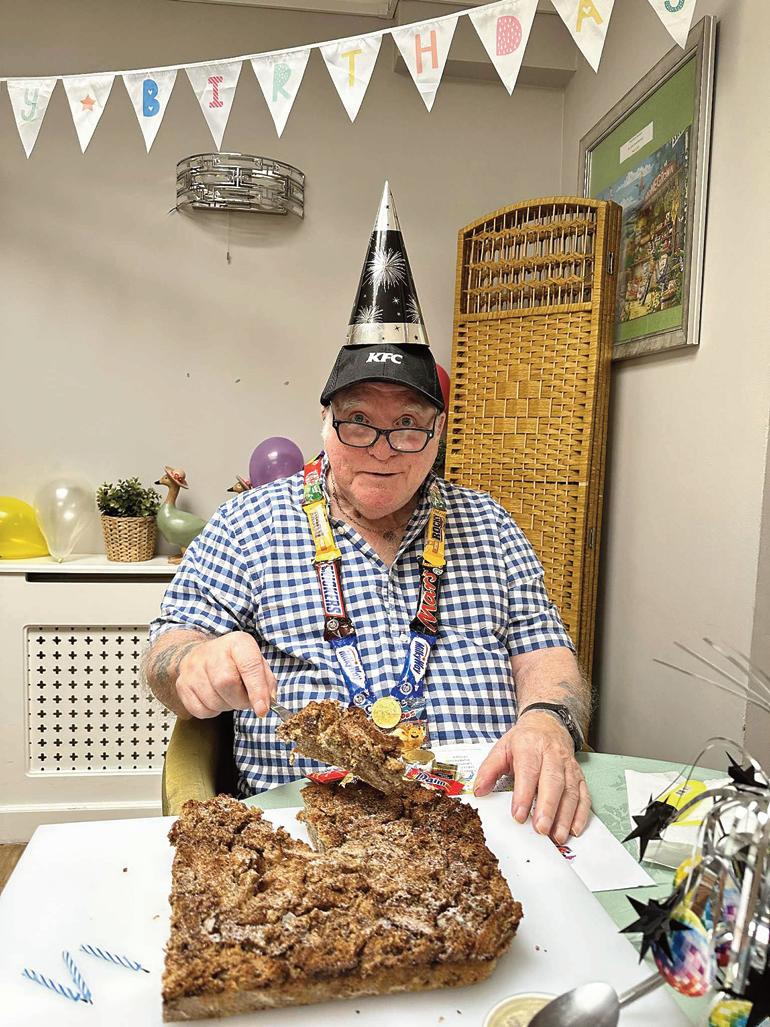
Skills for Care has launched a campaign highlighting the importance of integrated working across health and care services which is set to run through November and December
The ‘Integrated working and social care’ spotlight will explore what integrated working really means, why it matters, and how it’s shaping the future of care and support.
Integrated working brings together social care, health, housing, community organisations and other services to deliver better, more connected outcomes for people who draw on care and support.
When services work together, people only need to tell their story once, reducing duplication and gaps in support, focusing on what truly matters: people’s wellbeing and independence.
The ‘Integrated working and social care’ spotlight comes as the 10-year Health Plan shows the need for focus on preventative care and local services, with three key shifts in how services operate.
THESE ARE:
• moving more care from hospitals to communities
• making better use of technology in health and care
• focusing on preventing sickness, not just treating it.
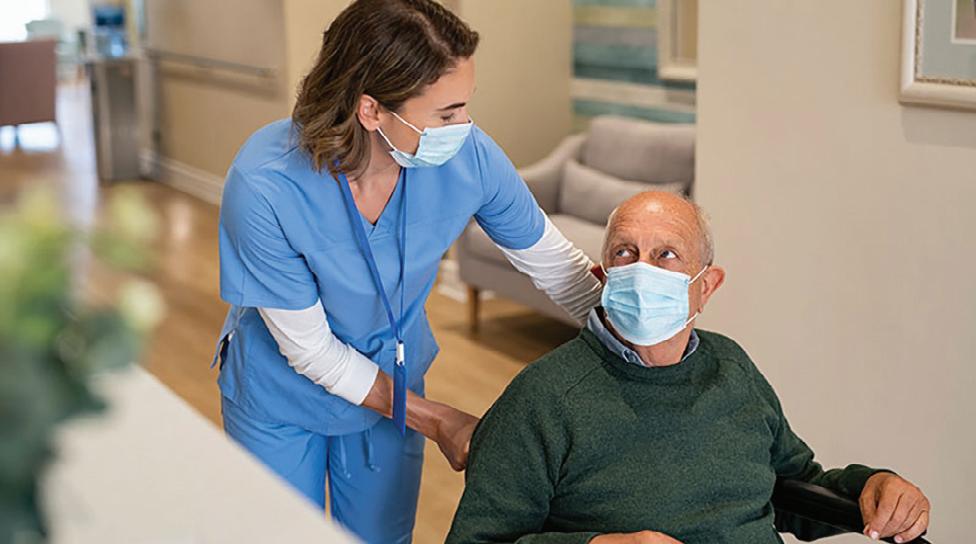
and care professionals to bring care and support closer to home.
Skills for Care is an advisory body on the integrated working agenda. They are working in every part of the country, helping to make sure the adult social care workforce is recognised and understood, and that the sector are connected to the development of integrated neighbourhood services.
Running across the Skills for Care website, social media and other communications channels, the ‘Integrated working and social care’ spotlight will help to raise awareness and knowledge of these current developments as well as looking more widely at what integrated working means and how it supports better outcomes – pointing to useful resources and showcasing examples of integrated working in action.
Oliver French, Head of National Engagement, Skills for Care, says: “I’m really pleased that we are shining our spotlight on integrated working in
the coming months, as this is such an important topic for everyone working across social care. It’s a really exciting time at the moment with developments such as the piloting of Neighbourhood Health Services.
“Integrated working is ultimately about providing more seamless, person-centred care for those who draw on support. It means people only having to tell their story once and less fragmentation across services. Our spotlight will help bring to life those real, tangible benefits.”
Neighbourhood Health Services will link up care providers, GPs, social workers, nurses and other health
Residents from Penwortham Grange and Lodge Care Home in Preston recently enjoyed a well-loved local tradition with a trip to see the Blackpool Illuminations – an evening filled with laughter, songs, and fond memories.
The group set off in the afternoon and made a stop for the essential seaside treat: fish and chips – enjoyed from the comfort of the minibus while overlooking the seafront. Although the weather wasn’t on their side, the views and atmosphere made up for it.

With glow sticks in hand, residents travelled through the Illuminations on the bus, admiring the vibrant light displays and the iconic Blackpool Tower, which sparked plenty of excitement.
Among the residents was Tommy, who smiled throughout and was often heard saying, “That is lovely,” as the lights passed by.
Leila, who also lives at the home, brought a burst of energy to the evening, leading a singalong of “I Do
Like to Be Beside the Seaside” and proudly spotting Blackpool Tower before anyone else. Joyce S was visibly delighted, while Kath J described the lights as “pretty, so clever and lovely.”
Jayne, Activities Coordinator, said: “This is the second year we’ve organised this trip, following great feedback from last year. For many of our residents, Blackpool holds treasured memories – holidays with family, visits with children and grandchildren, and days out by the sea. It’s a place that brings joy and sparks conversation.”
Lucy, Activities Coordinator, added: “Since joining the team in June, this has been a highlight for me. It was a reminder of how valuable these small trips can be for everyone present. We already can’t wait to take more of our people out to see the lights.”
Moments like these are an important part of life at Penwortham Grange and Lodge, creating opportunities for residents to relive happy memories and enjoy meaningful experiences beyond the home.
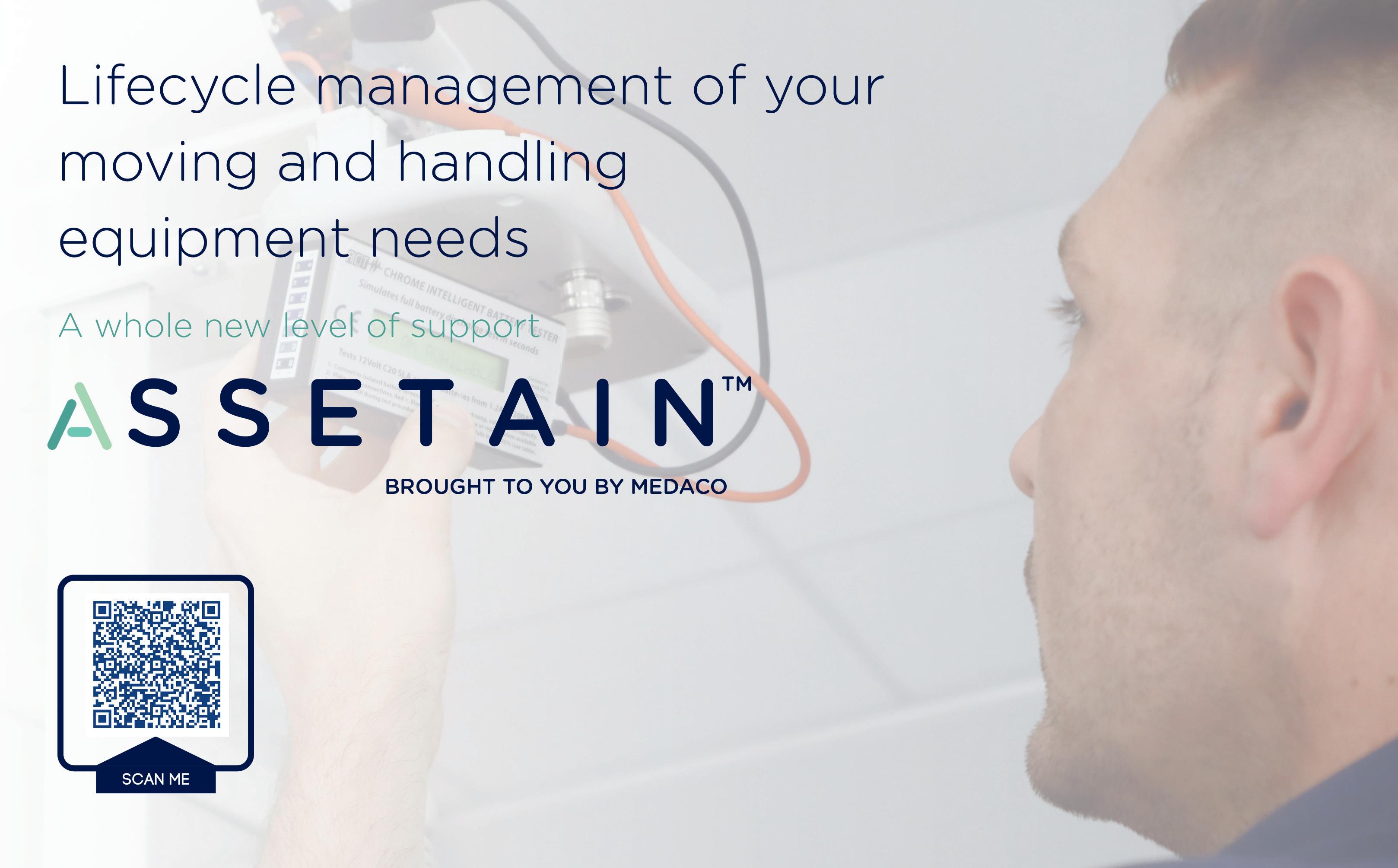
Running a domiciliary care business brings a unique set of pressures - balancing financial obligations with the responsibility of caring for vulnerable people. For many small providers, managing cash flow while meeting PAYE and VAT liabilities can become overwhelming. When arrears mount and enforcement action begins, the very survival of the business - and continuity of essential care services - can be placed at risk. This was precisely the situation faced by one long-established provider who found themselves confronting a £238,000 PAYE debt. Despite having secured new local council contracts, repeated attempts to negotiate a revised payment arrangement with HMRC had failed. The business owner faced the very real possibility of asset seizure under a Controlled Goods Agreement (CGA) and potential closure - a devastating prospect after eight years of dedicated service to the community.
WHEN NEGOTIATIONS BREAK DOWN
The care sector has been under sustained financial strain for years, with rising operating costs, staff shortages and delayed local authority payments all contributing to tight margins. In this environment, even a short-term disruption to income can quickly escalate into a serious debt problem.
In this particular case, the provider had previously defaulted on an existing Time To Pay (TTP) arrangement, leading to a loss of trust and the breakdown of future negotiations. Enforcement officers had already visited the business several times, intensifying the pressure on an already exhausted owner.
The existence of a Controlled Goods Agreement added another layer of complexity. Under such an arrangement, the debtor is allowed to retain seized goods on the condition that they continue making payments, but any default gives enforcement agents the power to remove and sell those assets. For a care provider dependent on vehicles, IT systems and care equipment, this could have been catastrophic.
THE TURNING POINT: BUILDING A COMMERCIAL
At the heart of resolving this situation was a shift in focus - moving away from pleading for leniency and towards demonstrating commercial viability. Rather than treating the debt as an isolated financial issue, the situation was reframed as a question of sustainability and public interest.
With specialist restructuring and negotiation support, the care business was able to present a detailed and evidence-based proposal to HMRC. This professional input proved critical in restoring confidence and reopening dialogue that had previously reached a stalemate.
A structured and transparent approach was taken:
Evidence-based proposals: Gathering robust documentation, including details of new contracts, projected cash flow and repayment capacity.
Commercial reasoning: Demonstrating that allowing the business to continue trading and repay the debt would achieve a better financial outcome for HMRC than forced liquidation.
Restoring trust: Presenting information clearly and proactively, which helped rebuild HMRC’s confidence in the business’s ability to meet its commitments.
By aligning the proposal with HMRC’s Litigation and Settlement Strategy, the case was reframed from a plea for relief into a commercially sound solution.
A SECOND CHANCE
Within weeks, the approach began to yield results. Enforcement action was suspended, and the

Controlled Goods Agreement was deactivated, removing the immediate threat of seizure. Soon after, a new 10-month Time To Pay arrangement was agreed, covering the full £238,000 liability.
This agreement provided the breathing space the business needed to stabilise operations, continue delivering care services and retain its workforce. Most importantly, it ensured that vulnerable service users did not experience any disruption to their support.
Reflecting on the outcome, Michael Withers, Debt Solutions Manager at Bell & Company (www.bellcomp.co.uk) said:
“What stood out most was the owner’s resilience. She’d been trying for months to get HMRC to listen, but trust had broken down. Once we could show the business’s longterm viability, the conversation changed completely. It became about finding a solution that worked for everyone.”
This case highlights a broader issue within social care: financial fragility. Many providers operate on minimal reserves, leaving little buffer for late payments or unexpected expenses. When HMRC becomes involved, matters can quickly escalate if communication breaks down.
Key lessons for care businesses include:

Early engagement is vital. Contacting HMRC or professional advisers at the first sign of difficulty can prevent enforcement action later.
Transparency builds trust. Providing full and accurate information, rather than withholding it out of fear, can make negotiations far more productive.
Commercial reasoning works. HMRC is ultimately motivated by the recovery of tax; showing how continued trading achieves this often carries more weight than emotional appeals.
For the care industry, financial resilience is not merely a business concern but a matter of social importance. Each time a provider fails, staff lose jobs and vulnerable patients lose trusted carers. In this case, professional intervention not only preserved an eight-year business but also safeguarded the continuity of vital community care.
There are lessons here for policymakers too. As councils continue to commission services under tight budgets, ensuring that payment structures support provider sustainability will be essential. Preventing financial crises in care businesses ultimately protects those who rely on them most.


• We specialise in the sale and purchase of quality used wheelchair accessible vehicles and ambulances.
• They can be bought as seen or refurbished and sign-written to your own requirements.
• Fully serviced, new mot & warranty
• Engineers inspection supplied if required.
•
•
•


that ‘Corridor Care’ and long A&E waits can have on
Charity says that it’s a crisis hiding in plain sight in our hospitals and that Ministers need to act urgently to tackle it.
And while long waits and corridor care in overly busy A&E departments and happen to people of all ages they are particularly likely to happen to older people, especially the oldest old, including some who are extremely ill or even dying the report says.
THE NEW REPORT SHOWS THAT:
• 1 in 3 (one third or 32%) of those aged 90 and older are waiting 12 hours or more in A&E to be admitted or discharged home in 2024/25.

• The number of instances of ‘corridor care’ of 12 hours or more has increased 525-fold since 2015/16.
• Between 2019/20 and 2024/25 the number of attendances to A&E that resulted in a 12-hour wait for a bed increased by nearly 2000%.
• Last year, 532,451 people experienced corridor care of 12 hours or more
Age UK said it has heard heartbreaking stories from older people who have had to face treatment, tests, and life-changing news without privacy and in unsafe conditions. Some have told us they have suffered the indignity of having to use bedpans in corridors, or of lying on the floor because the chair provided was too uncomfortable. Tragically, some older people die before making it to a ward.
A recent Age UK survey revealed that a third of Age UK supporters said they would be less likely to go to hospital because of the corridor care crisis, and 53% said that they would feel more anxious if they found themselves there.
RECENT POLLING OF UK PEOPLE AGED 65+ BY AGE UK REVEALED THAT:
• 89%, equivalent to 11.7 million older people, agreed that corridor care is undignified and unsafe, particularly for older people.
• 79%, equivalent to 10.4 million older people, agreed that patients should never be cared for in corridors under any circumstances.
STAFFING
Long A&E waits and corridor care affect staff too. The Royal College of Nursing’s (RCN) 2025 ‘On the Frontline of the UK’s Corridor Care Crisis’ report, surveying nursing staff across the UK, found that Corridor Care is a significant feature of many staff’s daily experience: two thirds (67%) of the respondents said that they deliver care in an inappropriate setting every day. This is affecting their ability to care for people and is leaving them demoralised and distressed.
Among the A&E nurses who responded to the RCN’s survey, 91% said that patient care and safety is being compromised.
The problem the report highlights usually stems in large part from the hospital’s inability to process people quickly once they’re through the door. On any given day, there are 13,000 people medically fit for discharge stuck in hospitals in our country, almost all of them aged 65 plus.
THESE DELAYED DISCHARGES CAN HAPPEN FOR A NUMBER OF DIFFERENT REASONS, AND THE FOLLOWING AREAS NEED TO BE ADDRESSED TO SPEED UP THE FLOW IN HOSPITALS:
• Poor organisation and co-ordination of functions and activities within the hospital
• A lack of social care and other forms of support in the community
• Delays in accessing community health services such as District Nurses and Occupational Therapists.
Caroline Abrahams CBE, Age UK Charity Director, said: “What’s happening to some very ill older people when they come to A&E is a crisis hiding in plain sight which the Government must face up to and take immediate action to resolve. No one should have to spend their final days in a hospital corridor where it’s
impossible for the staff to provide good, compassionate care, and it’s truly shocking that this is what is happening to some very old people in some hospitals, today and every day. And as we head into winter, we fear that an already very difficult situation in and around some A&Es will get even worse.
“Many of the stories we have heard from older people and their families are heart-breaking and, to make it worse, the older you are, the more likely you are it seems to endure a lengthy and often uncomfortable wait. Corridor care and long A& E waits are like a rot eating away the heart of the NHS, undermining public trust and destroying the ability of committed hospital staff to be able to take pride in a job well done. As a result, we fear that poor quality care in and around some A&E departments is now almost expected –a truly dire situation we must act urgently to turn around.
“The good news is that these problems can be tackled and solved – some hospitals have the problem of long waits and corridor care under control. There’s a lot that hospitals themselves can do to improve the situation in their A&Es, but what’s most needed now is for Government to step up, show determined leadership and use all the levers at its disposal – including targets, inspection and funding – to bring this crisis, which is disproportionately hurting our oldest old, to an end.”
To restore a sense of decency, and to give older people the dignity and respect they deserve, Age UK calls for the Government to implement a package of measures now:
• Urgently produce a funded operational plan to reduce the incidence of long A&E waits and end Corridor Care, with specific deadlines and milestones.
• Establish a robust system to collect and publish regular data on corridor care (as well as long A&E waits), and their impacts on the public, including by age and ethnicity.
• Appoint a Minister in the Department of Health and Social Care to be accountable for reducing long A&E waits and ending corridor care and require them to report on progress to Parliament every six months.
• Turbo-charge a peer learning programme for hospitals and local health organisations (Integrated Care Boards) to share proven solutions, tackle barriers to discharge and protect and support NHS staff.
• Work at pace to implement the 10 Year Health Plan, especially the ‘hospital to home’ shift and creation of a Neighbourhood Health Service, ensuring social care and the VCSFE are fully played in – so fewer older people need to come to A&E in the first place.



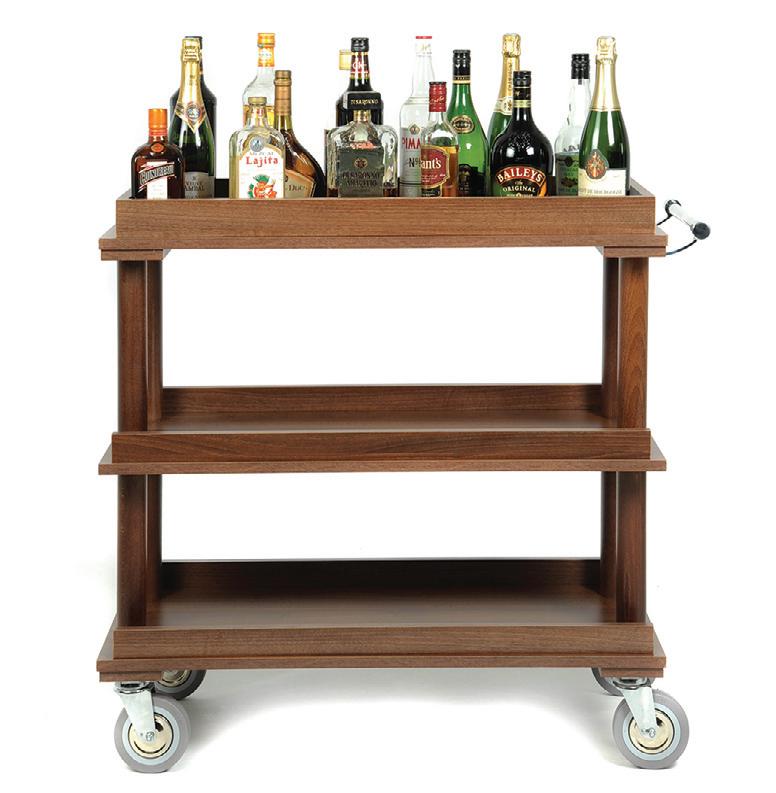
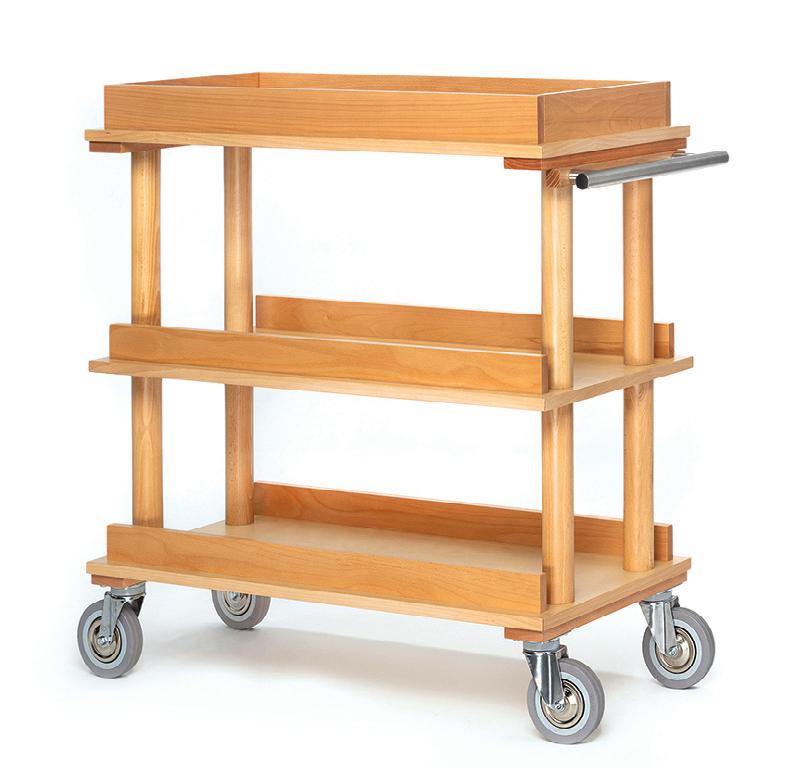
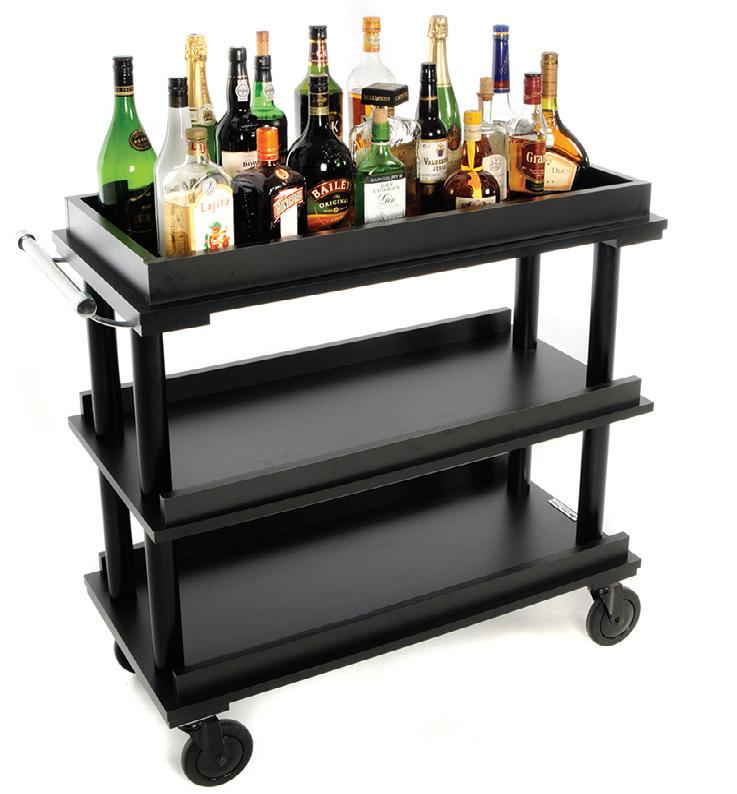
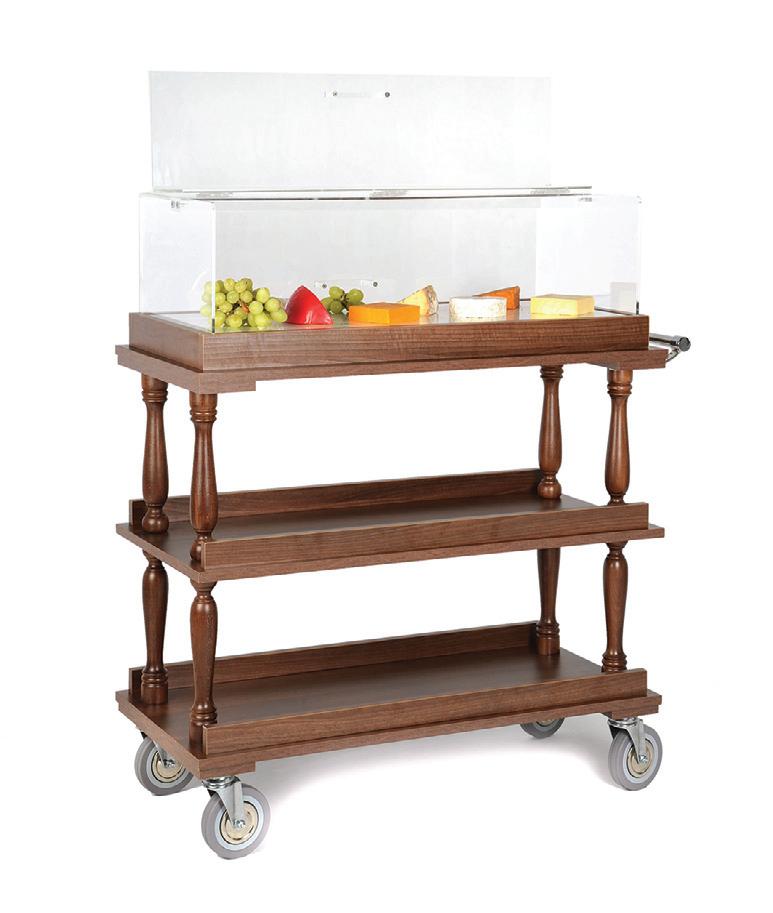
NHS Providers and the NHS Confederation have today confirmed plans to merge, paving the way for a new organisation to represent frontline NHS organisations across the healthcare system from April 2026.
The two organisations have conducted significant engagement with members – spanning NHS trusts, integrated care boards, primary care providers, and voluntary sector providers – with the clear view that a single membership body for the NHS should be established. Eighty-five per cent of almost 400 chairs, chief executives and other members in executive-level positions surveyed expressed this view; only five per cent disagreed.
The Boards of Trustees of NHS Providers and the NHS Confederation have agreed the decision to merge, subject to there being no material issues emerging from the due diligence. This confirms plans for a single membership body to represent NHS organisations across England, Wales and Northern Ireland more effectively. Its purpose will be to improve the NHS and the health of the people of the UK as the independent membership body providing an influential voice for NHS leaders and supporting its members to drive improvement.
A new membership offer will be launched in March 2026 and will start from 1 April.
In the meantime, a transition committee drawing from trustees across both current boards will be set up before a final board is established. A new leadership and staffing structure will be in place by the end of March 2026, including an external recruitment process for the new chief executive. These steps will ensure the new organisation is fully equipped to represent its members in its new form from April 2026. A review of brand identity to reflect the new organisation is also underway.
Lord Victor Adebowale, chair of NHS Confederation and Professor Sir Terence Stephenson, chair of NHS Providers, said: “Our members have told us loud and clear they want one clear voice for the NHS to represent and support them to improve care on behalf of their local communities. Coming together into a single membership body will enable us to do that more effectively.
“This is a very challenging time for the NHS and our members. We believe this step will enable us to better represent and support the entire NHS – to foster collaboration and support learning between all parts of the system to deliver higher quality care and better value for patients, the public and taxpayers.
“We will now work at pace to deliver the renewed organisation that our members have asked for.”
A leading all-inclusive care group has unveiled a first-of-its-kind personalised gin, called Golden Hour, a bespoke gin crafted with and for its residents.
Residents of Berkley Care Group played the leading role in designing the gin, from selecting flavour profiles to shaping its name and story. Supported by the group, their choices guided the process, resulting in the first time a UK care home group has launched its own bespoke spirit, bringing together tradition, taste, and a strong sense of community.
The gin takes its name from the “Golden Hour” at Fernhill House, one of Berkley’s twelve homes, where residents gather every Thursday evening to share a drink together. That weekly ritual of connection and laughter is now being extended across all Berkley homes, united by their very own gin. image003.jpg
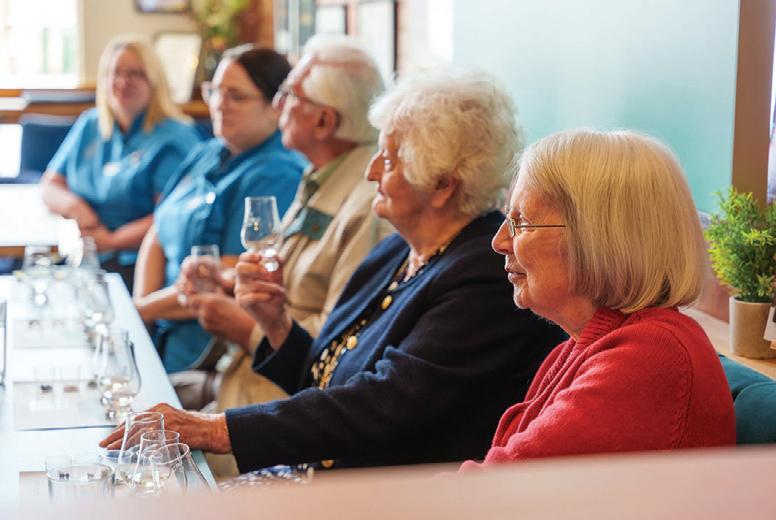
The final creation, Golden Hour, is a London Dry gin described as “floral, aromatic, and characterful,” perfectly suited to a classic gin and tonic. For residents, the project represents far more than a drink, it is a
celebration of shared tastes, ownership, and togetherness.
With Golden Hour now being launched across all twelve Berkley Care Group homes, residents and families can enjoy a gin inspired by the people, traditions, and shared moments that make life at Berkley unique.
Speaking about the partnership, Laura Perry, CEO of Berkley Care Group, added:
“At Berkley Care Group, we’re always looking for ways to enrich daily life, and this project has sparked creativity, conversation, and connection. Golden Hour is more than just a drink; it’s a celebration of our residents’ tastes, stories, and the moments we share together.”
Highlighting the importance of the initiative, Kat Clayton, Sales and Marketing Director at Berkley Care Group, said:
“ Golden Hour has taken residents’ love of a classic drink to a new level. It embodies the spirit of our homes and captures the warmth and character of the people who live in them. We are immensely proud to have brought this initiative to life.”

How technology-driven engagement is boosting morale, staff retention, and wellbeing in UK care homes.
In today’s social care environment, the pressures on providers have never been greater. Rising costs, recruitment uncertainty, and increasing expectations from families and the CQC are leaving many care homes stretched thin. Yet, amid these challenges, one innovation is quietly reshaping daily life for both staff and residents - the Mobii Interactive Projection System from OM Interactive.
Drawing on OM Interactive’s 2025 Nationwide Survey of care professionals, The Mobii in Care: Executive Insights 2025 reveals powerful evidence that interactive technology can do more than engage - it can rebuild morale, reduce workload, and help care teams deliver the quality of care they aspire to.
LIFTING MORALE AND STAFF RETENTION ACROSS CARE TEAMS
Care work is among the most rewarding professions, but it is also one of the most emotionally demanding. Many care teams report that introducing the Mobii has brought back a sense of joy, pride, and connection to their daily work.
“Staff feel able to offer a more meaningful experience for service users,” says Marion Hunt, Advanced OT/Sensory Lead at The Hatherton Centre, MPFT.
That feeling matters - because it directly supports staff retention and resilience. When staff see residents light up with engagement, they’re reminded why they chose care in the first place.
Most managers surveyed said the Mobii has made a positive difference to staff workload, reducing stress and freeing up time to focus on genuine interaction. “It’s very easy to set up and use, which frees up the team’s time to spend more time engaging in a group activity,” shares Celia Milton, Activity Champion at Anchor’s Limegrove Care Home.
For carers, it’s not just about having a new tool - it’s about having something that makes their day feel easier, more purposeful, and more connected.
ENHANCING WELLBEING FOR RESIDENTS AND STAFF
The impact on residents is equally remarkable. An overwhelming 90% of care homes said the Mobii has enhanced wellbeing and engagement for both residents and staff. Through light, sound, and movement, it brings interactive experiences directly onto any surface - sparking laughter, movement, and conversation.
“The residents who would seem lethargic and unalert would be revived when the therapeutic games are played,” explains Carolyn Weisey, Activities Coordinator at St Annes Care Home.
Even residents living with advanced dementia have shown renewed participation. “Increased participation, especially from our residents living with more advanced dementia,” adds Celia Milton.
For many homes, this shared experience creates a calmer, happier environment - one where relationships thrive, and residents and carers alike feel more connected.
In a sector where inspections and accountability are central, the Mobii also provides measurable support for achieving CQC excellence. Homes using the Mobii report improved outcomes within the “Caring” and “Responsive” categories - both areas where person-centred engagement is critical.
“It can be used for person-centred activities as there is something to suit all needs - and CQC love that,” says Colette Yuksel, Activities Coordinator at Stocks Hall Nursing Home Burscough.
This ability to provide inclusive, evidence-based engagement demonstrates a home’s commitment to meaningful care - something inspectors, families, and staff all value highly.
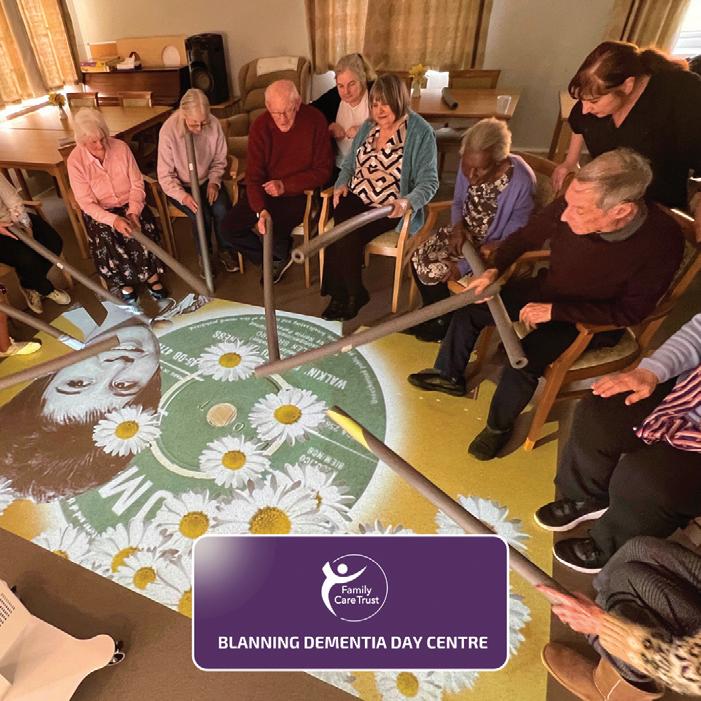
With the upcoming Immigration Bill expected to limit access to overseas care workers, providers across the UK face mounting pressure to retain and support their teams. Recruitment challenges, rising agency costs, and burnout are creating a perfect storm - one that demands creative, proactive solutions.
The Mobii offers exactly that. It simplifies activity planning, empowers staff to deliver more meaningful sessions, and helps build a workplace culture centred on pride, teamwork, and connection.
As Katherine Huntley, Activities Lead at Dewdown House, puts it:
“Staff love playing with this alongside the residents - it really helps with bonding.”
Real-World Results from UK Care Providers
The survey findings speak for themselves:
94% said the Mobii enables more quality time with residents.
89% saw improved mood and interaction.
81% reported enhanced wellbeing and engagement.
90% saw improved memory recall.
• 93% would recommend the Mobii to other care providers.
These numbers reflect what many care professionals already see every day - a calmer, happier, more connected environment where both residents and carers can thrive.
As social care continues to evolve, the most successful innovations will be those that combine practicality with compassion. The Mobii proves that technology doesn’t have to replace the human touch - it can enhance it, helping carers do what they do best: connect, comfort, and care.
For care providers looking to strengthen staff wellbeing, enrich residents’ lives, and demonstrate excellence to the CQC, the question isn’t whether they can afford to invest in engagement technology.
It’s whether they can afford not to. For more
or
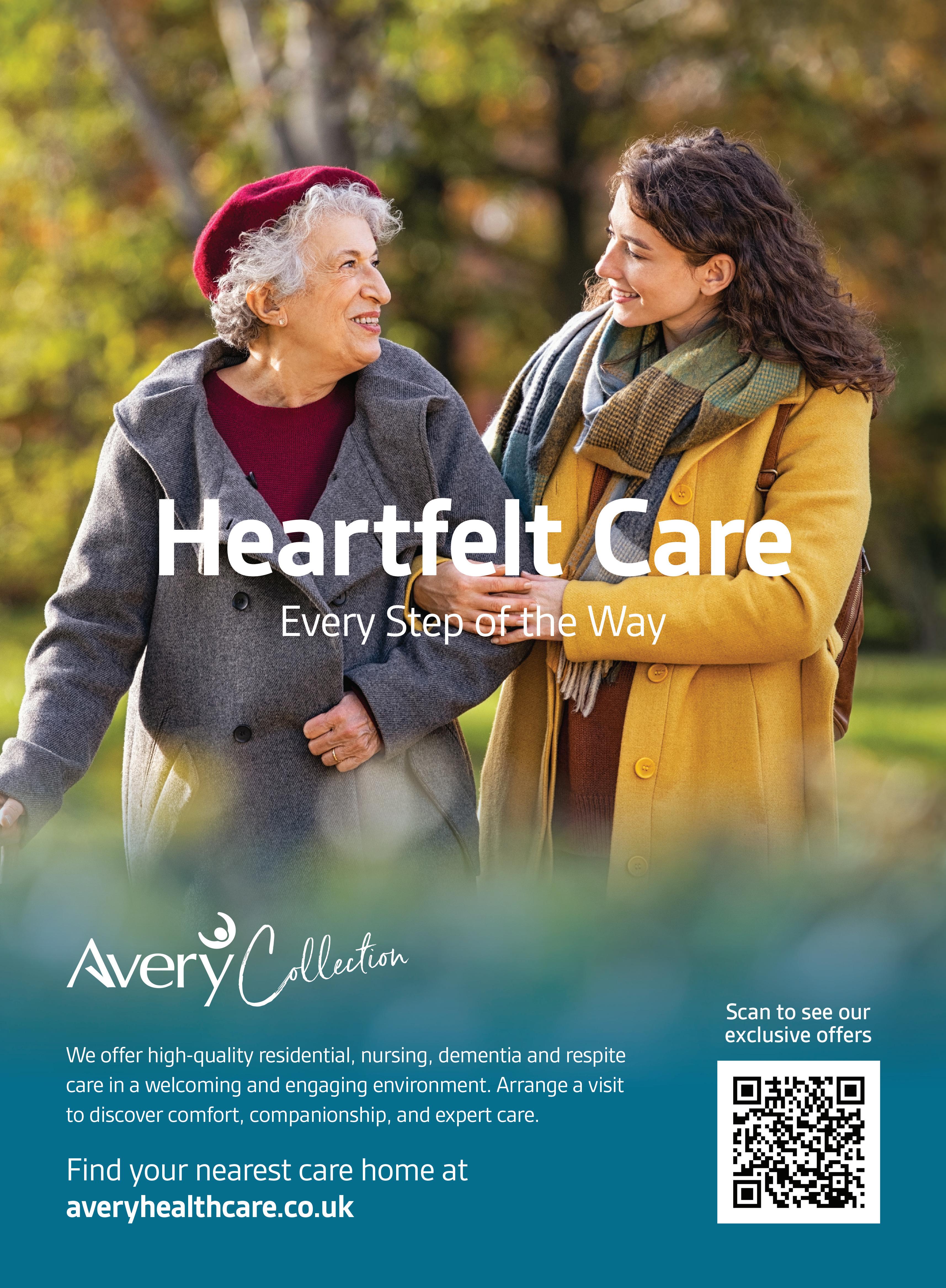
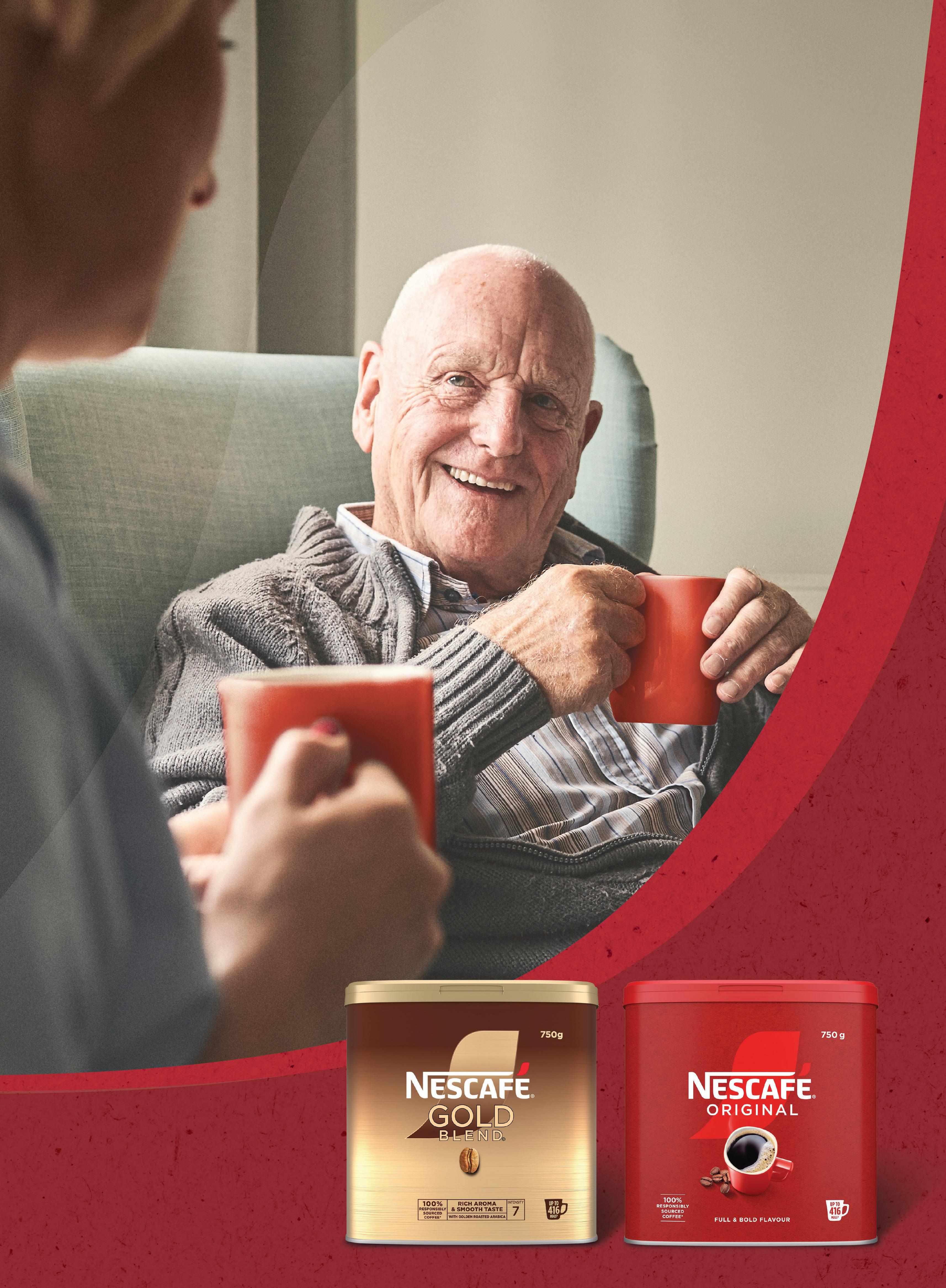

Jason, a resident at Duckyls Farm, a specialist care home for adults with learning disabilities operated by the charity Diagrama Foundation, recently fulfilled a longheld dream: embarking on a spiritual pilgrimage to Medjugorje, a world-renowned Marian shrine in Bosnia and Herzegovina.
The eight-day trip was Jason’s first international holiday in many years, made possible through the person-centred support approach at Duckyls Farm. Jason, who is Catholic and was confirmed at Worth Abbey in 2018, was given the opportunity to choose between several pilgrimages, ultimately selecting Medjugorje after being captivated by images and the story behind the shrine.
“Jason really enjoyed his pilgrimage to Walsingham last year,” said Chris Carroll, Development Worker at Duckyls Farm, who accompanied Jason on the trip. “When he saw Medjugorje and learned about its significance, he lit up. He chose it himself from a number of suggestions we made and really looked forward to it for months.”
The pilgrimage was organised by Discover Medjugorje, a travel group known for creating inclusive holiday experiences for people of all abilities and faith backgrounds.
The journey began with a flight from Gatwick to Split, Croatia, followed by a coach to Medjugorje. For Jason, just boarding a plane again was an exciting adventure. But the highlights didn’t stop there.
“Jason was embraced by the group immediately,” said Chris. “Every morning at breakfast, people would seek him out just to say good morning. He’s got a fun-loving personality that people gravitate toward. He loved being part of the group.”
Jason immersed himself in the spiritual life of Medjugorje, attending daily Mass and staying for the full duration of long services, something many pilgrims don’t

do. He visited churches, historical sites, and even purchased rosaries for his housemates and staff at Duckyls Farm. His favourite stop was the Cenacolo Community, where he met recovering addicts who shared stories of transformation through faith.
“He was really touched by their joy and humour,” Chris added. “Jason connected especially with one former addict who had been a talented basketball player, one of Jason’s favourite sports.”
Back at Duckyls Farm, Jason was eager to share stories and photos with his housemates, inspiring them to consider their own future holiday dreams. His trip was more than just a holiday it was a celebration of faith, independence, and personal growth.
“This experience reflects everything we stand for at Diagrama Foundation and Duckyls Farm,” said Karen Tolton, Registered Manager, Duckyls Farm. “We believe in enabling people to live their best lives, supporting them as individuals, and respecting their passions and beliefs. Jason’s pilgrimage shows what’s possible when care is truly person-centred.”
Jason’s journey to Medjugorje is just one example of how Diagrama Foundation’s tailored support helps residents live fulfilling, enriched lives. Whether performing in theatre, coaching movement workshops, or travelling abroad, Jason continues to shine.
As one family member said at a recent Duckyls BBQ, “Jason just seems to be really enjoying his life right now.”
For more information about Duckyls Farm and Diagrama Foundation’s services, please visit: www.diagramafoundation.org.uk
If you’d like to support the residents at Duckyls Farm, you can help by purchasing an item from their Amazon Wishlist: https://linktr.ee/diagramaamazonwishlist. Every contribution, big or small, helps enhance the daily lives of the people we support.
Eastbourne’s newest care home, Alice Court, has marked a major milestone with a celebratory topping out ceremony, signalling the completion of construction for the state-of-the-art residential, dementia and respite care home.
The Mayor of Eastbourne joined the team to commemorate the occasion, helping to plant a locally sourced crab apple tree in the home’s landscaped gardens. The symbolic gesture reflects the growth and future of Alice Court as a vibrant part of the local community.
Set to welcome residents from Monday, 3rd November, Alice Court offers 70 en-suite bedrooms, creating a welcoming environment where people feel
truly at home. Michelle Love-Patel, General Manager at Alice Court, shared her pride in the day’s celebrations, “Today marks a huge milestone for Alice Court. We are planting a tree to symbolise the completion of our building and to recognise the dedication of everyone involved in creating this beautiful space. It is an honour to have Madam Mayor with us as we prepare to open our doors and welcome our first residents.”
The Mayor of Eastbourne added, “The home has wonderful views across Eastbourne and is well thought out, with beautifully designed rooms. I look forward to being invited again to future events.”
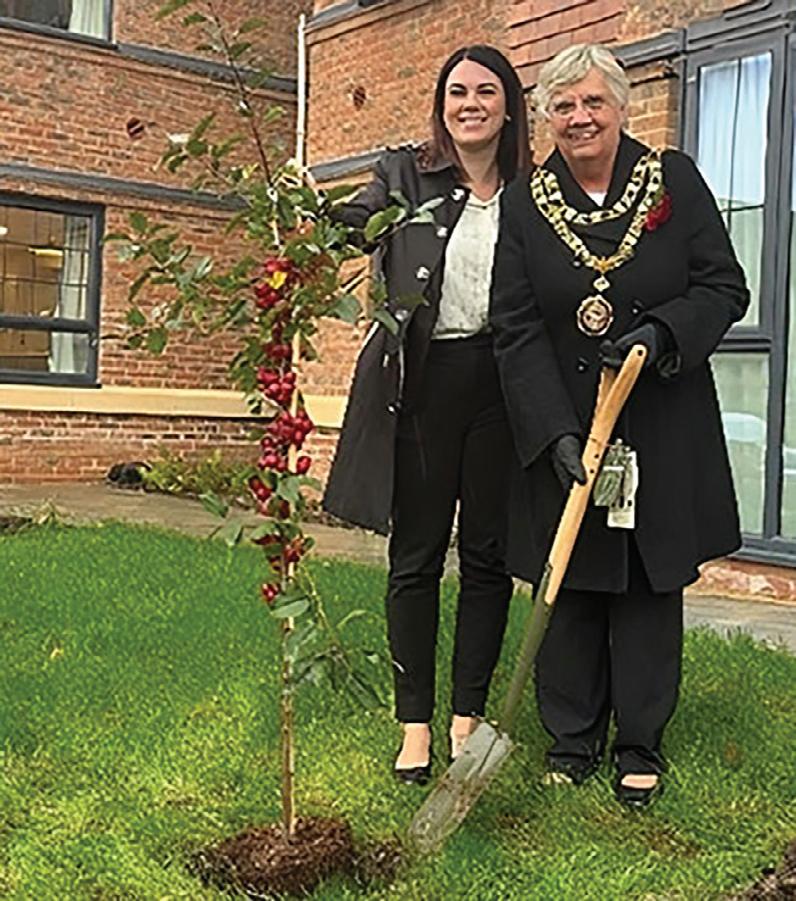
A group of volunteers who spend their time at a Croydon home arranged a coffee morning to raise funds and managed to accumulate more than £450
Volunteers from MHA Hall Grange set up a coffee morning in the home communal area and set up various stalls and fundraising activities such as a raffle and tombola.
There were plenty of sweet treats on offer thanks to a homemade cake stall, which was a big win with everyone.
More than 80 people including residents, their loved ones and members of the community were present and so far they have managed to raise £495.30 with donations still coming in.
The funds raised will go towards the homes amenities fund, and once the full amount is received, a volunteers meeting will determine where and how to use the amount.
MHA Hall Grange offers residential and dementia care for up to 86 older people.

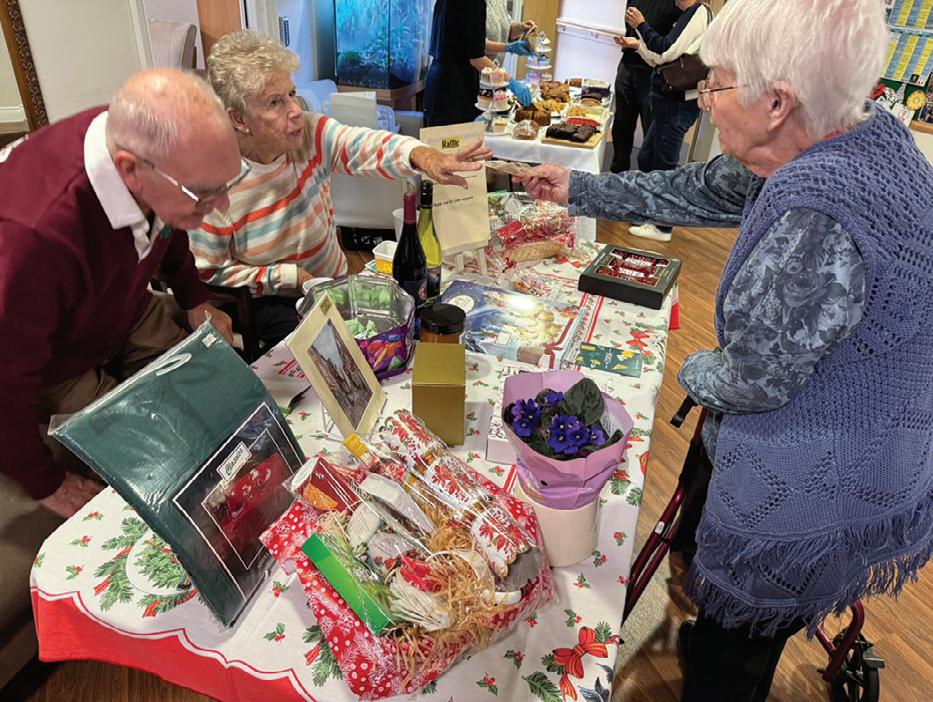
Gemma Watson, activities coordinator at the home said: “It was a fantastic effort by our wonderful volunteers who set up and planned the coffee morning.
“To raise the amount, they did in just over two hours is a fantastic achievement, and we are still waiting on some donations.
“It was lovely to see so many people come to the home and it was great to see them walking around and taking everything in.
“There were plenty of stalls to keep guests busy and some managed to bag some great bargains.
“Our residents really enjoyed the morning, and we received some lovely feedback from their loved ones.
“The volunteers will have a meeting once all the donations have come in and we will decide what it is they want to do with the amount raised
“On behalf of everyone at the home we want to thank everyone who supported the coffee morning and especially to our volunteers as without them none of this would have been possible.”
Two prominent regional leaders have joined a nationwide campaign advocating for improved wages within the adult social care sector.
Andy Burnham and Kim McGuinness have signed an open letter to the Health Secretary requesting assurances that care workers receive compensation in line with the independently calculated living wage rate. This voluntary benchmark currently stands at £13.45 per hour nationally and £14.80 in the capital.
Whilst care workers in Scotland and Wales already benefit from this wage level, many employees in England’s care sector do not. The Health Secretary recently announced a £500 million package to increase care worker salaries from 2028, however the regional leaders have expressed concern that delaying improvements could worsen existing workforce challenges.
Research from a leading policy think tank indicated that approximately 400,000 care workers in England—representing 43% of the workforce—received less than the voluntary living wage rate.

The correspondence, coordinated by two prominent campaign organisations, emphasises the vital role played by care workers and suggests that better remuneration could address recruitment difficulties, improve staff retention, and ease pressure on health services.
The regional leaders stated in their correspondence: “Raising wages for over 400,000 care workers would strengthen workforce stability and alleviate strain on health services.”
Although new employment legislation will establish mechanisms for negotiated pay agreements, these provisions may not come into effect until 2028.
The regional leaders contend that immediate action is necessary, citing analysis suggesting that implementing the voluntary living wage rate would require £330 million—under 2% of the previous year’s social care expenditure.
The letter also requests that compensation should cover all working hours, including overnight duties and travel time between appointments.
The letter can be seen here -https://citizensuk.contentfiles.net/ media/documents/real_LW_for_Social_Care_Letter.pdf
ADULT SOCIAL CARE NURSE PRESCRIBING PILOT LAUNCHED
Can we take pic from here if not something similar https://socialcare.blog.gov.uk/2025/10/16/adultsocial-care-nurse-prescribing-pilot/
DHSC has made £461,000 available for the Adult Social Care (ASC) Nurse Prescribing Pilot, to fund nurses across the country to undertake an Nursing and Midwifery Council (NCM) approved prescribing qualification. This will qualify them to prescribe medicines within their ASC setting and provide nurses with credits
towards the advanced practice Masters.
Following an Expression of Interest process, we have selected the following 6 Integrated Care Boards (ICBs) to take part in this pilot:
• Bedfordshire, Luton, Milton Keynes
• Cheshire and Merseyside in collaboration with Greater Manchester, Lancashire and South Cumbria
• Coventry and Warwickshire
• Leicester, Leicestershire and Rutland
• Nottingham and Nottinghamshire in collaboration with Derby and Derbyshire
• South Yorkshire
Upskilling nurses in ASC is fundamental to improving practice, achieving better outcomes for the people we support and reducing avoidable hospital admissions. I am delighted that we received a fantastic response from ICBs to take part in the Pilot. The calibre of applications was outstanding, and I am very much looking forward to working closely with the six ICB Chief Nurses to help make this pilot a success.
Throughout the pilot, we will be measuring the impact of increasing the number of nurses with prescribing qualifications on the sector and whether this leads to improved outcomes for those being cared for, supports safe discharge, and contributes towards addressing capacity issues, by freeing up clinicians’ time and streamlining care delivery.
This initiative marks an important milestone on the journey towards advanced practice in social care nursing. It aligns with the NMC work on Advance Practice and the work of the Queen’s Institute of Community Nursing on standards for social care nursing.
This pilot follows Skills for Care’s undergraduate placement strategy for social care nursing published in July, funded by DHSC. This strategy is designed to provide students with placements in social care to enhance their knowledge and clinical skills in a supportive environment. By embedding learning in practice we’re helping to shape a nursing workforce that is better informed, highly skilled and truly person-centred. At the same time, we are encouraging students and professionals alike to see social care as a rewarding area of specialist practice.
This pilot sits alongside a series of measures the government has announced to support the strengthening of a professionalised social care workforce and provide more opportunities for learning and development.
If successful, the pilot could pave the way for more adult social care nurses across the country to be offered the qualification, recognising the critical role they will play in the delivery of neighbourhood health services.
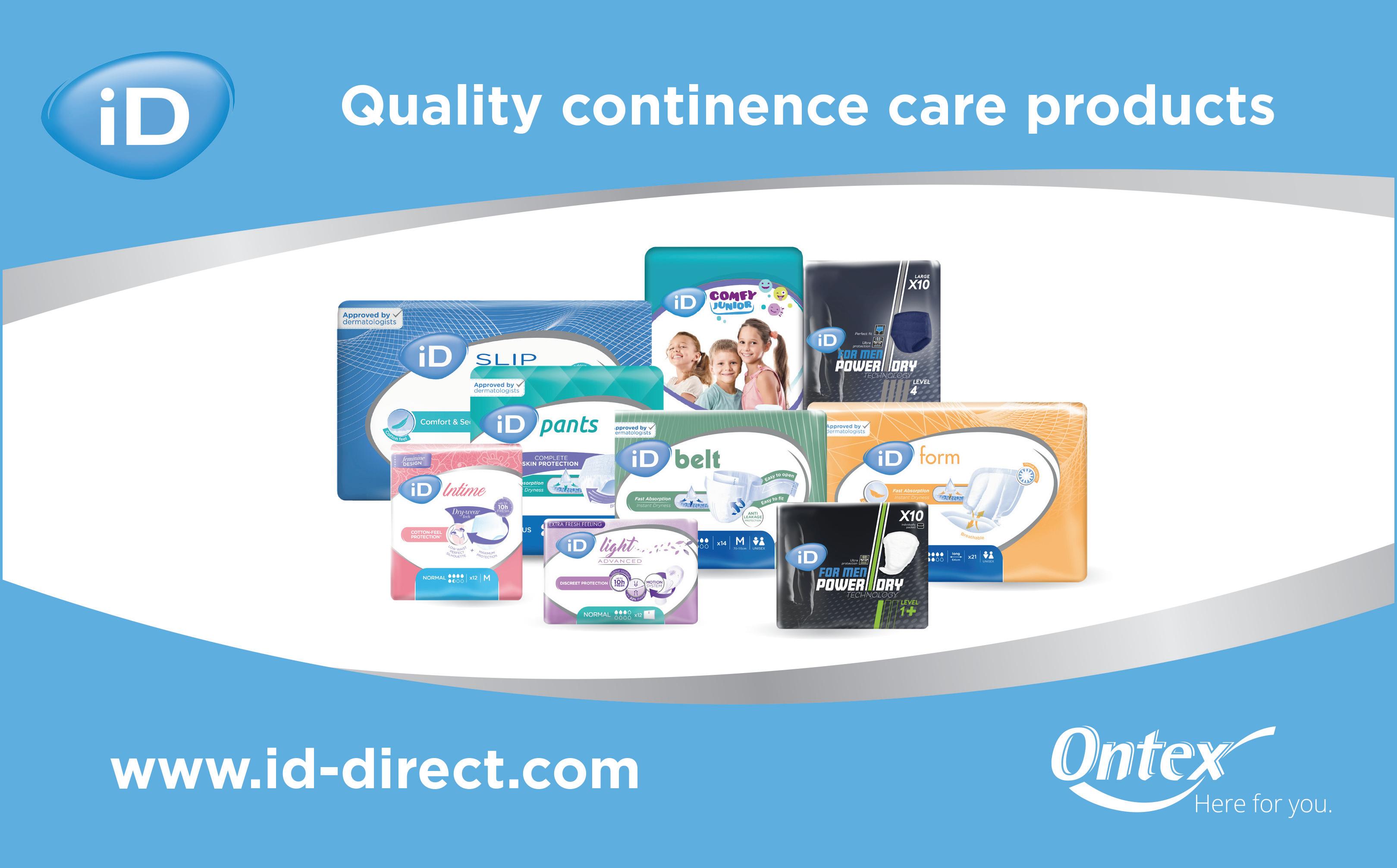
NIHR has funded 12 regional programmes to develop and deliver innovative research internship programmes to inspire registered health and social care professionals to build a research career.
The 12 regional programmes are part of the Health and Care Professional (HCP) Internship Programme. It provides flexible and tailored programmes to increase research skills and leadership. It will play an important role in building research capability and capacity across England and ensure opportunities are available to all regardless of geography.
The 12 programmes have been awarded a total of £10.5 million. Each programme is collaborative, led by an NHS trust and including partner organisations. They will provide 276 bespoke internships each year for 3 years.
The Health and Care Professional Internship Programme is aimed at pre-doctoral applicants. It will be available to a wide range of registered professionals, including:
• Nurses

Pharmacists
Healthcare scientists
Social workers
• Midwives • Allied Health Professionals
Public health professionals
Other registered professionals within health and social care (not including doctors and dentists)
Professor Waljit Dhillo, Dean of the NIHR Academy, said: “The NIHR is passionate about people and developing careers in research. The new Health and Care Professional Internship Programme is vital for developing the skills for future generations of health and care researchers.
“Developing skills in research and innovation is an important part of training a workforce fit for the future, to tackle health inequalities and improve health outcomes. These opportunities are critical for building a research active workforce within health and care and exposing health and social care professionals to the benefits of research. I look forward to seeing the positive impact and difference the programme will have.”
Residents and colleagues from the Hickathrift House care home, in Marshland St James, got in the Halloween spirit by visiting Worzals to see Rusty’s Great Pumpkin Patch for the fourth year in a row.
On the 30th of October, Hickathrift House Care home, while working with the team at Worzel’s, took a bus full of residents and 3 carers to the pumpkin patch. Residents and staff had a brilliant time exploring the various themed areas from Jurassic Park to Hocus Pocus. In additional to the beautiful themes the residents and staff loved seeing the various types of pumpkins available.
General Manager, Paula Melerski said: “We absolutely love being able to take our residents out and about to visit Worzals for their events, it makes us all so happy to experience seasonal events like this. It has been a fantastic day for all.”
Graham, a resident at Hickathrift House Care Home, said: “Who knew there were so many different pumpkins! I love the different colours and wonder what they're like on the inside. Some are so tiny and others gigantic! It's been so much fun visiting the different themes and of course, seeing all the children enjoying their visit. This has put a big grin on my face all afternoon".
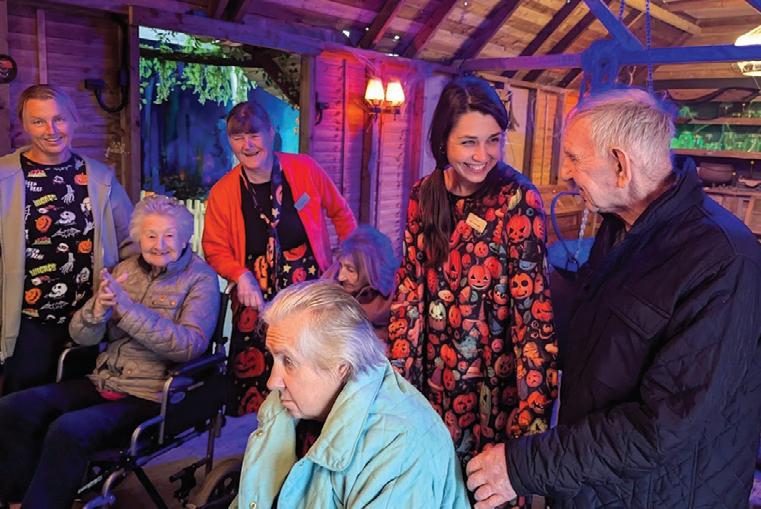

A local couple have celebrated their 70th wedding anniversary with the help of staff and fellow residents at RMBI Care Co. Home Scarbrough Court, in Cramlington, Northumberland.
Care home residents John, and Eileen Atkins both 90 years old, were both born in the countryside of Northumberland. Eileen grew up in a little village called Scots Gap and John at Little Harle.
Eileen went on to train to be a nurse and worked in Newcastle. John left school and went to Greggs School of Commerce in Jesmond. They first met at the dances that were held around all the local village halls on a Friday night. It was destiny as they often met on the way back home on the bus that went from Haymarket, Newcastle into the villages of Northumberland and got together through bus journeys and the dances.
They got married at a church in the village of Cambo in 1955, surrounded by their family and friends, and had their reception in the local community hall. Eileen remembers what she wore on her wedding day. Along with her wedding dress, she wore a floral headdress, and carried a hand sheaf of red roses and pink carnations.
John and Eileen loved to travel together, and have travelled extensively around the world. They used a
touring caravan for a long time and in the later years, they enjoyed many cruises. They love to dance and have done this all throughout their lives, keeping it up at family gatherings and often outlasting the younger members of the family. They joined a number of tea dances, including one at the Irish Centre in Newcastle, and went every week up to the age of 89 years.
John and Eileen went on to have five children, and today, they have 13 grandchildren, and 14 great grandchildren.
When asked what they believe is the secret to a happy, long marriage, Eileen says: “It is love!” but John jokingly disagrees and says: “It’s about my wife being (thinking she is) the boss, and having the odd whisky and water.”
They celebrated their special day at Scarbrough Court, where they have lived together since March 2025, with a wedding themed party. The entertainer sang their special song while the couple danced.
Activities Co-ordinator, Stacey commented: “It was a pleasure to host a celebratory party for John and Eileen to celebrate their 70 years of marriage. To stick together through thick and thin for so many years is an amazing feat.
They’re an inspiration!”

In April 2025, the Supporting the Provider Market (STPM) team in County Durham published a new report evaluating the use of pobroll® — a waterproof bed-bathing wrap designed to improve dignity, comfort, and ease during personal care.
This evaluation was carried out across 10 care homes with high numbers of residents living with dementia. Each setting was given one or more pobroll® units and invited to share feedback through a structured survey. The findings reveal how even simple tools can make a significant difference in everyday care.
How was pobroll® used?
Most care homes used pobroll® daily or several times per week, showing it quickly became part of regular practice. Staff noted that one of the biggest challenges was not having enough units — all homes requested additional stock after the trial, highlighting a clear appetite for wider adoption. What did care teams think?
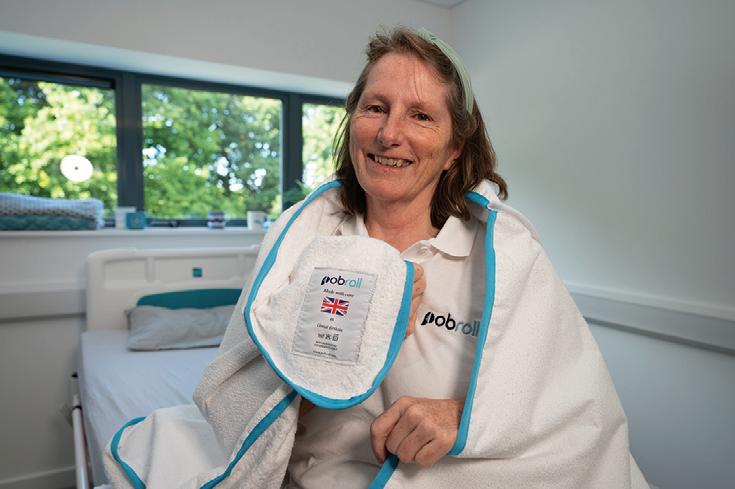
Feedback from the care homes showed strong support for the tool: Ease of use was rated highly, with an average score of 4.4 out of 5. Staff found pobroll® straightforward to incorporate into care routines.
Training was rated slightly lower, at 3.8 out of 5, suggesting that while the wrap is easy to use, additional training resources could improve onboarding for new users.
• Resident response was positive. Three in ten care homes reported improved mood or behaviour during bed
Written by Pat O’Brien
bathing for dementia patients.
• Key benefits included greater warmth, coverage, and dignity for residents, especially those who might find conventional methods distressing. Some teams also found it particularly useful for end-of-life care
Would they recommend pobroll® for bed bathing for dementia patients?
Absolutely. Homes rated their likelihood to recommend pobroll® at 4.3 out of 5, with half of respondents giving it a full 5 out of 5. The overall feedback was clear: this is a valued, meaningful addition to personal care.
Would they recommend pobroll® for bed bathing for dementia patients?
The results of this trial reinforce what many professionals already believe — that small, thoughtful design changes can significantly improve care. For residents who are bedbound or living with dementia, personal care can often be a distressing experience. But with the right tools, it doesn’t have to be.
The pobroll® isn’t a complex device. It’s a simple, dual-layered cotton towelling wrap. But its thoughtful design — offering full coverage, comfort, and support — makes a real difference where it matters most.
If you’re part of a care home, hospice, or hospital and would like to explore how pobroll® could benefit your residents or service users, get in touch. We’re here to support compassionate, dignified care — one small change at a time.
See the advert on the
The flu season has hit the NHS more than a month earlier than usual, with cases three times higher than this time last year.
The UK Health Security Agency’s (UKHSA’s) latest surveillance data published today shows cases have increased this week from 6.1% up to 8.2% – largely driven by a spike among school-aged children – and is up from 2.9% this time last year.

It follows the warning signs from the Asia-pacific, where Japan has already declared a flu epidemic, with many schools needing to close.
This early increase has prompted concerns of flu spreading into the wider population in the coming weeks and triggering a “long and drawn-out flu season”.
NHS teams are ramping up efforts on its autumn/winter flu vaccination campaign to prevent further spreading of the virus, with 12.2 million flu vaccines delivered so far this autumn (12,219,568).
For the first time, those eligible for winter vaccines have been able to book since 1 September to allow more people to book their flu or COVID-19 vaccine appointments in advance.
All eligible adults should aim to have received their flu vaccination by the end of November – with vaccines available for everyone aged 65 and over, under 65s in clinical risk groups, care home residents and carers, pregnant women, close contacts of those
who are immunosuppressed and frontline health and social care workers as well as children.
Appointments and walk-in sessions are available in local pharmacies, GP practices and community clinic dropin centres across the country.
Parents are also reminded to complete their child’s vaccination consent forms to schools, or to book an appointment for 2 to 3-year-olds, to ensure their child gets vaccinated against flu ahead of the Christmas period.
Duncan Burton, Chief Nursing Officer for England, said: “This early rise of flu in children is particularly concerning – especially given that flu circulation in children normally precedes that in adults – so it’s vitally important those eligible come forward for their vaccine as soon as possible to avoid a long and drawn-out flu season.
“The flu virus changes every year, so it’s important to get a vaccination each year to ensure yours and your families protection and to help reduce the spread to others.
“Vaccines are one of the safest and most effective ways to help shield against the virus and prepare for what we expect to be a very challenging winter, so I would urge everyone eligible to come forward for their jabs as soon as they can, with easy to book appointments or drop-in sessions now available closer to home.”
Fun loving residents at a Black Isle care home stepped into the spotlight for the home’s latest show-stopping event, the ‘Stars of Eilean Dubh’ talent show.
It’s the latest in a series of creative, community-focused projects at Eilean Dubh in Fortrose, from hosting a resident fashion show and designing a sculpture for the Highland Hospice HeArt Trail to organising a Pride celebration.

Residents chose their own songs and performances, supported by staff and local musicians. Care staff and volunteers helped prepare costumes and props, decorate the venue, run rehearsals and organise a raffle and auction.
The event raised £2,300 for the Residents’ Wellbeing and Comfort Fund, which supports activities, individual experiences and outings.
A highlight of the day was 96-year-old resident Billy
Mackintosh, formerly the band leader, vocalist and accordionist of the Billy Mackintosh Dance Band, formed in 1950. Billy returned to the stage for a duet of There’s a Hole in My Bucket with Wellbeing Coordinator Fiona Stoddart.
“I never thought at my age I’d be back performing on stage,” said Billy.
Deputy Manager Lucia Matheson said: “Events like this remind us what life in a care home can be – a place where people try new experiences, revisit past achievements and feel part of a community. Our residents put their hearts into every performance, and it was emotional and inspiring to see them shine, not least Billy who loved being centre stage once again.
“I’m incredibly proud of our team for working so hard to make this possible, and grateful to our families, friends and community for their generosity and support.”



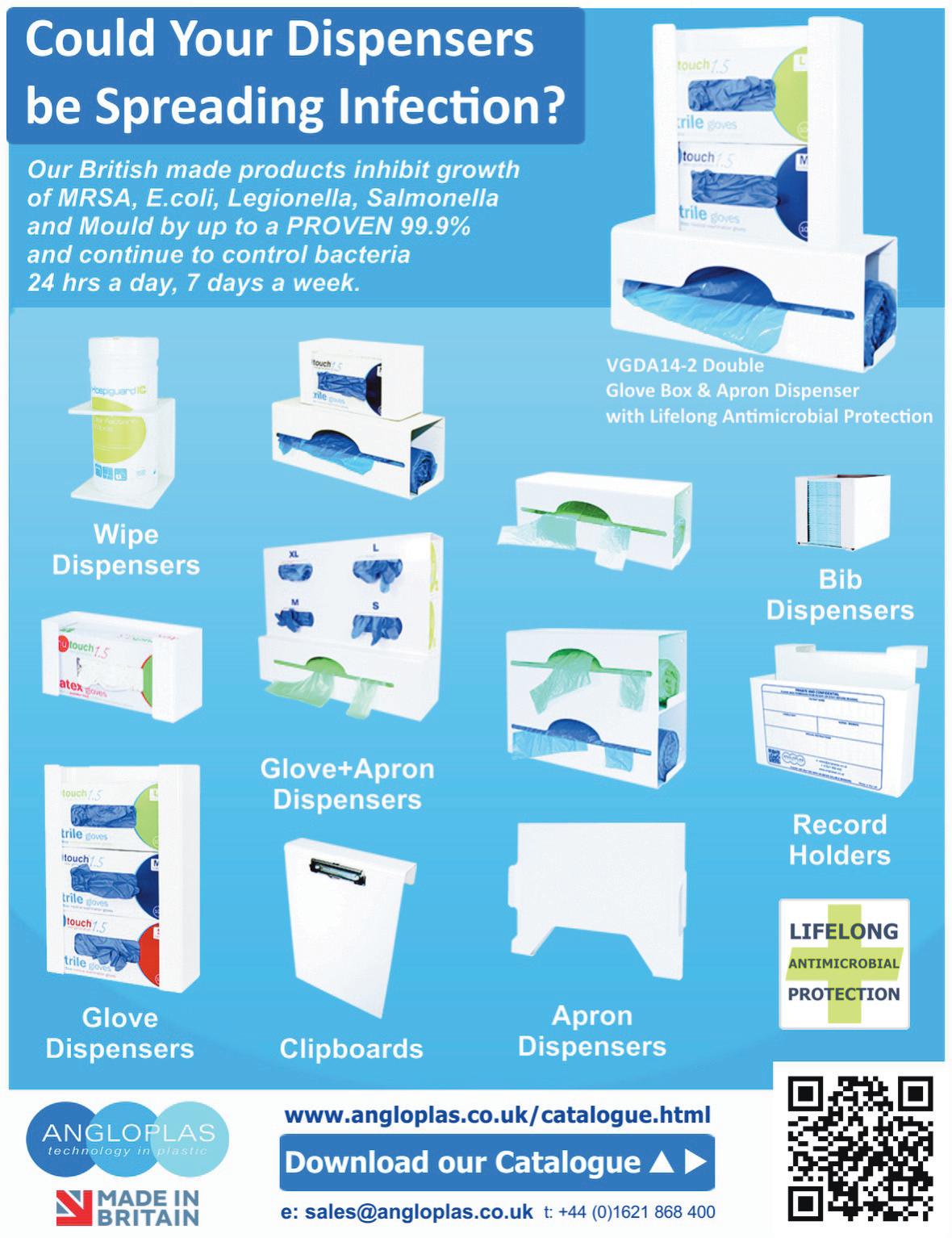

As sustainability rises up the agenda for care organisations, heat is a natural target for efficiency improvement. Andy Green, Head of Technical Solutions at Baxi, discusses the importance of planning a net zero pathway and some of the achievable options for care home operators
The UK’s circa 17,000 care homes may vary in size and age, but reliable heating and hot water is essential in each to prioritise the wellbeing and comfort of their residents. As this service is typically the largest user of energy in care home facilities, it’s also a good starting point for reducing operating costs and associated carbon emissions.
Let’s consider some of the achievable measures to improve the efficiency of the heating system and reduce its carbon impact
In our recent survey of over 400 care homes managers, budget pressures, eligibility for funding and technical understanding of achievable options were the top challenges listed when considering decarbonising heat in their buildings. Subsequent focus group sessions also revealed that unplanned replacements are common, frequently resulting in a like-for-like distress purchase rather than enabling the care home operator to plan and implement a phased approach to net zero. But with care homes coming under increased pressure to adopt sustainable practices in line with the nation’s wider 2050 net zero target, putting a roadmap in place is absolutely key. Fortunately, care home managers have access to heat experts like Baxi for support. We work closely with care homes first to understand the viable options for improved system efficiency and then to help them plot their unique net zero pathway.
The first step should always be to understand how and where energy is being used in the building. Identifying and limiting any heat loss to the environment will not only immediately improve operating costs but can significantly reduce the size or capacity of plant required when refurbishing the system – which in turn will lower the required capital expenditure.
Practical examples might include building fabric upgrades such as roof and wall insulation, draught proofing and/or improving the thermal performance of windows and doors. Adding lagging to poorly insulated pipework will also prevent heat losses within the system for improved performance. Where necessary, adjust the heating controls and thermostat settings to optimise the temperature regimes and balance energy efficiency with thermal comfort.
Light refurbishment still accounts for much of the work in the care home sectors according to our focus group research, despite the willingness shown for embarking on heat decarbonisation projects.
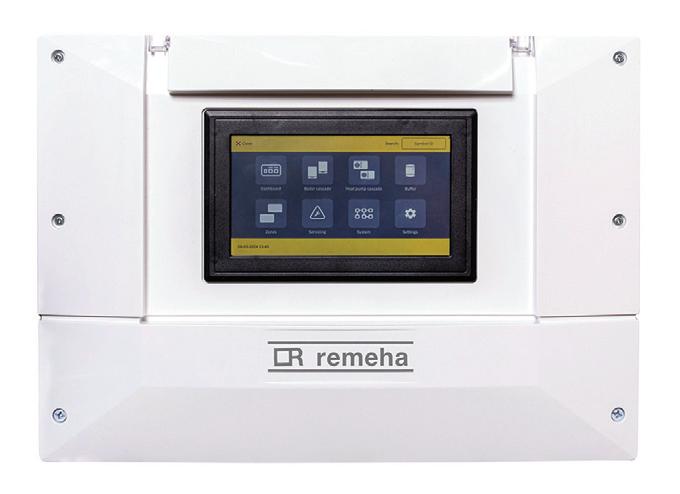
If upgrading to more efficient gas condensing boilers or direct-fired water heaters, use this opportunity to prepare the heating system for the integration of low temperature heat pumps at a future stage.
Addressing the system’s distribution pipework and heat emitters will allow the system to operate more efficiently at a maximum flow temperature of 55°C (or lower), in line with Building Regulations. This will also allow the condensing boilers and water heaters to operate in condensing mode, where they achieve their maximum efficiencies.
Replacing existing gas boilers or water heaters with heat pumps is the ultimate goal. New build care homes will be designed to require less heat for operational use and optimised for a decarbonised electricity grid. In buildings like these, a fully electric approach to heating and domestic hot water (DHW) based around renewable solutions such as our Auriga mid temperature and Auriga HP + high temperature heat pumps will be the favoured approach, particularly when combined with solar thermal and/or solar PV solutions.
In care homes with complex refurbishment challenges, a phased pathway may be necessary. In such buildings, a hybrid heat pump system combining heat pumps with existing boilers and/or water heaters is often a fast, affordable solution to partial decarbonisation. This will enable a large portion of the heat in the building to be decarbonised while meeting safe operation requirements.
Each care home project and building will have its own requirements, so it is advisable to consult with the experts. Experienced heating and hot water solutions providers like Baxi can help break down the complexities for care homes by clearly explaining the options and outlining the associated carbon, energy and cost impacts of each. Working together, we can help ensure that the right decision is made to meet the specific needs of your building to set it on its path to net zero.
For more information, visit: Baxi Commercial Heating and Hot Water Solutionswww.baxi.co.uk/commercial
Top carers, nurses and support staff from one of Scotland’s leading providers of older person and specialist care have been recognised for their outstanding performance at an awards ceremony, following a record-breaking number of entries.
Over 1,750 nominations were made for the 2025 Meallmore Colleague Awards, up 17% from last year. The awards cover key aspects of care home life across 13 categories, including quality of care, activities, home management, catering and support services.
Presented by singer and TV personality, Michelle McManus, the awards celebrate Meallmore colleagues who have made a positive impact on improving the lives of colleagues, residents, and their family members over the past twelve months.
All 2,000 plus Meallmore colleagues are eligible for an award, with nominations coming from residents and their families, visiting professionals and other members of the team in the weeks leading up to the ceremony.
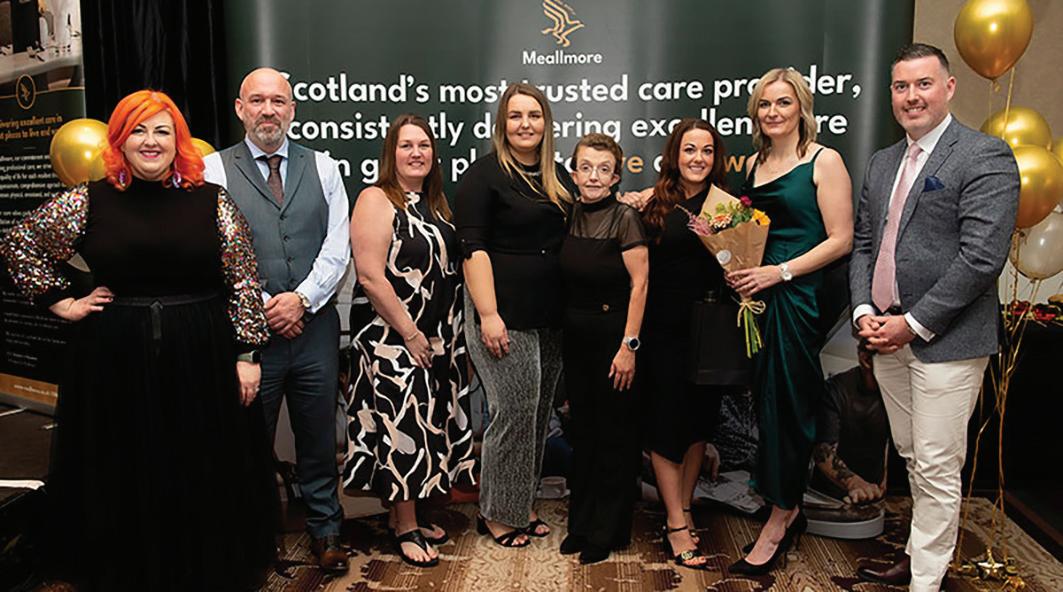
The event, now in its 14th year, returned to the Dunblane Hydro for the official ceremony with 250 people in attendance from Meallmore’s 27 care homes across Scotland.
Cillian Hennessey, CEO of Meallmore, said: “We’ve been blown away by the response to our awards this
year. It really is testament to the impact our colleagues have on residents, their families and their wider team. Every time I set foot in one of our homes, I’m truly humbled by the incredible work being done.
“These annual awards are a perfect way to take time out and recognise the care, professionalism and collaborative approach of our colleagues, and to honour the difference they make to the lives of our residents and their loved ones. I’d like to congratulate all the finalists, and of course, our very worthy winners. With thanks, as always, to the wonderful Michelle McManus who has once again supported us at the event, shining a light on the care we offer throughout the country.”
On presenting the awards, Michelle McManus added: “I was thrilled to be asked to take part in the Meallmore Colleague Awards for another year. These awards are an important opportunity to celebrate the dedication, compassion and care the team shows to their residents across Scotland, and it’s always such a positive event.
The stories behind the nominations are so heart-warming – I don’t know how the judges choose a winner!
“Thank you to all at Meallmore for inviting me back to be part of this very special event, and a huge congratulations to all who were nominated.”


Scotland’s care home sector has experienced a substantial contraction over the past decade, with the number of facilities falling by 18 per cent, according to the latest census data published by Public Health Scotland.
The Care Home Census for Adults in Scotland reveals that as of 31 March 2024, there were 1,020 care homes for adults operating across Scotland, compared with 1,240 a decade earlier. Registered places decreased by six per cent to 40,079, whilst the estimated number of residents fell by seven per cent to 34,113.
The data, which covers all adult care homes regardless of funding source, shows that occupancy levels have also declined marginally, dropping by one percentage point over the ten-year period.
Whilst overall numbers have declined, the pattern varies significantly by sector. The private sector, which delivers the majority of care home provision in Scotland, has shown remarkable resilience. The estimated number of residents in private sector care homes for older people stood at 25,853 on 31 March 2024, virtually unchanged from the 25,886 recorded a decade earlier.

In stark contrast, the voluntary and not-for-profit sector experienced a 37 per cent decrease in resident
numbers to 2,134, whilst the Local Authority and Health Board sector saw a 17 per cent decline to 3,222 residents.
The census highlights the continuing prevalence of dementia within care home populations. Of the estimated 30,170 long-stay residents in care homes for older people on 31 March 2024, approximately 19,093 – representing 63 per cent – had either medically diagnosed or suspected dementia. This proportion has remained consistent with previous years, underlining the critical importance of specialist dementia care training and facilities within the sector.
Despite the comprehensive nature of the census, data collection remains challenging.
Of the 1,020 care homes open on census date, 818 facilities (80 per cent) submitted data for at least part of the census, whilst 202 homes (20 per cent) provided no information.
Public Health Scotland estimates missing data where possible, using established methodologies to ensure the statistics remain as complete and reliable as possible. The census was not conducted in 2019/20 due to the COVID-19 pandemic.
A former department store sales assistant ‘came out of retirement’ for a morning when her Bournemouth care home arranged for her to volunteer at a cancer charity shop.
Dorothy ‘Dotty’ Dixon, 89, who lives at Colten Care’s Avon Cliff, was ‘in her element once again’ as she served customers at Wessex Cancer Support in Poole Road, Westbourne.
Dotty spent her whole career in retail, working for many years at the now-closed Beales store in Bournemouth and at the shoe shop Dolcis.
She didn’t need to be asked twice when Colten Companion Elise Martin suggested she might like the chance to relive her retail days.
Elise knew that Dotty loved her career, has a personal connection with Wessex Cancer Support and had been thrilled when Avon Cliff residents chose it as the home’s charity for this year.
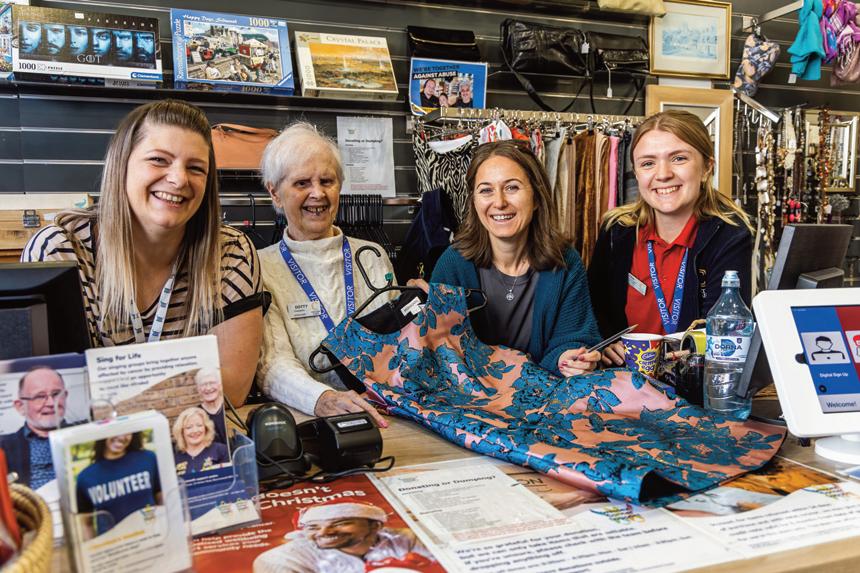
Having made the necessary arrangements with Wessex Cancer Support’s Alina Foey, Retail Area Manager, and Hannah Bignell, Head of Volunteering and Training, Elise accompanied Dotty on a minibus trip to the shop.
“We spent the morning there with Alina and Hannah, and Dotty was soon back into the swing of things,” said Elise. “First, they invited her to check all the coat hangers were correctly labelled and looking neat. Then, under their guidance, she had a stint behind the till serving customers. Of course, she couldn’t resist a little browse on the job and even used her sales skills to convince me to buy a lovely winter coat. Dotty chatted with customers throughout the morning, helping one lady choose accessories to go with her new dress.”
Elise added: “Seeing Dotty in her element once again while doing something for a great cause was truly heartwarming. She relished the chance to be out in the community giving back to the charity we have been fundraising for this year. It was the best example of ‘retail therapy’, such a valuable experience.”
Dotty said: “Being here doing this again made me quite emotional. I forgot how much I love it. There is something about helping a customer put an outfit together that makes me feel great. Being back in this environment was unexpected but so brilliant and I am happy I can still do it.”
Alina said: “It was lovely to meet Dotty, welcome her to the shop and enable her to rekindle her retail skills. We’re so happy she enjoyed the experience and had fun.”
Alina’s comments were echoed by Hannah who said: “Much of what we do in our shop activities relies on volunteers and Dotty certainly provided excellent support.”
Opened in March 2024, Wessex Cancer Support’s Westbourne shop sells clothing, bric-a-brac and household items. It is the charity’s only Dorset shop, with four others in Hampshire and one on the Isle of Wight.
Wessex Cancer Support is dedicated to improving the lives of people affected by cancer.
From professional counselling, complementary therapies, activities, support groups and courses, the charity offers a range of free wellbeing and support services for people in Dorset, Hampshire and the Isle of Wight.
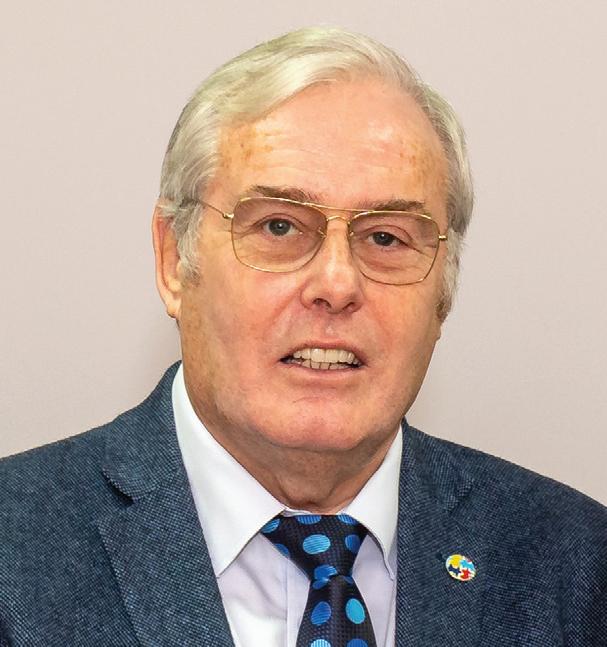
BEYOND CQC/ CIW/ CI STANDARDS
In today’s highly regulated health and social care environment, providers face the dual challenge of ensuring compliance while striving to deliver safe, high-quality, and commercially sustainable services. Care Inspections UK Limited (CiUK) has emerged as a trusted partner in this landscape, providing a professional and independent inspection service that goes beyond the standard requirements of the Care Quality Commission (CQC), The Care Inspectorate Wales (CIW) and the Care Inspectorate (Scotland), collectively “The Inspectorates”
What sets CiUK apart is its status as a registered inspection body, operating with the highest levels of professionalism and governance. This official recognition imbues care providers with confidence that inspections are carried out with rigour, objectivity, and an unwavering focus on evidence. Every report is underpinned by validated, research-based methodology, ensuring the outcomes are credible, balanced, and practical.
While CQC/ CIW/ CI inspections focus on fundamental areas such as safety, effectiveness, responsiveness, and leadership, CiUK’s approach extends further. Each CiUK inspection covers all the domains CQC/ CIW/ CI would expect, but also incorporates additional layers of analysis essential for continuous improvement. This Includes:
• Operational risk management involves identifying risks before they become incidents, reducing exposure for service users and providers.
• Quality enhancement: Assessing opportunities to raise standards in care delivery, staff engagement, and governance.
• Commercial sustainability: Offering insight into how operational practices influence financial performance, helping providers balance compliance with business viability.
The result is an inspection report that is not only regulatory-ready but also a strategic tool for improvement.
Professionalism is at the heart of CiUK’s ethos. Inspections are conducted by highly experienced professionals who bring frontline expertise from clinical, managerial, and governance roles in the care sector. This depth of knowledge allows CiUK to deliver meaningful feedback that resonates with staff at every level, from frontline carers to boardroom directors.
Independence is equally vital. As an external registered inspection body, CiUK reassures providers that its findings are unbiased and transparent. In a sector where credibility matters, this impartiality is invaluable in preparing for CQC inspections and demonstrating accountability to commissioners, investors, and the wider community.
Care providers today operate in an environment of heightened scrutiny and rising expectations. CIUK’s inspections do more than highlight compliance gaps; they provide a clear roadmap for reducing risk, enhancing quality, and driving organisational improvement.
By identifying weaknesses early, providers can take corrective action before issues escalate. At the same time, CiUK’s focus on strengths and opportunities supports a culture of positive development. This balanced approach ensures that inspection outcomes are constructive, not punitive, fostering continuous organisational improvement.
One of the most overlooked aspects of care provision is its commercial dimension. Poor compliance and weak governance inevitably carry financial consequences, from reputational damage to contract loss. CiUK recognises this and integrates commercial insight into every inspection. CiUK helps providers achieve operational excellence and commercial resilience by aligning care quality with business performance.
Choosing Care Inspections UK Limited means selecting a partner committed to professionalism, independence, and comprehensive excellence. CiUK inspections do more than prepare organisations for regulatory visits—they empower providers to deliver safer, higher-quality care while protecting their reputation and commercial future.
CiUK delivers evidence-based assurance and actionable insight for providers who want more than compliance.
Government plans to move more NHS care into the community and out of hospitals won’t be achievable unless action is taken to address the dire state of district nursing, with an estimated one in four district nurses having left the workforce in the year to September 2024.
Ahead of the government’s new NHS Workforce Plan, a Nuffield Trust report published today details the consequences of a failure to invest in district nursing, just when it is needed as a cornerstone of community health care.
The authors set out how district nursing services, which are intended to provide care for patients and support for their families at home, in clinical settings and in care homes – 24 hours a day, 365 days a year – are in a state of crisis. The supply of nurses is plummeting while demand for care has risen, and is set to rise further. From 2009/10 to 2023/24, the number of district nurses fell by 43% (an estimated 55% when taking into account growing patient need), while the need for the service is estimated to have risen by 24%.

It is projected that, as more people live for longer and with more complex health needs, demand will increase by another 34% over the next 15 years to 2040. The Nuffield Trust says this trend must be urgently addressed, and restoring the service to 2009 levels, relative to current population, could cost £376 million.
The analysis also found concerning variation in patient access to services across the country, with the number of staff recorded in district nurse roles significantly higher in the North West (13.7 nurses per 100,000 needs-weighted population) but lower in the East (2.8), South East (3.3) and South West (4.4).
FURTHER FINDINGS INCLUDE:
• There were 2.8 million fewer recorded district nursing contacts (such as face-to-face or telephone appointments) in 2023/24 (29.2 million) than in 2009/10 (32.0 million).
• There was a fourfold unexplained variation in reported average cost of a face-to-face appointment between providers of district nursing services in 2023-24 (ranging from £23 to £98).
• In 2023/24, fewer than half of training places led to qualified district nurses.
• District nurses are expected to typically start at NHS pay Band 6, but the analysis found that over one in
four (27%) of staff recorded as ‘district nurses’ are at a lower pay band. This could represent an undervaluation of the role and limit the level of skills and experience on the frontline.
• An increasing proportion of the staff working within the district nursing workforce are not nurses – the proportion of staff employed in other roles, including as healthcare assistants, has risen from 18% in 2009 to 28% in 2024.
Previous studies have highlighted issues with district nurses’ experience of work. Up to a fifth (19%) of district nurses’ time is spent on administrative tasks, and in a 2023 survey, a quarter of the workforce reported that they are carrying out more than seven hours a week of unpaid work.
The heavy workload is regularly cited as a factor by those leaving the workforce, while the lack of senior roles and access to professional training and development also impacts retention.
The Nuffield Trust report sets out a range of clear recommendations to reverse these trends and improve the supply and retention of district nurses. This includes calling for the Department of Health and Social Care and NHS England to work with employer representatives to ensure there is a mechanism and funding in place, so all newly qualified district nurses have an appropriate role available to them.
Nuffield Trust Chief Executive, Thea Stein said: “District nurses make a huge contribution to the NHS through managing long-term conditions, supporting patients with severe illness, and providing palliative care, but for too long this staff group has been neglected by policymakers. The consequences we have uncovered are stark – far fewer patients are getting crucial support from district nurses, despite the evergrowing need for these services.
“If the government doesn’t begin to address the glaring issues with district nursing and build a workforce plan that better supports this pillar of community care, it will be a core weakness of efforts to shift more care from hospital to home. Urgent action is needed to ensure the training pipeline for district nursing is fit for purpose.”
We’re so proud to announce that Hugh Myddelton Care House won the “Best Communal Gardens” category in the Enfield in Bloom 2025 competition!
The celebration took place at the Chicken Shed Theatre, where we were delighted to receive our certificate from The Mayor of the London Borough of Enfield, Margaret Greer.
It was such a proud and joyful moment for everyone involved, a big thank you to all who helped make our gardens so beautiful this year Especially our volunteer Pat and Residents ambassador Rosa!
We also had the chance to say goodbye to Enfield in Bloom’s chairman, Dennis Lushey. After 20 wonderful years, Dennis has chosen to retire from the competition. We wish him all the best and thank him for his incredible dedication and contribution to our community over the years.
“We are absolutely delighted to have been recognised in Enfield in Bloom,” said Jade Shea, Home Manager at Hugh Myddelton Care Home. “Our garden is not just a beautiful space it’s a source of comfort, activity, and pride for everyone here. This award belongs to our entire community who have worked so hard to
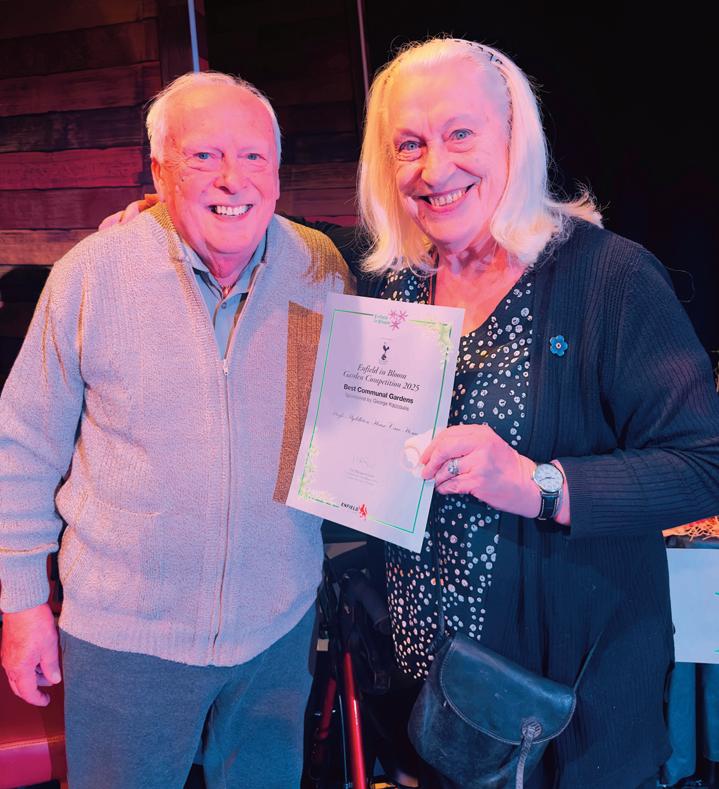
make it flourish.”
Hugh Myddelton Care Home would like to extend a big thank you to Volunteer Pat Shackleton and Residents' Ambassador Rosa Bertolino for their incredible effort and continued support of the garden. Their enthusiasm and commitment have been key to the garden’s success.
Jade add: A heartfelt thank you also goes out to all the staff at Hugh Myddelton, with a special mention to Gunel Bayramova and Miguel Almeida, who have gone above and beyond in maintaining the garden and ensuring it remains as beautiful as it is today.
The Enfield in Bloom competition, held annually, honours the best in gardening and environmental efforts across the borough, encouraging schools, individuals, and organisations to transform their outdoor spaces into green havens.
This year’s silver medal is a testament to Hugh Myddelton’s ongoing commitment to enhancing residents’ lives through meaningful outdoor experiences and community involvement.
Repose Furniture is one of the UK’s leading manufacturers of bespoke seating solutions, with a reputation built on craftsmanship, innovation, and a strong commitment to improving the quality of life for its customers. Established in 1999 and based in the West Midlands, the company has grown from a small family business into a trusted supplier to both the domestic and healthcare markets. Every chair produced by Repose is handmade in the UK, with an emphasis on quality, durability, and comfort, ensuring that each product meets the specific needs of its user.
Whether for home use or demanding healthcare environments, Repose combines skilled upholstery techniques with modern engineering to create chairs that provide postural support, pressure management, and ease of use. Their wide product portfolio includes rise and recline chairs, hospital and care home seating, bariatric solutions, and specialist products designed to address particular medical and lifestyle needs. An essential element of their offering is flexibility: customers can choose from a range of back styles, seat cushions, mechanisms, and fabrics, allowing each chair to be tailored to the individual. Interchangeable parts mean that a chair can adapt as a user’s requirements change, extending the product’s longevity and ensuring value for money.
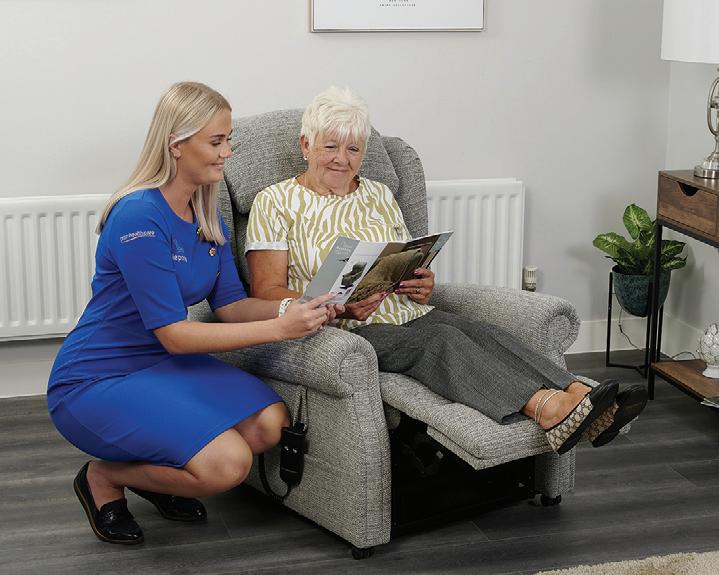
The healthcare sector is a particular area of expertise for Repose. They strive to design chairs that balance comfort with clinical functionality. Features such as tilt-in-space mechanisms, adjustable cushioning, and pressure relief options make their healthcare seating particularly suited to long-term use in hospitals,
hospices, and care homes. The company’s bariatric range demonstrates the same careful attention to detail, offering robust yet comfortable solutions for larger users.
While customisation is the centre of the Repose offering, they also recognise the urgency often faced in healthcare settings. To address this, Repose have developed their Healthcare Express Chairs, designed to deliver high-quality healthcare seating at speed. The models in this range can be despatched within just five working days. The Multi Bari Express and bestselling Boston Express, for example, are available on this five-day lead time, offering care providers a rapid solution without sacrificing quality or functionality. For less specialist needs, some homecare models are even available on faster turnaround times, demonstrating Repose’s ability to balance responsiveness with craftsmanship.
Repose’s reputation is further reinforced by its after-sales support, 5-year manufacturing warranty, and commitment to ethical and sustainable practices. With a UK-based factory, a dedicated distribution network, and close relationships with healthcare professionals, the company continues to be a trusted partner in multiple sectors throughout the country and beyond. In combining bespoke design with reliable express options, Repose Furniture stands out as a manufacturer that truly understands the diverse needs of its
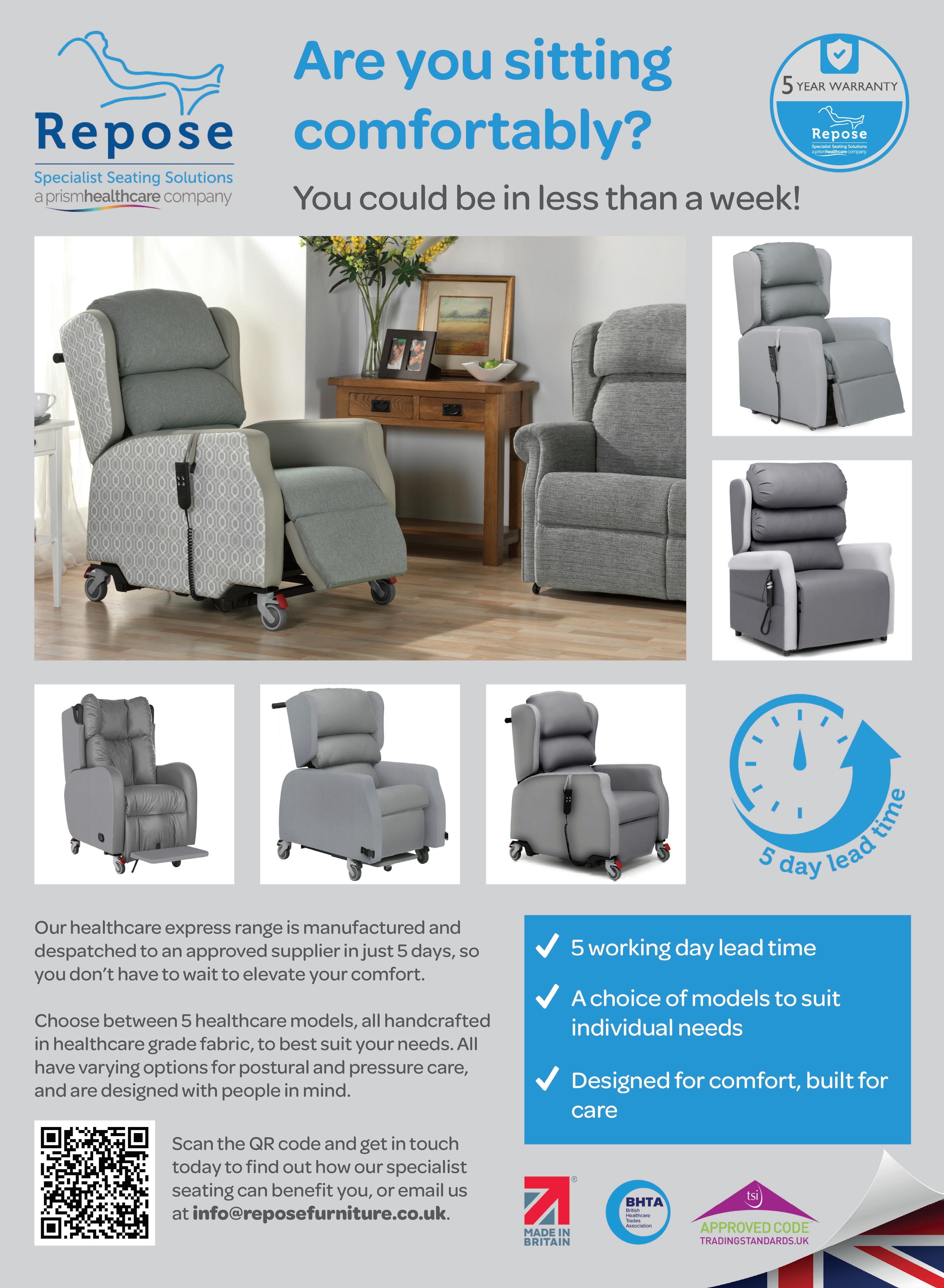
A Welsh Government Minister has hailed the “huge contribution” of overseas care workers amid a deportation row.
Health Minister Jeremy Miles joined Care Forum Wales chair Mario Kreft MBE at the Wales Care Awards to celebrate the nation’s unsung heroes of care homes and domiciliary care services.
The glittering event, dubbed the Oscars of social care and backed by headline sponsor Meddyg Care, took place at the Holland House Hotel in Cardiff.
The pair spoke out after a fierce political backlash over Reform UK leader Nigel Farage’s threat to deport legal migrants – a policy Mr Kreft branded “potentially catastrophic”.
According to Mr Kreft, Wales’ care system would be at risk without the dedication of international staff.
He said: ““We believe passionately at Care Forum Wales that the people who legally come to this country to care for our most vulnerable people deserve our utmost respect and our support and we want to make sure we continue that. We shouldn’t have the political nonsense about deporting legal migrants. “ Echoing the sentiment, Mr Miles said Wales was proud to be a welcoming nation.

“There are people working in our care sector who are from Wales, from other parts of the UK and from right around the world,” he said.
“They are absolute stars who make a huge contribution wherever they’re from in the world and they are welcome in Wales.”
The Minister was there to present the prestigious Dignity in Care Awards which were sponsored by the Welsh Government.
The blue riband award was won jointly by Sian Perez, the registered manager of Treforest-based Crwban Care and Support, nurse Sharon Leach from Claremont Court Care Home in Newport, Regional Support Nurse Rachelle Beasley from HC-One Wales, and Samantha Dodd, service manager at Cartref Ni Ltd in St Asaph.
Mr Miles added: “Dignity is something that is precious to all of us and we all want to know, at the time of our lives when we need care and are vulnerable, we want to know that our dignity will be respected and the care and the support we have is delivered in a way that recognises that dignity.
“In my own constituency of Neath I have had the privilege of going to care homes and I’ve met the people who are providing the care that we all depend on and it is genuinely inspiring to see the dedication, the commitment and the passion with which you all do your work.
“I want to say thank you to Care Forum Wales for this fantastic evening and the work you do all year round, providing a voice for the care sector in Wales and the representation you provide. It’s absolutely invaluable. It’s an important voice, it’s an effective voice.”
One of the most emotional moments of the evening came when a couple who sold their bakery to devote their lives to fostering children won the Peter Clarke Award for Promoting Excellence in Services for
Children and Young People.
Caroline and Tyrone Jones, from Tredegar, have opened their hearts and home to 25 children since giving up their family business in 2007.
The pair’s extraordinary dedication has transformed countless young lives – including that of a girl who came to them aged 10 unable to read and write and is now a qualified nurse.
The award came during what they described as “one of the best weekends of our lives”, with the ceremony taking place the day before their daughter’s wedding.
Caroline, 60, and Tyrone, 63, have also been approved as Shared Lives carers with the South East Wales Shared Lives Scheme to enable them to care for their foster children into adulthood.
Speaking about their award win, Caroline said: “We are absolutely gob smacked, we really didn’t expect it.
“It was a fantastic evening and we met some wonderful people. It was my daughter’s wedding the following day so our feet didn’t really touch the ground for a few days. It was definitely one of the best weekends of our lives.”
Winner of the Craig Thomas Lifetime Achievement Award was Keri Llewellyn, director of Barry-based All Care (South Wales) Ltd, who is also Care Forum Wales’ lead on domiciliary care.
The prestigious Spirt of Care Award went to retired Carol Dight, a highly respected nurse who worked for HC-One Wales.
Meanwhile, the Sir Bryn Terfel Foundation Wales Care Award for Promoting the Arts in Social Care was given to the “inspirational” founder of the North Wales Music Cooperative, Heather Powell, who is also the organisation’s head of service.
Mr Kreft added: “For more than 30 years, Care Forum Wales has worked tirelessly to champion the social care sector.
“The Wales Care Awards underlines the importance of the sector – it’s the glue that binds our communities together, both socially and economically.
“Our mission has always been to be the voice of social care in Wales to stand up for the workforce and ensure their dedication is properly recognised.”
A special moment in the evening when Mair Elis=Thomas, widow of the late Lord Dafydd Elis Thomas, took to the stage to present one of the awards.
According to Mr Kreft it was a touching gesture that reflected Lord Elis Thomas’s long-standing support for the Wales Care Award and for social care more broadly.
“Dafydd was a passionate believer in the power of the arts to enrich lives and support wellbeing and mental health,” said Mr Kreft.
“He is greatly missed, but his legacy lives on – not only through his contribution to public life as a Presiding Officer, but also through the positive impact he had on so many communities.”
According to data from carehome.co.uk, there are approximately 441,479 people residing in care homes across the UK.
For these individuals, the supported, structured environment of a care facility affords them a degree of independence and autonomy, alongside the medical and professional assistance needed to lead a healthy, safe, and fulfilling life.
Yet care homes are not without risk. Research suggests care home residents are three times more likely to experience a fall compared to those living in their own homes. Fortunately, advancements in technology, engineering, and facility design are actively tackling these risks, increasing the safety for those living in supported environments.
Pinpoint’s P2 alarm system is one of these solutions.
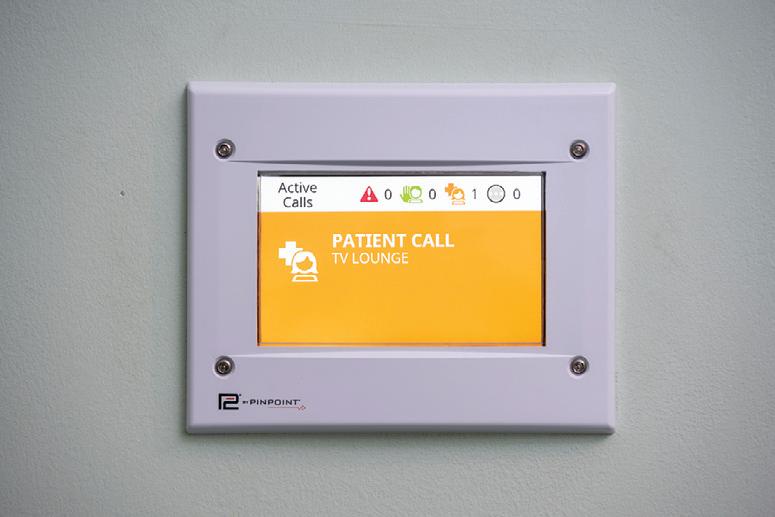
Enabling care home residents to summon professional support instantly, the Pinpoint System establishes a clear line of communication between residents and care staff.
By pressing a button on a Patient Call Button, the user alerts staff members to the need for help and the exact location of an active call. This information, displayed on a staff communication device, elicits an immediate response to deliver the required support.
For individuals more vulnerable to falls or accidents, the Pinpoint System ensures that medical assistance is readily available, offering reassurance to care home residents and their families that help is always at hand and that high-risk incidents are handled efficiently.
On a day-to-day basis, the Patient Call Buttons are used by residents in need of extra assistance, such as when using the bathroom, to get out of bed or to access certain rooms within the facility. In this way, the Pinpoint System gives individuals a greater degree of control over their routine and avoids the need for 1-1 supervision, enhancing their quality of life.
The Pinpoint Patient Call Buttons come in various forms, including Wrist PITs, which are worn on the wrist of the individual, and wall-mounted alarms. Wander Leads of up to 2 metres in length can also be plugged into wallmounted alarms to allow resident with limited mobility to activate the alarm from their bed or armchair.
Biomaster technology provides 24/7 antimicrobial protection for all devices, preventing the spread of bacteria in care facilities, while an Ingress Protection rating of 67 allows Patient Call Buttons to be installed in bathroom and kitchen facilities where residents may be more vulnerable to slipping.
The presence of the Pinpoint System gives care home residents the chance to maintain a level of independence, while being safe in the knowledge that professional assistance can be accessed quickly and easily. This balance between site security and individual autonomy instils residents and their families with confidence that support is always available, and the peace of mind that the wellbeing, safety and health of the individual is the care home’s top priority.
Please see the advert on the facing page or visit www.pinpoint.ltd.uk
Leading mobility provider AAT is stepping up to help deliver the Government’s new value-based model of care, shifting hospital to community and sickness to prevention. And it is uniquely positioned, as its equipment- the top-selling stairclimbing wheelchair S-Max Sella- is already in almost every local authority social care department and NHS Trust across the UK.
In addressing hospital to community, one of the primary causes for delay in hospital discharge is the social care support needed for patients, be it short- or long-term. NHS data reports changes to stairs is the first change required to a home.
In addressing prevention, mobility is the biggest limitation affecting people in their homes. There are 1m+ accidents on stairs every year, resulting in 43,000+ hospitalisations.
AAT’s S-Max Sella makes stairs safe for almost anyone with impaired mobility, with the help of a carer. The battery-powered stairclimbing wheelchair is “plug and play”, requiring no structural alteration nor installation. It can cope with almost every common staircase design, even turns and spirals.
It reduces risk and manual handling as it can traverse onwards from the flight of stairs
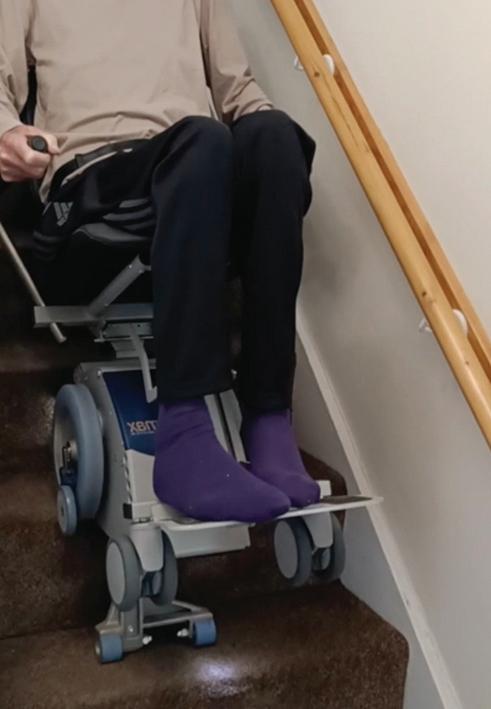
into whichever room is the final destination. It can even navigate external steps.
AAT’s unique re-issue capability for the Sella further delivers value: when the original recipient no longer needs the equipment, it can be re-prescribed to another person. AAT assesses each potential recipient, their carer and their home environment, and personally trains the carer(s) in the Sella’s safe operation as part of the process. No other stair solution has that capability.
“Making stairs safe is one of the biggest obstacles to all involved in social care- be it effecting efficient hospital discharge or preventing hospital admission in the first place,” says Peter Wingrave, AAT Director.
“With our existing presence within social care equipment stores, our nationwide team and speed of resolution, we are perfectly positioned to be the first call in addressing this element of the new Plan for Change. All it takes is a telephone call…”
Full details of AAT’s S-Max Sella and its re-issue can be found @ www.aatgb.com/ots/
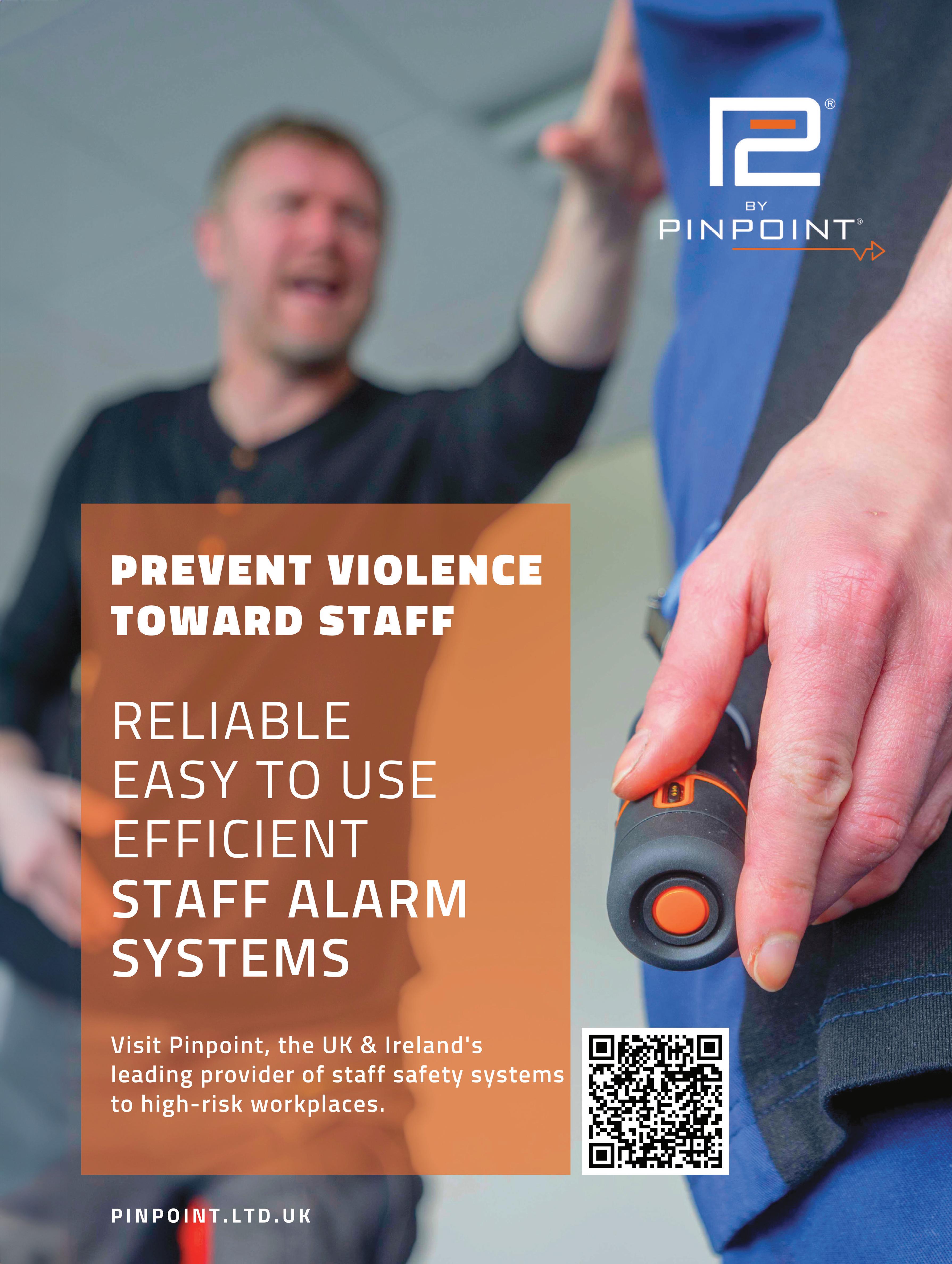
NHS productivity has grown by 2.4% in the first 4 months of this financial year (April to July 2025) compared to the same period last year, the latest NHS figures show.
The figure, which is based on the output of treatments, operations and appointments, shows care is being delivered more efficiently, so patients can get the treatment they need sooner at better value for taxpayers.
It builds on the 2.7% increase between April 2024 and March 2025 and is significantly above the long-term trend for health productivity (0.6%), showing the NHS is making strong progress in its recovery and is on track to meet its productivity commitments, despite working through record waiting lists, seasonal pressures and industrial action.
THIS HAS BEEN ACHIEVED THROUGH:
• more same-day discharge
• shorter hospital stays
• better use of technology
• reduced reliance on agency staff
• reductions in back office staff to reinvest funds in the front line

• improved staff retention
• more surgical hubs and community diagnostic centres running evening and weekend appointments
Health and Social Care Secretary Wes Streeting said: “This data shows our reforms are bearing fruit as the NHS continues to outperform its productivity target.
“We’ve sent in crack teams of top clinicians across the country, opened up more services at evenings and weekends, and slashed agency spending by almost a third.
It’s leading to more patients treated and less taxpayer money wasted.
“We know there’s more to do, but these numbers show the NHS is turning a corner.
There are people questioning whether universal healthcare is still affordable. We are showing that the NHS, free at the point of use and available to all, can survive and thrive in the modern age. With relentless focus on productivity, the NHS can be sustainable for taxpayers and deliver for patients once again.
the ‘Walk 62 Miles in October’ to raise money for Dementia UK.
The team have been walking 2 miles per day to ensure that they met the challenge whilst also raising vital funds to help provide specialist dementia nursing support for more families across the UK.
Residents, their relatives and other staff members were all very supportive and were constantly encouraging the participants throughout the month as
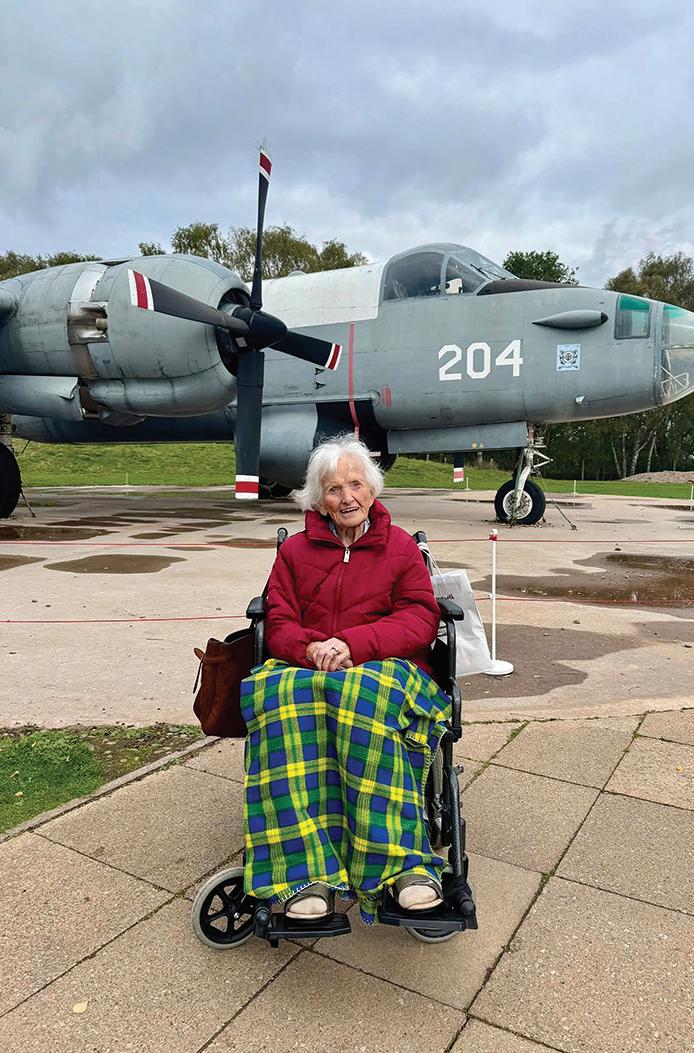
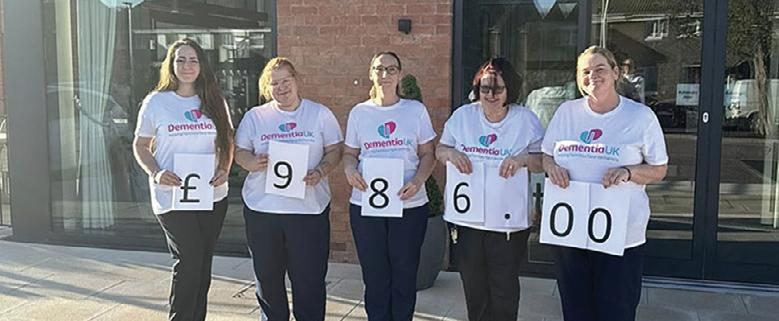
they took part in the fundraising challenge.
Olivia Rumball, Home Administrator at Bayleaf Care Home, said: “Taking part in this challenge has been a huge amount of fun and everyone at the home has been behind us all the way. It’s for such an important cause. I’m very glad to be able to do my bit to raise further awareness and money for the charity.” Bayleaf Care Home raised a grand total of £986 by completing the challenge, which will be donated to Dementia UK.
Residents from HC-One’s Millcroft Care Home in Redditch recently enjoyed a fantastic day out at the RAF Museum, where they were able to explore an incredible range of historic aircraft and learn more about the fascinating history of aviation.
The visit proved to be a wonderful experience for all involved. For some residents, the trip brought back personal memories of the war years and sparked meaningful conversations about their own experiences of aviation and history. Others relished the chance to discover something completely new, taking in the scale of the aircraft and the stories behind them. The day was filled with curiosity, smiles, laughter, and plenty of reminiscing, rounded off with a well-earned cup of tea together.
Millcroft Care Home recognises the importance of trips and activities in enhancing the wellbeing of its residents. Outings like this not only provide new experiences but also help residents to create lasting memories, connect with one another, and remain engaged with the wider community.
The team at Millcroft would like to thank the RAF Museum staff for their warm welcome, as well as the home’s colleagues and volunteers who supported the trip, ensuring residents had a safe and enjoyable day.
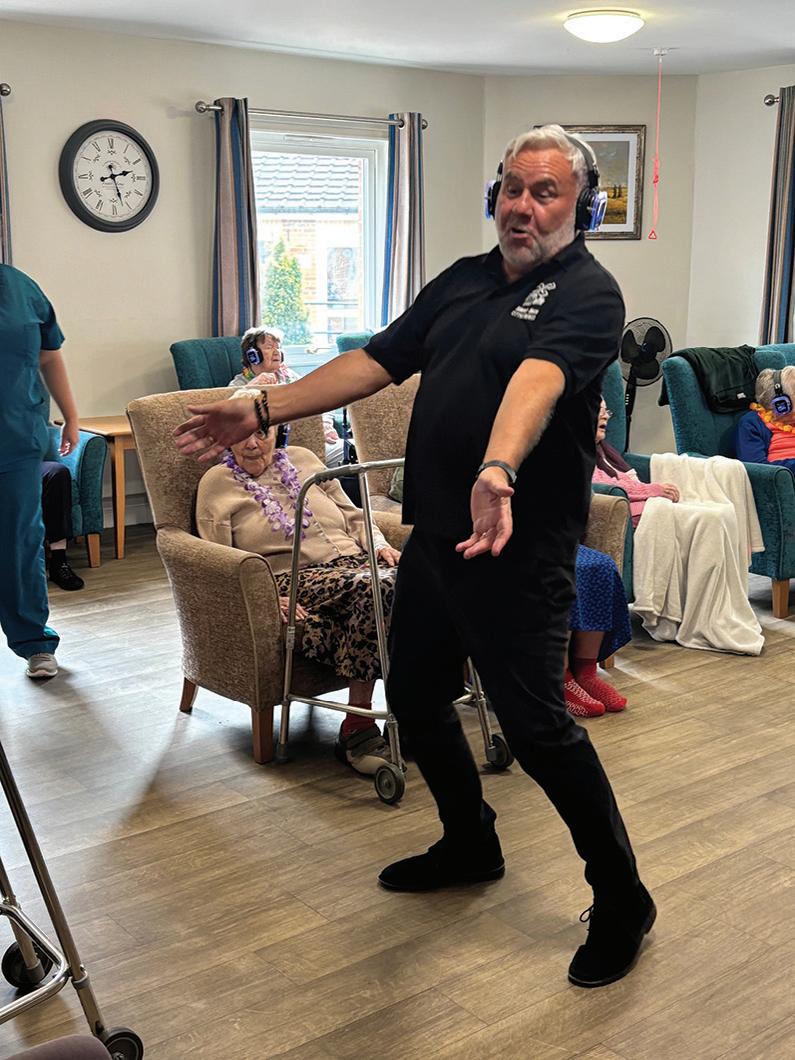
Recognising the powerful role of music in elderly care, Mariposa Care Group recently welcomed Shhuffle Silent Disco to bring a unique musical experience to several of their care homes. Sovereign Lodge care home in Newcastle-Upon-Tyne was the first to host this new style of music event - and it was an overwhelming success.
For many residents, it was their first silent disco experience - and quickly turned into a celebration of music, movement and memory. With classic hits from the 60s to the 80s, every resident had the option to switch between channels for different genres - giving them full control of their listening experience. Special song requests also added an extra personal touch to the afternoon. Attached are some pictures.
Teresa Stephenson, Home Manager at Sovereign Lodge, said: “Our residents absolutely loved it. There was lots of singing, dancing and most importantly – smiles.”
Mariposa Care extends heartfelt thanks to John Birkett of Shhuffle Silent Disco, whose energy and enthusiasm made the session truly unforgettable. Following the success at Sovereign Lodge, John has since gone on to bring the same joy and excitement to several other Mariposa Care homes - continuing to share the magic of music with our residents across the group.
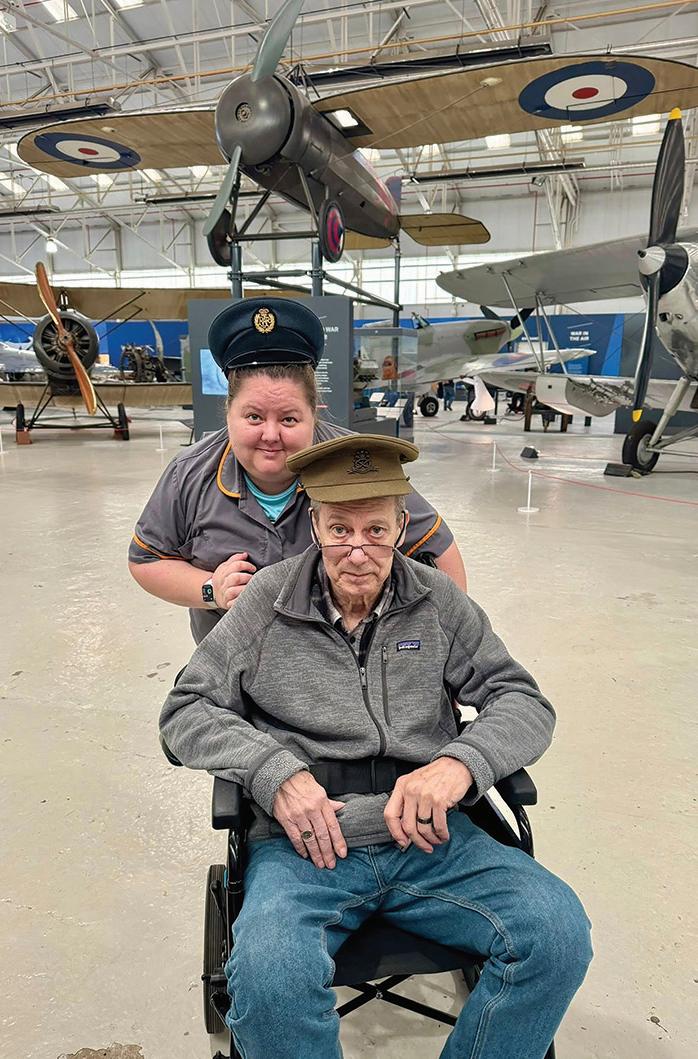
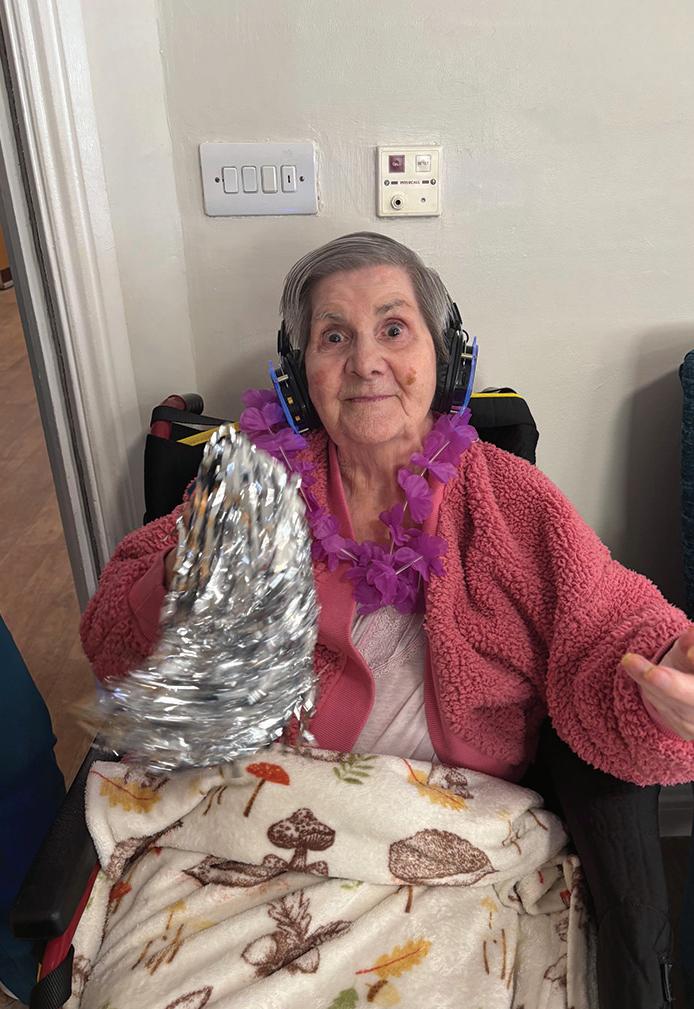

SEE US ON STAND J20 AT THE CARE SHOW
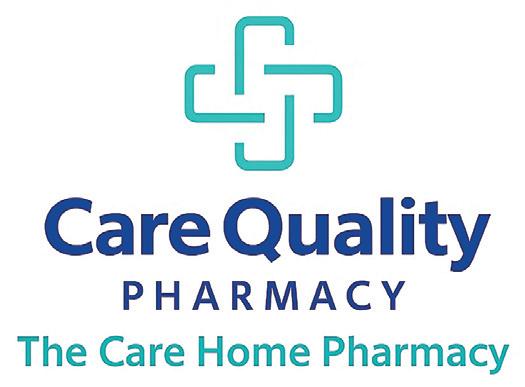
In the complex world of care-home medicine management, consistency and reliability are everything. From ensuring the right medicines arrive on time, to providing specialist support and training for staff, a single weak link can jeopardise the safety and well-being of residents. That is why more and more care providers are turning to Care Quality Pharmacy – a national, care-home-only distance-selling pharmacy – to deliver a true one-pharmacy solution.
CONSISTENCY AND SIMPLICITY
Running multiple homes often means juggling relationships with several local pharmacies. This can lead to variations in service levels, communication gaps and unnecessary administrative burden. By partnering with a single specialist pharmacy, care providers enjoy a unified approach across every home. Care Quality Pharmacy provides guaranteed monthly delivery dates, centralised prescription management and a dedicated Key Account Manager, ensuring that every home receives the same high standards of service.
ADVANCED TECHNOLOGY AND COMPLIANCE
Care Quality Pharmacy harnesses advanced AI-driven prescription checking and integrates seamlessly with leading electronic MAR (eMAR) systems. These innovations reduce the risk of dispensing errors and give care
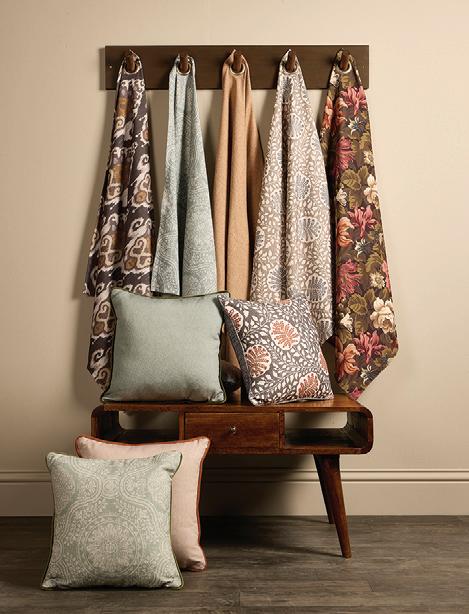
teams real-time oversight of residents’ medication records. The pharmacy’s robust auditing and returns collection processes support full regulatory compliance, while scheduled annual training sessions keep staff confident and up to date with best practice.
OPERATIONAL EFFICIENCY AND COST SAVINGS
A one-pharmacy solution eliminates duplicated processes and frees up valuable staff time. With Care Quality Pharmacy’s dedicated communications team liaising directly with GPs, homes save hours previously spent chasing prescriptions or clarifying medication queries. Interim requests are handled swiftly – often the same day –and returned medicines are collected routinely, further reducing workload and waste.
A PARTNERSHIP BUILT ON TRUST
Perhaps the greatest benefit is peace of mind. Care Quality Pharmacy’s national infrastructure, experienced team and proactive approach mean care-home operators can focus on delivering exceptional care while knowing that every aspect of their medicines management is in expert hands.
In a sector where safety, compliance and resident well-being are paramount, a one-pharmacy solution is not just convenient – it is transformative. Care Quality Pharmacy brings together specialist knowledge, cutting-edge technology and a commitment to personalised support, making it the trusted partner for care homes across the UK.
See the advert on the back cover for further details.
Each year Skopos launch new fabric collections, developed specifically with Care interiors in mind. Specialists in key attributes which help keep homes looking fresh and stylish (soil resist, antimicrobial) interior schemes can easily be pulled together using a mixture of prints, textures and plains. Leading the way at this year’s show, Skopos will be highlighting their new range of printed designs, from the Skopos STUDIO. Available on base-cloths for upholstery, bedding and curtains, the fabric choices have grown, to include a waterproof and antimicrobial velvet upholstery and a textured woven upholstery. Designs from the STUDIO are split into different categories, including stripes, florals, geometric and textures. Skopos can offer a fabric-only service or a full service; with site measure, product manufacture and installation. The Skopos team produce approximately 25,000 made-up items
CareZips® Classic are patented, easy dressing unisex adaptive pants designed for older and disabled people suffering with problems associated with continence, mobility, mental function and cognition. Suitable for persons living in care institutions, receiving care at home or living independently at home, CareZips® Classic enable people to dress themselves or with assistance from carers.
CareZips® Classic feature patented 3-zipper system, which opens the front of the pants from the waist to the knees for quicker access during toileting, continence pads changes and personal hygiene. The forward positioning of the two side zippers lessens pressure on sensitive hip areas, helping to eliminate discomfort. The third zipper facilitates simple full frontal opening for faster more dignified diaper changes, catheter adjustments, personal cleansing and hygiene routines.

CareZips® Classic have many benefits for the older and disabled users and their carers:
• People dressing themselves enjoy the practical functionality and versatility of the CareZips®
Classic, all day comfort and easy garment care.
• People dependent on assisted dressing appreciate quick easy dressing process with less stress, embarrassment and greater dignity offered by CareZips® Classic.
• CareZips® Classic offer practical gains to the carers, helping them to provide better care, whilst reducing physical efforts and saving valuable time.
CareZips® Classic are unisex, available in 6 sizes and 3 practical colours (i.e. black, charcoal and navy). Tapered fit at the ankles gives a tidy appearance. Made from breathable moisture-wicking 4-way stretchy crease-free and easy-care durable fabric, CareZips® Classic are comfortable, practical and conveniently functional.
For more information, contact Win Health Medical Ltd - 01835 864866www.win-health.com
See the advert on page 3 for further information on Win Health’s product range.
Angloplas are a UK manufacturer who specialise in producing dispensers for the health and hygiene industry. Although these are designed to keep the workplace tidy and uncluttered they are, more importantly, built knowing the control of healthcare-associated infections (HCAIs) are a priority for healthcare providers, and who are employing a combination of infection prevention and control strategies, including hand hygiene, cleaning, training and the adoption of new technologies, to tackle the problem. As a result, a wide range of infection control products and technologies are emerging on the market, including antimicrobial technology. Angloplas’ range of dispensers are produced in the world’s first proven
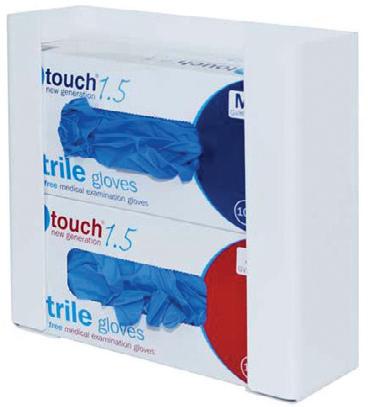
Antimicrobial PVC with silver ion technology and which is exclusive to Angloplas. This helps reduce the risk of cross infection by stopping the growth of bacteria and mould and works continuously for the lifetime of the product, reducing levels of bacteria such as MRSA, E Coli, Legionella, Salmonella and mould by up to 99.99%.
For non-clinical environments Angloplas has recently launched its new Budget Range of products which are made to the same exacting standards as the antimicrobial protected ones but with lower price tags. You can order Angloplas products directly from its website at www.angloplas.co.uk See page 17.
each year, including bed-throws, cushions and pairs of curtains, all manufactured by a highlyskilled team of machinists, cutters and pattern makers; items that are delivered and installed into different contract environments.
As with all Skopos prints, the lead-times are under one week and everything is produced locally, in Yorkshire.
Skopos also offers a Bespoke design service, for statement interiors that require something different. Our design team will work alongside you to develop ideas which can make your caring interior personal, branded and unique.
For samples of any of our collections visit www.skoposfabrics.com
In today’s care sector, where equipment failure can directly impact patient safety and service quality, proactive asset management is nonnegotiable. Enter Assetain, Medaco’s pioneering solution designed to manage the complete lifecycle of patient-handling equipment - from first supply to planned obsolescence.

Launched in August 2025, Assetain delivers three core benefits: comprehensive asset visibility, budgetwise maintenance, and strategic replacement planning. Rather than reactively repairing faulty devices, care homes, NHS Trusts, and SEND schools can now oversee the health of all moving and handling equipment with confidence and clarity.
At its heart lies a meticulously maintained, data-rich register. The programme initiates with a full audit of existing assets; each entry is ported into a dynamic system setting tailored maintenance thresholds, repair-vs-value benchmarks, and clear end-of-life triggers.
Field engineers play an essential role - capturing photographic evidence of faults and functional assess-
ments, which are promptly linked to each record. This approach adds both accountability and immediate insight for stakeholders. Timely alerts are a standout feature. When equipment approaches “no-longer-manufactured” status or reaches its recommended service term, Assetain sends clear notifications - empowering teams to anticipate challenges before they arise. Regular updates of the full asset register ensure stakeholders remain fully informed of the condition and availability of their entire fleet.
Assetain isn’t just maintenance - it’s strategic careasset stewardship that saves time, reduces costs, and safeguards patient well-being. A smart, forward-thinking programme like this helps care providers shift from reactive firefighting to purposeful planning.
In short, Assetain elevates care facility operations into a new era of efficiency and confidence - where every asset is seen, scheduled, and systematically sustained.
www. medaco.co.uk/solutions/assetain/
Consort Claudgen now offers Wi-Fi-enabled low surface temperature heaters that can be controlled through a digital control panel on the heaters or the Consort Connect app. Features include a 7-day timer with 24 daily heating periods, a lock function, open window detection, custom automation, and energy consumption statistics. Additionally, LST heaters with Wi-Fi and occupancy sensor have a self-learning control ability which uses in-built occupancy sensors to

detect and learn a user’s weekly presence in a room. It then creates a heating schedule and automatically warms the room according to the detected or predicted occupancy. When the space is unoccupied, the heater will conserve energy by switching to a setback temperature or frost protection mode.
Consort's website also offers BIM objects for download. See page 17 or 01646 692172 | sales@consortepl.com | www.consortepl.com
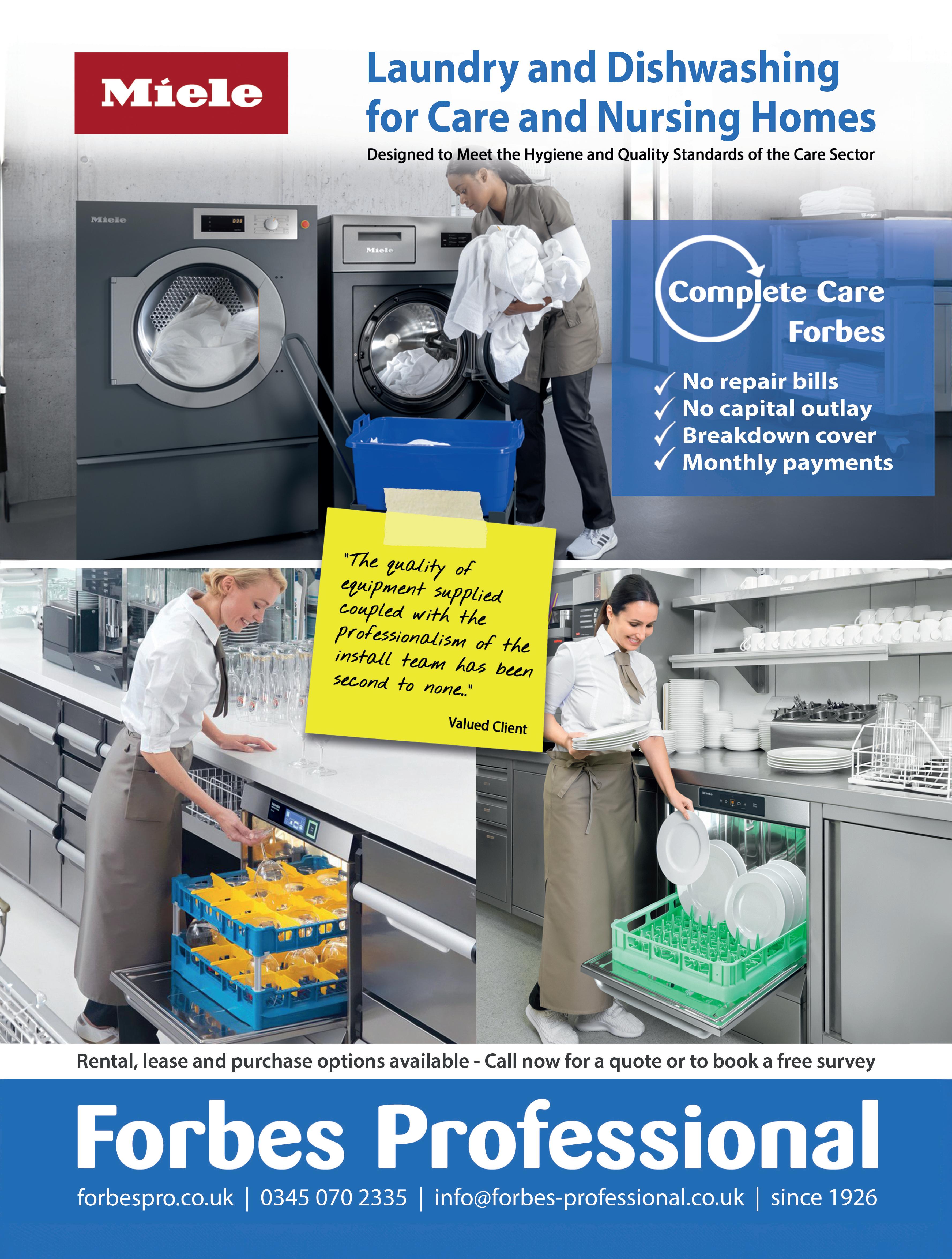

Mobile Kitchens Ltd specialises in the hire or sale of temporary catering facilities and foodservice equipment. Ideal for events or to provide temporary catering facilities during your kitchen refurbishment, our versatile units and equipment offer an efficient and economic solution to the caterers’ needs.
Production Kitchens, Preparation Kitchens, Warewashing Units, Dry Store Units, Cold Rooms and Restaurant Units are available as individual units in their own right or they can be linked together on site to form a complete complex.
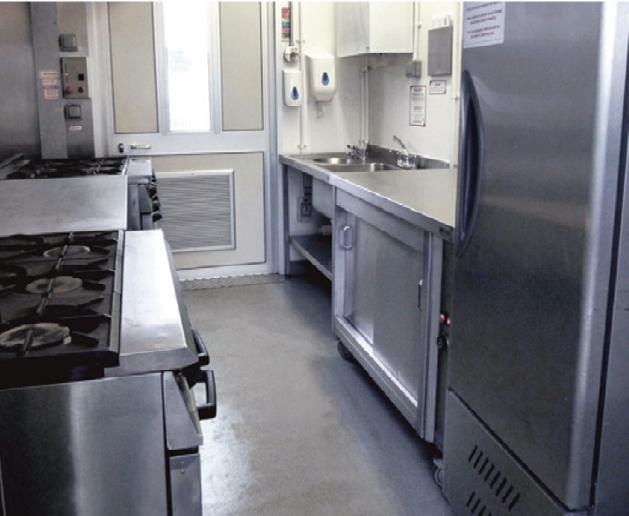
Alternatively, we can offer modular, open-plan facilities, usually for larger, longer-term hires. We offer a free design service, and project management from concept through to delivery and installation on site, plus full technical support throughout the hire period.
Commercial Kitchen and Laundry Solutions (CKLS) are one of the UK's leading suppliers of commercial kitchen and laundry equipment. Whether you are a small sized residential home or large scale nursing home group, CKLS has the expertise and equipment you need to keep your operations running smoothly.

At CKLS, we understand that the success of your business depends on the quality of the equipment you use. That's why we've made it our mission to provide businesses across the UK with the highest quality commercial laundry and kitchen equipment available. We work with only the best manufacturers in the industry to ensure that our customers get the most reliable and efficient equipment possible.
Our commitment to our customers doesn't end with the sale of our equipment. At CKLS, we know that maintenance and repairs are crucial to keeping your equipment functioning at its best. That's why we offer a full range of maintenance and repair services
to our customers, including emergency repair services available 24 hours a day, 7 days a week.
We believe that our success as a company is measured by the success of our customers. That's why we're constantly striving to provide better products and services to help our customers achieve their goals. We're proud to say that our commitment to excellence has earned us a reputation as the go-to provider of commercial laundry and kitchen equipment in the UK.
So, if you're looking for reliable, high-quality commercial laundry and kitchen equipment, look no further than CKLS. With our extensive range of products and services, we're confident that we can help you find the right equipment to meet your needs and keep your business running smoothly for years to come.

By Charlotte McKay, Head Chef at St Quentin Care Homes (https://hmtstquentin.org)
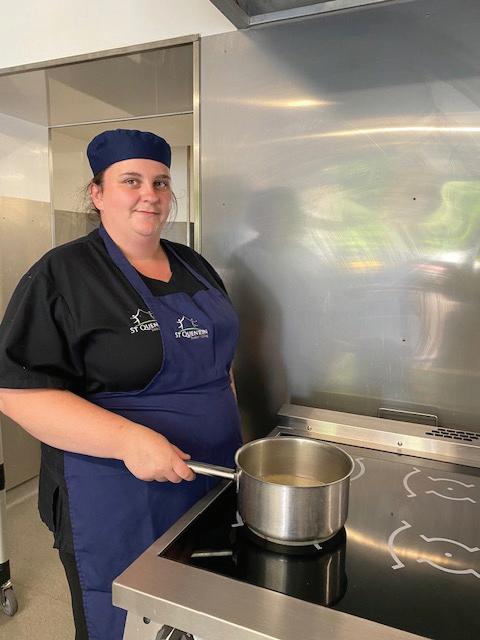
In a care home, catering can be the difference between mealtimes that are anticipated with pleasure and those that are simply endured. Care itself is rightly personalised, tailored to the needs and preferences of each resident. The same principle should apply to the food they eat. Residents and their families are entitled to expect meals which reflect dietary needs, medical conditions, and personal tastes. But delivering that level of personalisation at scale, within budget, is no small task.
The Healthcare Management Trust acquired St Quentin Care Homes almost a year ago and has made significant improvements in care delivery, infrastructure, and leadership. Catering was a big area of focus and has brought tangible results: residents returning for second helpings, heartfelt thanks from families, and a noticeable reduction in food waste. These results haven’t happened by chance; they are the outcome of deliberate choices in how we source ingredients, design menus, and create the overall dining experience.
FRESH INGREDIENTS AND A VARIED MENU
The value of using fresh ingredients over pre-packaged or heavily pro-
cessed alternatives cannot be overstated. Fresh produce boosts nutritional quality, enhances flavour, and increases the likelihood that residents will eat and enjoy their meals.
Variety is equally important. A repetitive or bland menu fails to tempt people to the dining room. Similarly, introducing a rotating weekly menu with diverse flavours and textures, including vegetarian and vegan options, will create something for everyone, which is especially important where care homes support residents of varying ages and cultural backgrounds.
Style should never overtake substance, but presentation matters and plays a vital role in whether a meal is eaten. An unappealing plate can lead to food being left untouched, no matter how nutritious it is.
Small touches make a big difference. Balancing colours on the plate, arranging food attractively, and serving it on crockery that complements the meal will encourage meals to be finished. Even something as simple as offering a platter of sandwiches with varied fillings, so residents first see vibrant colours rather than just bread, can boost appetite and engagement.
Many care home residents are unable to visit restaurants, and for them, mealtimes are often the closest equivalent to dining out. Recreating elements of that experience can lift the mood and turn a necessary routine into a highlight of the day.
Printed menus with clear, attractive typography help residents feel they have real choice and control. For some, reading a menu may even stir
fond memories of past outings and family meals. This small detail reinforces the dignity and pleasure of the dining experience.
Sharing food is a social occasion. In care homes, shared meals can foster community spirit, reduce loneliness, and spark conversation. Making mealtimes engaging and enjoyable benefits both emotional wellbeing and nutritional intake.
This means paying attention to more than just the food. Lighting, music, table layout, and staff interaction all contribute to the atmosphere. A team that works seamlessly from kitchen to dining room by greeting residents warmly, knowing their preferences, and encouraging participation can transform mealtime into a joyful daily event.
Great catering doesn’t happen in isolation. It relies on strong collaboration between chefs, care staff, activities teams, administrators, residents, and families. Open communication ensures dietary needs are met, allergies are avoided, and preferences are respected.
When everyone takes shared responsibility, residents benefit from meals that are not only safe and nourishing, but also deeply satisfying. The catering team gains valuable insight from care staff who know residents well, while residents themselves feel heard and valued.
Ultimately, catering in a care home is about far more than providing three meals a day. It’s about respecting individuality, supporting health, and creating moments of joy. When meals are thoughtfully planned, beautifully presented, and shared in a warm environment, they nourish the body and the mind.
Danielle Smith, registered nutritionist and head of nutrition at Added Value Enterprises Ltd (AVE), explains how nutritional consultancy can enhance the wellbeing of residents in care homes
In care homes, food is far more than a daily routine - it is central to health, comfort, and quality of life. Mealtimes are moments of dignity and social connection, yet the nutritional value of what is served plays a critical role in residents’ wellbeing. As awareness of food and health grows, the sector faces a vital challenge: to move beyond meeting the minimum requirements to embracing nutritional guidance that truly supports residents.
For years, catering has focused on compliance such as reducing salt, lowering sugar and limiting fat. But good nutrition is also about what we add: nutrient-dense ingredients, fresh produce and the creation of recipes that avoid over-reliance on ultra-processed products. Families are asking sharper questions about what’s included in meals and inspectors increasingly recognise the link between diet, health, and resident satisfaction. This is where effective nutrition consultancy makes a difference. Regular menu analysis and assessing how
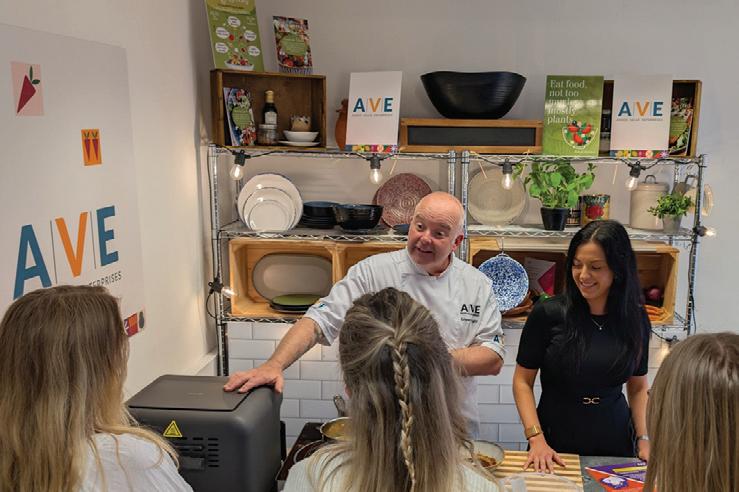
healthy a dish is can highlight where small adjustments can bring big benefits. Bespoke advice ensures meals meet specialist needs ranging from dysphagiafriendly recipes to heart-healthy dishes that promote long-term vitality. Importantly, training equips catering and care staff to understand why nutritious food matters. At AVE, we can provide guidance that is practical as well as strategic: from developing tailored menus to creating engaging wellbeing initiatives such as hydration days or condition-specific workshops. We can analyse menus to assess the nutritional value of each dish and provide advice on how to make improvements. By embedding this expertise, care homes can demonstrate both compliance and genuine commitment to residents’ health and wellbeing.
In today’s landscape, nutritional oversight is not an optional extra - it is a cornerstone of quality care. With residents and families better informed, the homes that embrace guidance will not only meet expectations but exceed them, ensuring food continues to nourish both body and mind.
See the advert on this page for details, visit www.a-v-e.com or
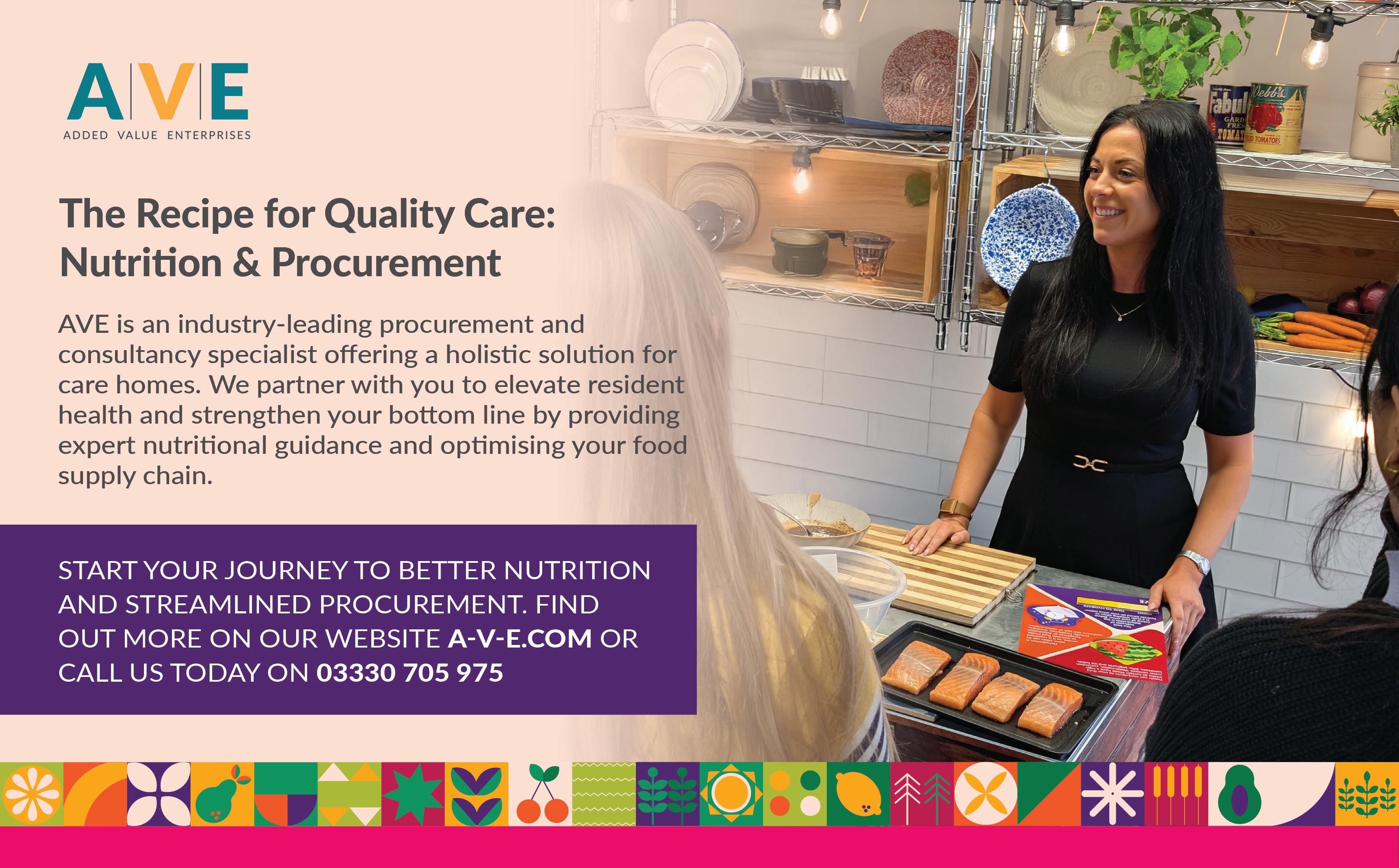
By Gemma Christie, Business Account Manager at Miele

In the care sector, operational decisions carry significant weight. Whilst frontline care rightly takes centre stage, it’s also important to remember that the kitchen plays a vital role in maintaining hygiene, supporting staff efficiency, and ensuring resident wellbeing. Among the many moving parts of the care home kitchen, dishwashing is often overlooked. This is likely because it operates behind the scenes and isn’t seen as a direct part of resident care, yet it’s a key consideration for care homes looking to provide a safe, smooth service.
With multiple meal services each day, the kitchen is one of the busiest areas in a care home. Relying on manual washing not only slows down operations but also increases the risk of hygiene lapses. That’s why investing in the right dishwashing solution is critical.
For care homes looking for reliability, hygiene assurance and longterm value, commercial solutions are the smart choice. Here are five key reasons why investing in a professional dishwashing solution can make a meaningful difference.
WHY DOMESTIC DISHWASHERS FALL SHORT
It’s not uncommon for care homes to rely on domestic dishwashers, especially when budgets are tight. But these machines are rarely up to the task. Designed for occasional household use, they struggle with the frequency and intensity of care home operations. Over time, this can lead to breakdowns, inconsistent results, and even hygiene risks. Commercial dishwashers, by contrast, are built for durability and performance. They’re tested to withstand thousands of cycles and are engineered to maintain consistent cleaning standards, even under intense pressure. For care homes, this means fewer disruptions, lower
long-term costs, and greater piece of mind.
HYGIENE RESULTS YOU CAN TRUST
It’s no secret that infection control is always a top priority in any care or medical settings, especially with residents that are often more vulnerable to illness, and where outbreaks can have serious consequences. Dishwashing equipment can help to fight against these infections and play a big role in preventing cross contamination. But only if it’s up to the job.
High-performance commercial machines, such as the MasterLine range by Miele Professional offer disinfection-grade wash cycles that eliminate harmful bacteria and pathogens. Some models also feature advanced drying systems that remove the need for manual handling, further reducing the risk of contamination. These features aren’t just nice to have, they’re essential for maintaining compliance and protecting residents.
SPEED AND EFFICIENCY IN THE KITCHEN
Care homes run on tight schedules. Mealtimes are fixed, and delays can have a knock-on effect across the day. That’s why turnaround time is a key consideration when selecting dishwashing equipment.
Modern commercial dishwashers can complete a full cycle in as little as five minutes, ensuring that clean items are always available when needed. This reduces the need for excess crockery and helps staff stay focused on resident care rather than kitchen logistics.
Supporting staff and reducing their workload
The right equipment doesn’t just improve hygiene standards, it also helps to support staff wellbeing. In a sector where recruitment and retention are constantly ongoing challenges, anything that eases the daily workload is a welcome investment.
User-friendly controls, intuitive interfaces, and automated features such as detergent dosing or drying programmes can make a real difference to staff efficiency and satisfaction. When equipment actually works with your team, and not against them, it frees up critical time and energy for what matters most, caring for their residents.
A LONG-TERM INVESTMENT
While the upfront cost of commercial dishwashing equipment may be higher, the long-term benefits are clear. Reduced maintenance,
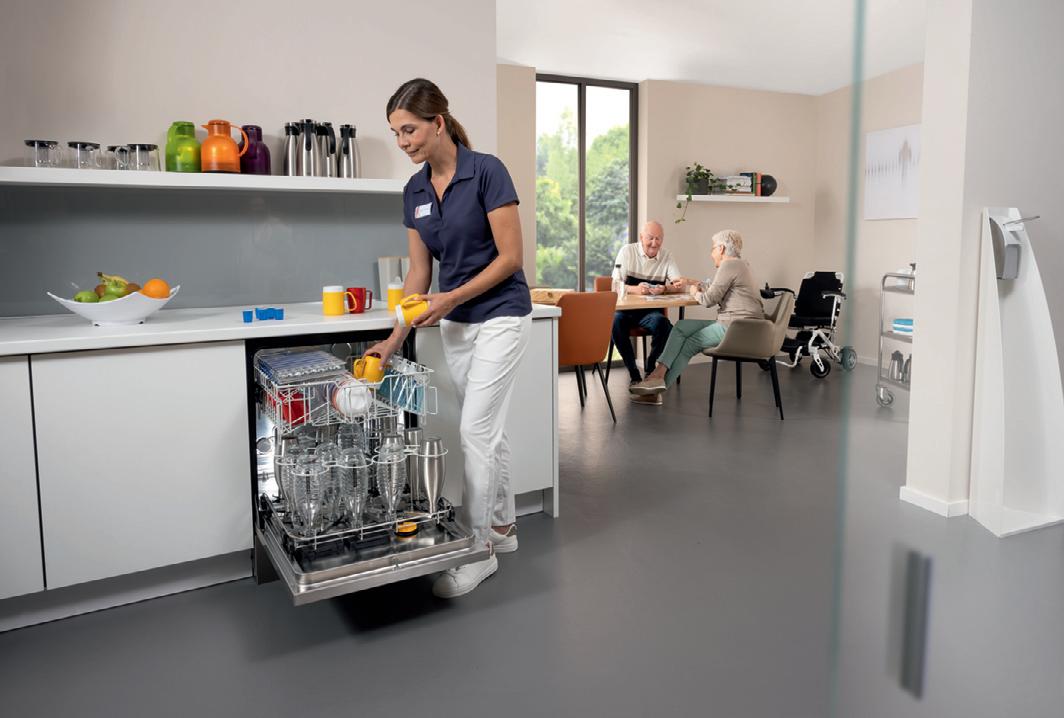
lower energy and water consumption, and extended service life all contribute to a more sustainable and cost-effective operation. For example, Miele Professional’s MasterLine dishwashers can complete a full cycle in just 5 minutes and use as little as 5.0 litres of water per cycle, depending on the model. Their energy-efficient design helps reduce utility costs while maintaining top-tier hygiene performance. Some dishwasher manufacturers offer extended parts availability and nationwide service networks, ensuring that support is always close at hand. Miele Professional offers spare parts available for up to 15 years after production ends and a UK-wide service network with a 90%+ first visit fix rate meaning that care homes can rely on consistent, expert support when it matters most.
Dishwashing may not be the most visible part of care home life, but it’s one of the most vital. By investing in the right equipment and processes, care homes can enhance hygiene, improve efficiency, and create a safer, smoother environment for both residents and staff.
To explore how Miele Professional's commercial dishwashing solutions can enhance your care home, please visit: https://www.miele.co.uk/p/retirement-care-homes-4053.htm
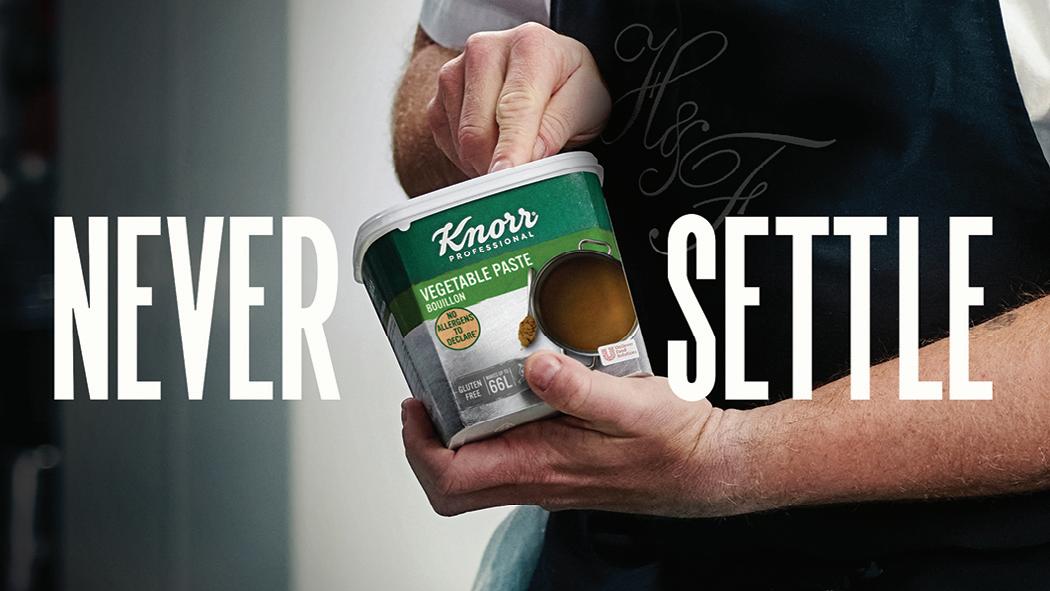
In the care sector, food is more than just nutrition - it’s comfort, dignity, and a way of bringing joy to residents every day. That’s why chefs can’t afford to compromise. From flavour and safety to consistency and versatility, every ingredient has to deliver. When it comes to bouillon, Knorr Professional refuses to settle for anything less than the best and so do the chefs who use it.
Knorr Professional Bouillon is the UK’s number one bouillon brand*, trusted in kitchens nationwide for its rich depth of flavour, outstanding versatility, and chef-trusted consistency. It’s made to work hard in every service, withno allergens to declare¹ options that give chefs peace of mind when catering for residents with diverse needs. NEVER SETTLE FOR BLAND DISHES
As residents age, their sense of taste can diminish. That’s why flavour has to work harder in care - it’s not just about nutrition, it’s about enjoyment. Knorr Professional Paste Bouillon brings bold, balanced flavour that cuts through reduced senses, ensuring dishes remain satisfying and memorable.
Whether it’s used as a base, rub, seasoning, glaze, or marinade, it delivers the same consistent, chef-approved results. From soups and stews to roasted vegetables and marinades, this is one product that performs across the menu - helping chefs adapt quickly without losing quality.
NEVER SETTLE FOR UNCERTAINTY
In care kitchens, allergen safety isn’t negotiable. Theno allergens to declareoptions in Knorr Professional Paste Bouillon make it simple to create inclusive dishes without sacrificing flavour. This helps reduce the risk of cross-contamination and ensures every resident can enjoy the same great taste.
For Knorr Professional Care Ambassador Preston Walker, that confidence is invaluable:
“With ‘no allergens to declare’ options available across the range, Knorr Professional Paste Bouillon is easy to introduce into dishes that need to be suitable for varying needs and preferences,” says Preston. “It gives me peace of mind that I can create flavour-packed dishes for all residents, without excluding anyone due to allergens.”
NEVER SETTLE FOR INCONSISTENCY
Care kitchens can be high-pressure environments, where time is short and the need for consistency is constant. Knorr Professional
Bouillon’s paste format makes it easy to store, measure, and use, ensuring the same flavour profile in every batch. Its consistent yield also helps with budget control - delivering premium quality without waste.
Preston sums it up simply:
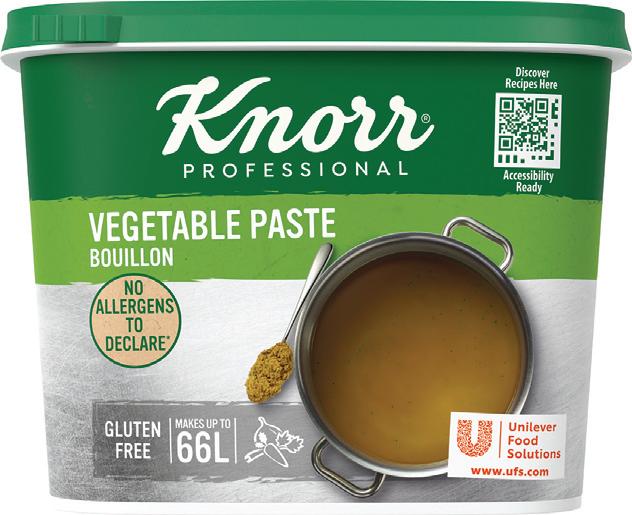
“We use the Knorr Professional Bouillon paste range for one simple reason - it delivers. Quality, flavour, consistency, and the confidence of knowing exactly what you’re going to get, every time.”
NEVER SETTLE FOR SECOND BEST
Every plate in a care home matters. It’s an opportunity to provide comfort, joy, and nourishment - and that means every ingredient has to earn its place. With Knorr Professional Bouillon, chefs can be sure they’re serving the very best in flavour, safety, and reliability. Because when it comes to care catering, settling for less is never an option.
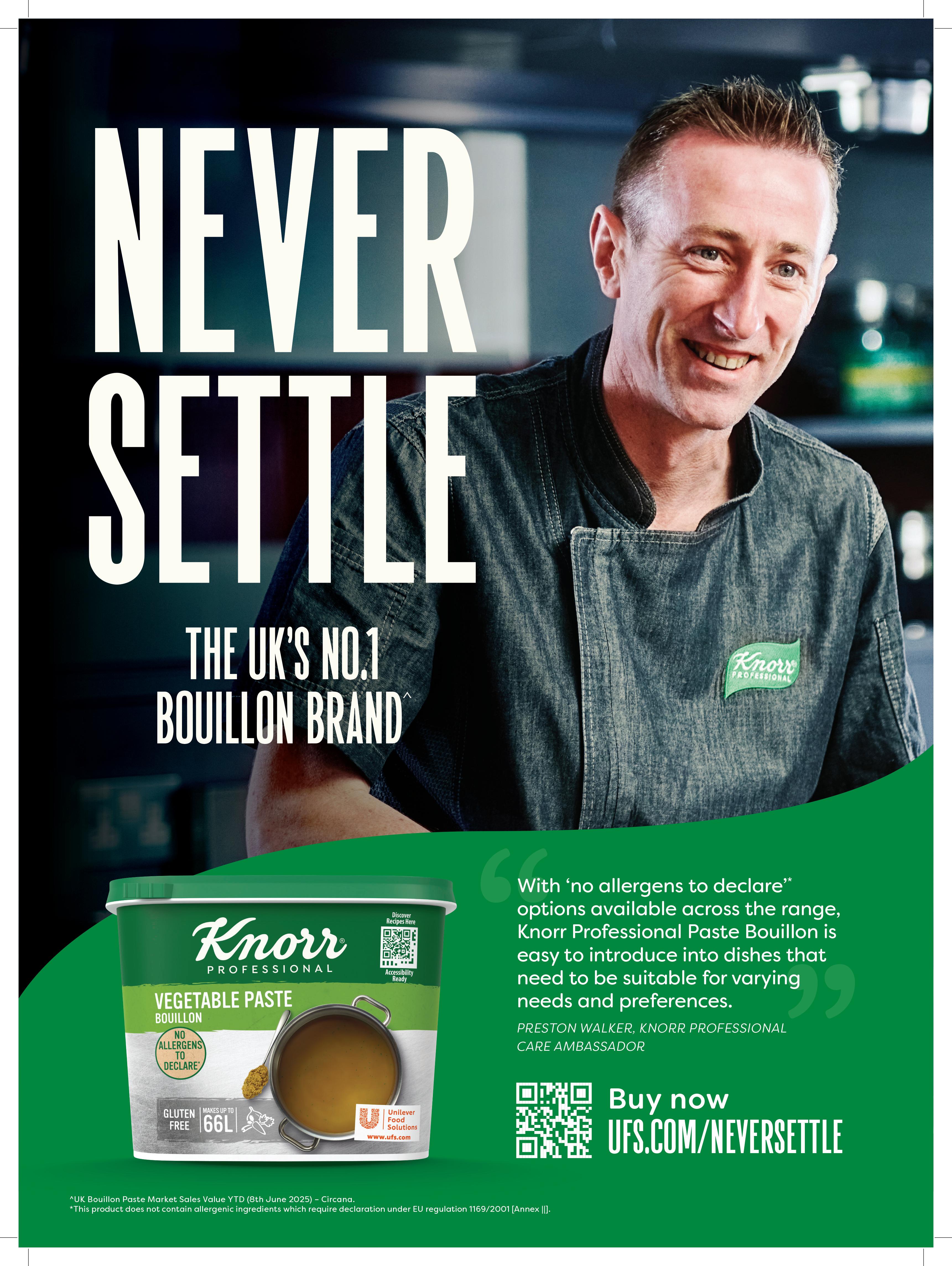
Care home budgets are under mounting pressure. Food supply constraints, inflation, and rising labour costs are combining to create a perfect storm for operators already working to tight margins.
The British Retail Consortium’s latest survey paints a concerning picture: 85% of retailers have raised prices in response to increased costs, fuelled by rises in employer National Insurance contributions and the National Living Wage. In the catering sector, which is heavily dependent on lower-wage roles, these changes are having a pronounced impact.
The Office for National Statistics’ July CPI figures show food inflation at 4.9%, with forecasts suggesting this could reach 6% by the end of the year. According to food procurement expert allmanhall’s Managing Director, Oliver Hall says:
“Based on recent and forecasted inflation spikes, care groups may want to revisit what they have budgeted for annual food inflation for the coming months. allmanhall consistently outperform inflation with price rises lower than inflationary rates, ensuring every pound of catering spend goes as far as possible.”.

Global factors are adding further uncertainty. Extreme weather patterns are disrupting crop yields and threatening food supply chains. The resulting price volatility is not limited to raw ingredients - distribution, packaging, and processing costs are also climbing.
Faced with these pressures, some care providers may be considering outsourcing catering as a cost-saving measure. However, as Oliver cautions:
“Pause before you add a management fee on top of rising labour costs on someone else’s payroll.”
Just because you eat less, or eat differently, it doesn't mean you should settle for less.
At Food Untethered, we believe that everyone – regardless of how they eat –deserves access to real, organic, and nourishing food. Whether you are tubefed, or simply need liquid nutrition on the go, our meals are made with care, using nothing artificial and held to the highest of safety standards.
We’ve launched our first three meals: a Coconut & Banana Smoothie, a Carrot & Coriander Soup, and a Mexican Bean Stew. Each is packed with whole ingredients, made for both taste and tolerance, and suitable for use orally or via a feeding tube.
But this is just the beginning. Over the next year, we’re releasing a full range of meals that can be consumed hot or cold, snacks, smoothies, and drinks –designed with real people, real needs, and real lives in mind.
Instead, the focus should be on smarter procurement strategies that deliver sustainable, long-term cost control.
Taylor & Taylor Care provide a strong example. Partnering with allmanhall, they benefit from comprehensive supply chain management, proactive supplier negotiations, and regular consultative advice - all designed to keep costs down without compromising quality.
“From day one, the care and attention provided by allmanhall has been exceptional… I’ve been impressed by the savings we’ve already seen, the flexibility regarding suppliers and by the excellent quality.”
Click here for the full video case study:
https://www.youtube.com/watch?v=NkroiOj26fs&t=1s
In today’s climate, expert food supply chain management is more than a support service - it’s a necessity. By tracking every penny of spend, identifying efficiencies, negotiating competitive pricing, and managing suppliers, care homes can protect their budgets while maintaining quality for residents.
As Oliver concludes:
“The effects of Government policy will likely be felt in the form of higher food prices in the coming years... choices made today will play a pivotal role in shaping the future of food security”.
With the right partner, care groups can ensure good food remains affordable, responsible, and sustainable - because quality meals for residents shouldn’t cost the Earth.
See the advert on the facing page for more information.


Our food is safe, shelf-stable, recyclable, and above all, human. It's not synthetic formula. It's not baby food. It’s real food, reimagined for different appetites.
If you or someone you care for lives with dysphagia, is tube-fed, or simply needs an easier way to stay nourished, we’re here to help.
Call us today – we’re a small team, and we love to talk. Whether you’re new to this or a seasoned pro, we’ll help you find something that works.
You don’t need to compromise.
You just need food that works for you.
Food Untethered
Real food. For every way of eating. www.fooduntethered.com
Please see our advert below.

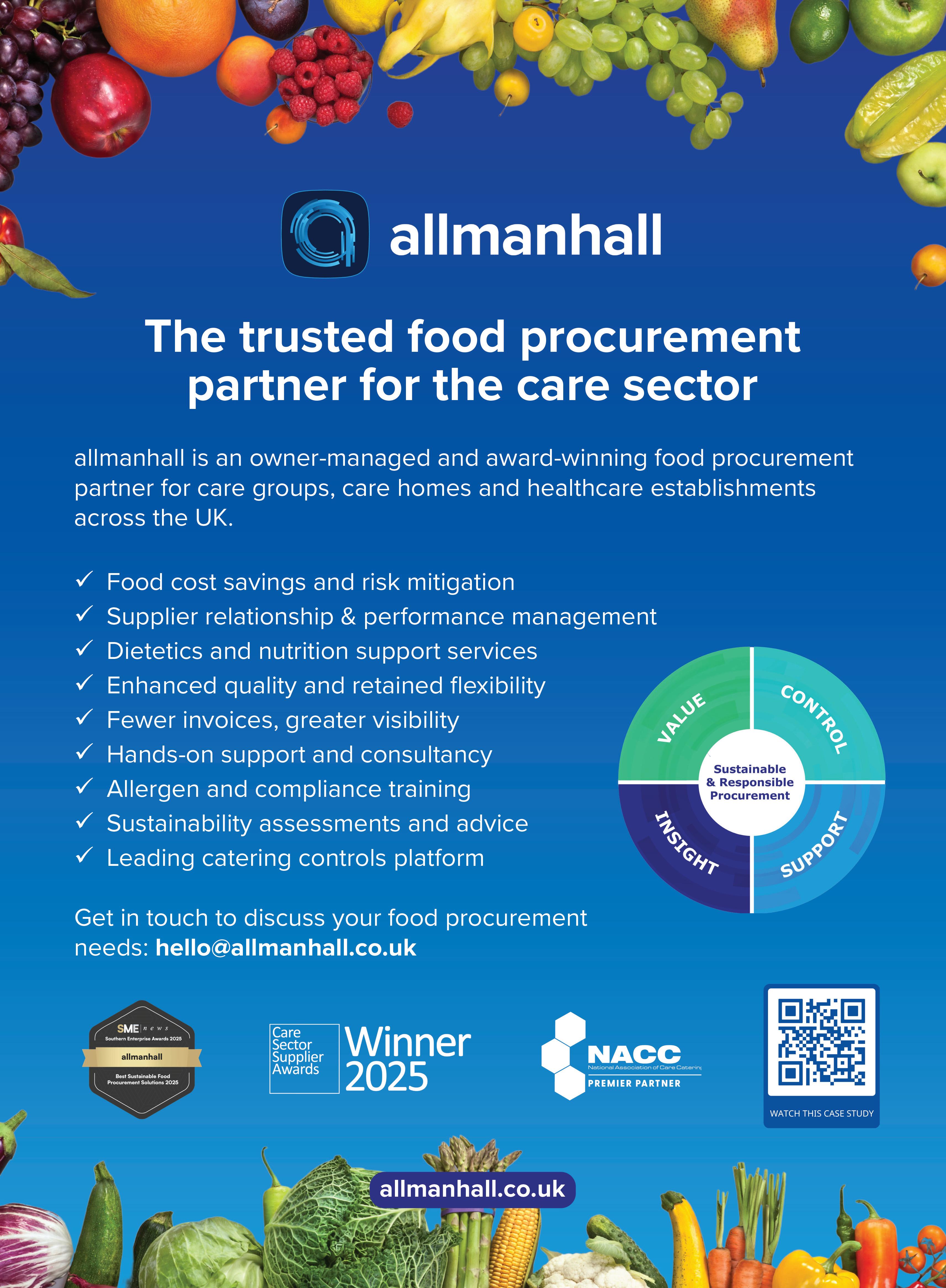
Managing laundry in residential care and nursing homes presents unique challenges that go far beyond a typical household wash. With infection control protocols, personalised clothing care, and the sheer volume of linens and garments to process daily, choosing the right laundry solution is crucial for both operational efficiency and resident wellbeing.
Care homes typically process between 1-1.5kg of laundry per resident per day – including personal clothing, bed linen, towels, and communal textiles. For a 40-bed facility, that's approximately 2,800kg of laundry each week. This volume demands robust systems that can maintain hygiene standards whilst being kind to delicate fabrics and ensuring residents' personal items don't go astray.
In-House vs Commercial Laundry Services
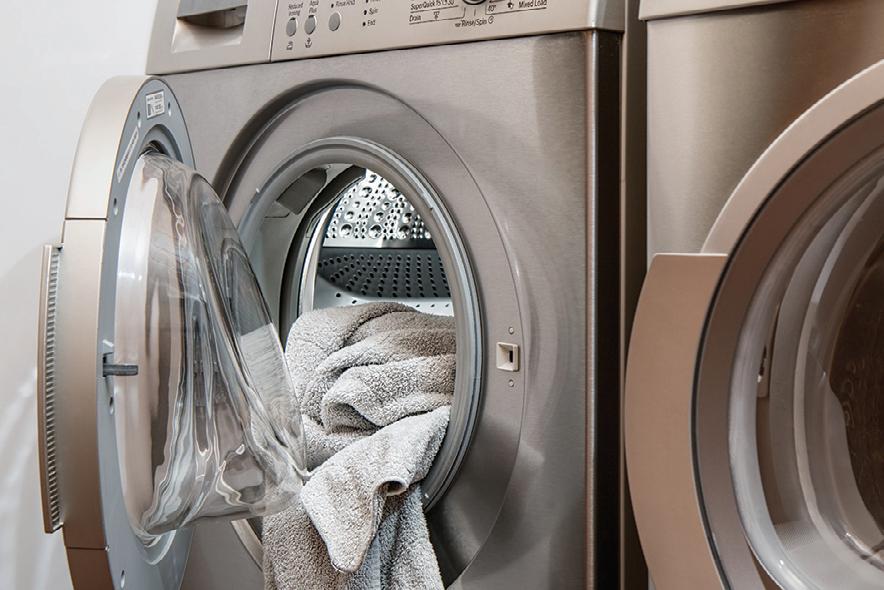
Many care homes face the fundamental decision between managing laundry on-site or outsourcing to a commercial service. In-house laundry offers greater control, faster turnaround times, and can be more cost-effective for larger facilities. It also allows staff to respond quickly to accidents or spillages – a common occurrence in care settings.
However, commercial laundry services bring industrial-grade equipment, specialist infection control processes, and can free up valuable staff time. They're particularly attractive for smaller homes where the capital investment in commercial machines may be prohibitive.
The Care Quality Commission emphasises that laundry procedures must effectively prevent cross-contamination. Modern barrier washers, which separate 'dirty' and 'clean' sides, are increasingly becoming the standard in care homes. Thermal disinfection – washing at 65°C for at least 10 minutes or 71°C for at least 3 minutes – remains the gold standard for destroying pathogens.
Water-saving technologies have improved dramatically, with modern machines using 40% less water than older models whilst maintaining infection control standards. This not only reduces environmental impact but also cuts utility costs significantly.
PROTECTING RESIDENTS' DIGNITY
Personal clothing forms an important part of residents' identity and dignity. A good laundry solution must include robust tracking systems –whether through sewn-in labels, heat-seal tags, or RFID technology – to ensure Mrs Johnson's favourite cardigan doesn't end up in Mr Patel's wardrobe.
Some homes are now investing in smaller, dedicated machines for delicate items, allowing woolens and special garments to receive appropriate care rather than being hand-washed or sent home to families.
Your laundry solution should support, not burden, your care staff. Ergonomic equipment placement, clear workflow design, and adequate training reduce physical strain and processing time. Some modern systems include automated folding or pressing equipment, which can significantly reduce labour costs and repetitive strain injuries.
As the sector continues to professionalise, laundry management increasingly reflects a care home's overall standards. Whether you opt for an on-site facility or outsourced service, the key is ensuring your solution meets infection control requirements, protects residents' belongings, and integrates smoothly into your daily operations.
The right laundry system isn't just about clean clothes – it's about maintaining the dignity, health, and comfort of those in your care.

For over 60 years, Fowler UK has been proud to support the care sector with dependable commercial laundry and catering equipment, backed by expert service that puts people first. As a family-run business, we understand the pressures care providers face, and we’re committed to delivering solutions that keep vital operations running smoothly.
From supply and installation of equipment, ongoing servicing and repairs, detergent packages, right through to our in-house CAD design team, we offer a ‘one-stop-shop’ solution for all of our clients laundry and kitchen facilities.
Reliability and customer service the heart of what we do. Our fast response times and high first-time fix rate mean care providers can trust us to minimise downtime and keep essential services running without
interruption. By stocking a vast range of manufacturer parts on our vans and in-house, we’re able to resolve issues quickly and effectively.
Beyond equipment sales, we support care facilities with comprehensive compliance and maintenance services such as gas safety inspections, preventative maintenance visits, duct cleaning and kitchen deep cleaning. This all-in-one approach provides peace of mind for our customers, ensuring they can focus on delivering high standards of care while we take care of the rest.
“Supporting the care sector has always been central to our business,” said William Fowler, Director at Fowler UK. “We know how important reliable equipment is for both residents and staff, and we’re proud to play our part in helping care homes provide safe, efficient, and welcoming environments.”
With a proven track record, family values, and a commitment to service, Fowler UK remains a trusted partner for care providers nationwide.
We’d be delighted to discuss how Fowler UK can support your facility.
See the advert on this page for further information.


Infection control remains a vital concern in care homes, where laundry plays an essential role in preventing the spread of harmful pathogens. With the Care Quality Commission continuing to raise expectations through a more rigorous inspection framework, laundry operations must meet high standards for both hygiene and regulatory compliance. Forbes Professional is helping care providers across the UK achieve exactly that.
Many care homes still rely on domestic washing machines that are ill-suited for the demands of a clinical environment. These machines often lack the ability to maintain the thermal disinfection temperatures required in care settings and are not compliant with WRAS Category 5 regulations. In addition, domestic models are not built for the volume of laundry processed in care homes, leading to higher operational costs, increased breakdowns, and invalidated warranties.
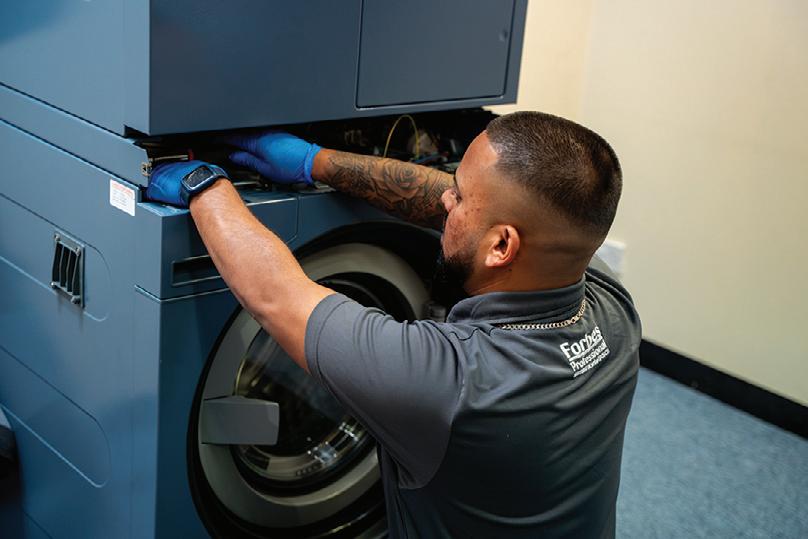
Forbes Professional supplies Miele commercial laundry equipment that is purpose-built for healthcare environments. These machines offer validated thermal disinfection cycles and include Type A air gaps for full WRAS compliance. Forbes also offers high-performance detergents which can be used in conjunction with the Miele appliances to deliver a comprehensive solution that supports effective infection control even at lower temperatures.
Some care operators have explored ozone-based disinfection as an alternative. While ozone can be effective, it introduces additional responsibilities around safe use and regulatory compliance. Systems must be carefully managed to mitigate potential risks to staff and residents. Forbes offers tried-and-tested alternatives that eliminate complexity while delivering proven results in a care environment. A major differentiator for Forbes is the company’s nationwide service infrastructure. They understand that equipment failure in a care home laundry room can quickly escalate into a serious operational issue. To minimise disruption, Forbes provides same- or next-day engineer call-outs as standard. Their extensive team of qualified field engineers and well-stocked service vehicles ensures swift, expert support across the UK.
Forbes also offers comprehensive rental and service contracts that include all maintenance and repairs, helping care homes manage costs and reduce administrative burden. These end-to-end solutions provide care operators with peace of mind, knowing their laundry systems are compliant, efficient, and fully supported. By partnering with Forbes, care homes benefit from expert guidance, market-leading equipment, and dependable service; ensuring hygiene standards are met and residents are protected. forbespro.co.uk | info@forbes-professional.co.uk | 0345 070 2335
SOUTHERN Contracts is one of the UK’s leading suppliers of industrial laundry, catering and commercial cleaning equipment.
Founded in 1964 to initially supply and maintain commercial cleaning equipment to the marine industry, we have since grown to become a well-respected and trusted partner to leading manufacturers.
We have consistently been the top performing Laundry Partner to Electrolux Professional and again achieved their top Laundry Partner Award for 2024. We’ve now won this accolade consistently for well over 20 years.

Now in our third generation and still very much a family run business, we are proud to now be a global supplier of not only laundry equipment, but with knowledge gleaned over the years, we are also a go-to company for professional kitchen appliances and commercial cleaning equipment. With our knowledge of most market products, we pride ourselves on delivering the very best solutions and service to our customers.
Already working for many of the national Care and Nursing Homes, as well as the hospitality industry such as hotels, restaurants and holiday parks, we understand the importance of keeping ‘down time’ to a minimum and by keeping in stock the leading commercial washing machines, tumble dryers and cleaning equipment we can sometimes just swap machines over to keep your business up and running.
We are able to offer independent and unbiased advice to ensure your purchase precisely meets your
requirements and budget, across a complete array of different products and models. Our expert team of technical staff are on hand to ensure your business is supported through every aspect of your purchase or rental agreement.
From advising on current government standards (eg. infection control for commercial washing machines and meeting government legislation for kitchen appliances) our team fully support you throughout the whole journey, from initial advice to delivery, installation, customer training, ongoing maintenance, service and repair. We hold many accreditations for safety and service excellence, providing peace of mind to all our customers, whether existing or potential.
For more information regarding our services for :
- Commercial laundry equipment
- Commercial kitchen appliances and warewashing/dishwashing
- Commercial cleaning equipment
Please visit our website at southerncontracts.co.uk and see previous projects we’ve worked on and our enviable testimonials received from happy clients across a plethora of sectors.
Contact us now on 03301 222888
Follow us on : Facebook, Twitter, Instagram and LinkedIn
See the advert on the previous page for information.
At PDS, we understand the challenges that come with managing laundry in a care home. From bedding, towels and tablecloths, to cleaning the clothes of residents, we appreciate that you need a care home laundry repair service and care home laundry equipment you can rely on.
Here at PDS, we provide care home laundry equipment to suit the needs of your setting. We offer many big-name industrial brands such as Alliance, Electrolux, Miele, Girbau, Grandimpianti and Schulthess.
As your trusted care home laundry repair services partner, we can help you with more than just supplying equipment. Our care home laundry services include laundry consultations, project design and management, equipment supply and installation, spare parts and more.
Our care home washing machines range from 6kg to 30kg drums for small to medium-sized care settings, and from 26kg to 40kg ones for larger care homes with more demanding laundry needs. We offer a full range of care home laundry equipment to meet your needs. Our equipment includes:
• Washing machines
• Tumble dryers
• Stacked equipment
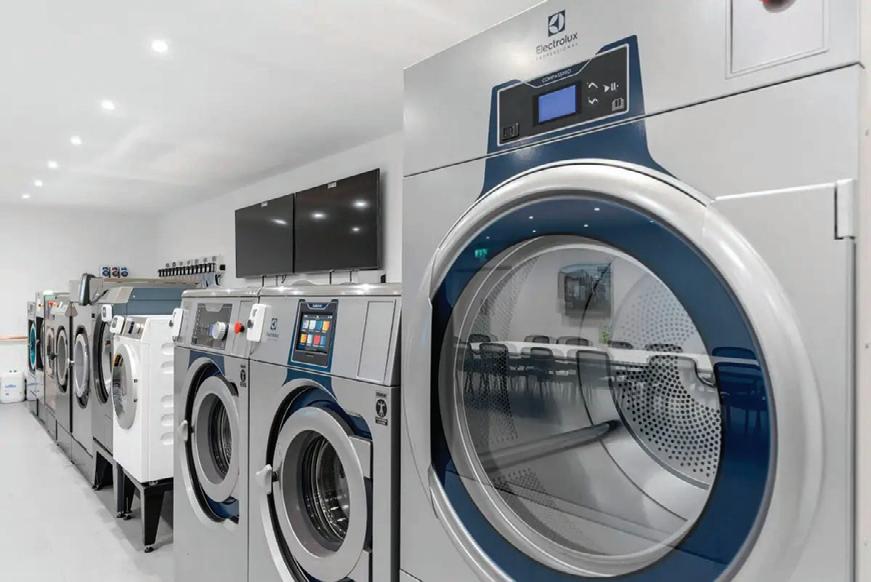
• Ironers We supply everything from compact care home washing machines to larger ironers and stacked systems, tailored to suit your available space, daily routines and laundry demands. Our aim is to make laundry simple and efficient, so your team can focus on providing the best care for your service users.
With more than 30 years of experience, our in-house engineers offer expert support nationwide. Wherever you’re based, we’re here to keep your laundry equipment performing at its best.
If you run or manage a care home and are looking for a care home laundry repair services partner, then look no further than PDS. We’ve been helping care homes just like yours since 2007 and are one of the most trusted suppliers of care home laundry repairs and care home laundry equipment. We are here to help keep your care home running smoothly. Please get in
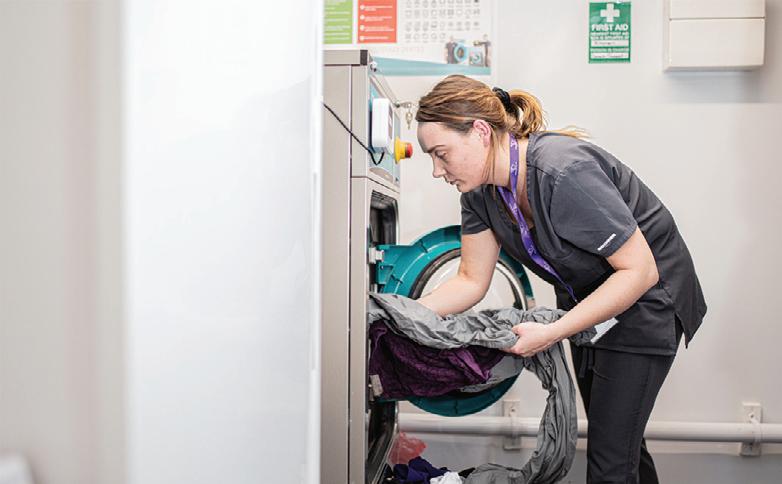

We

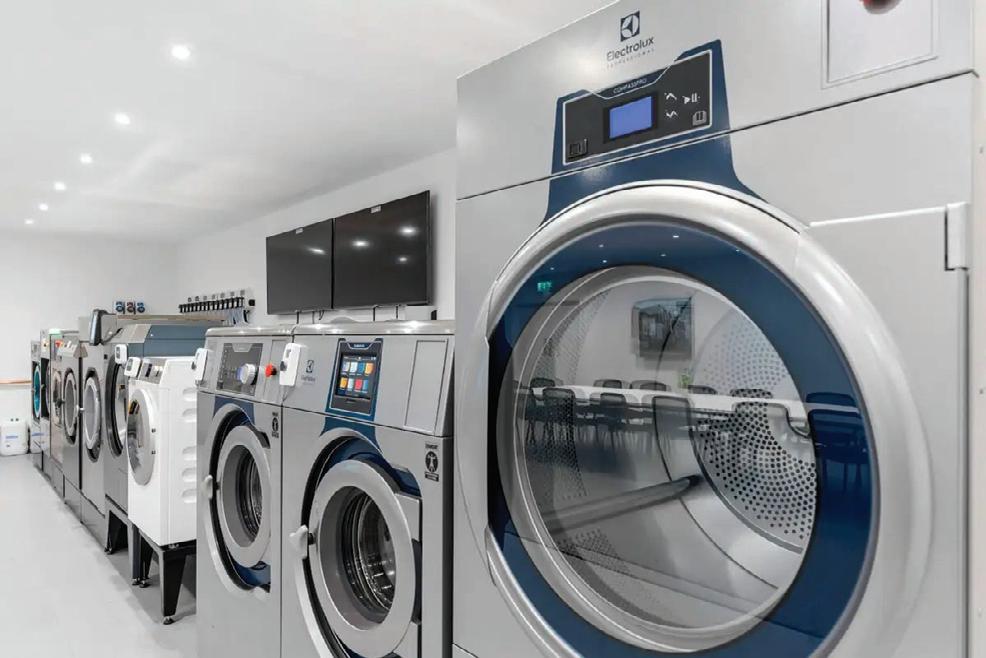
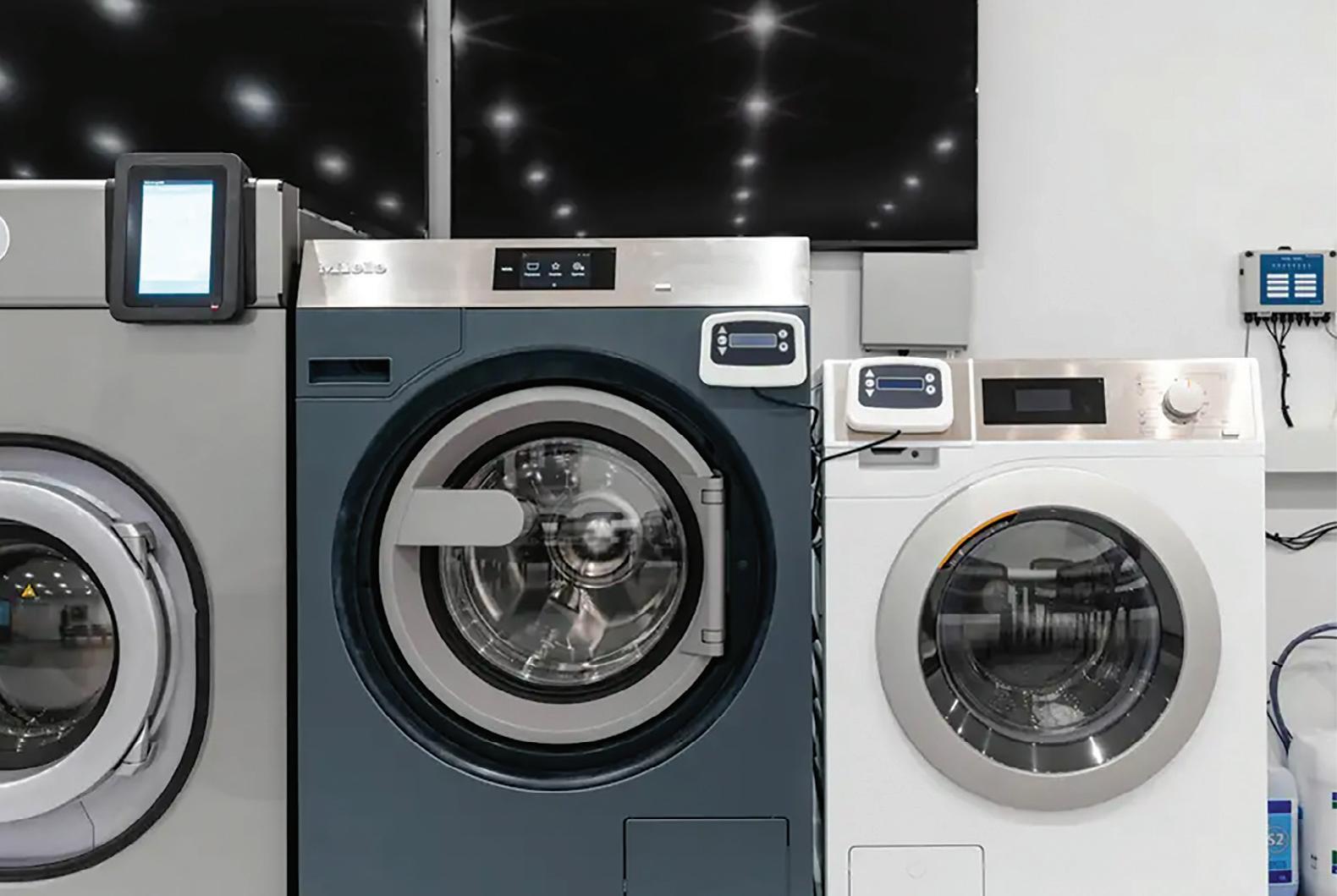

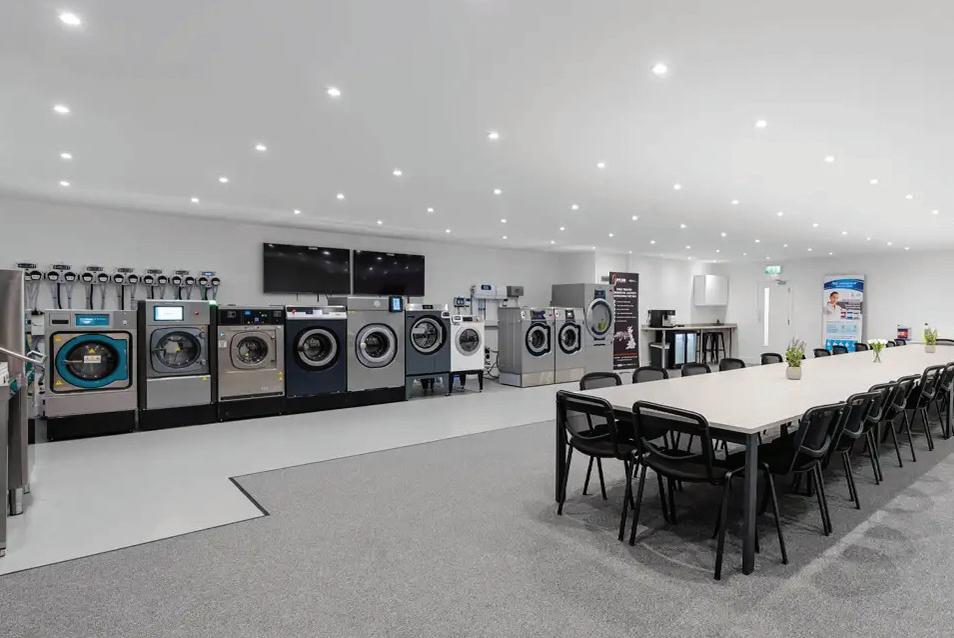

•
•

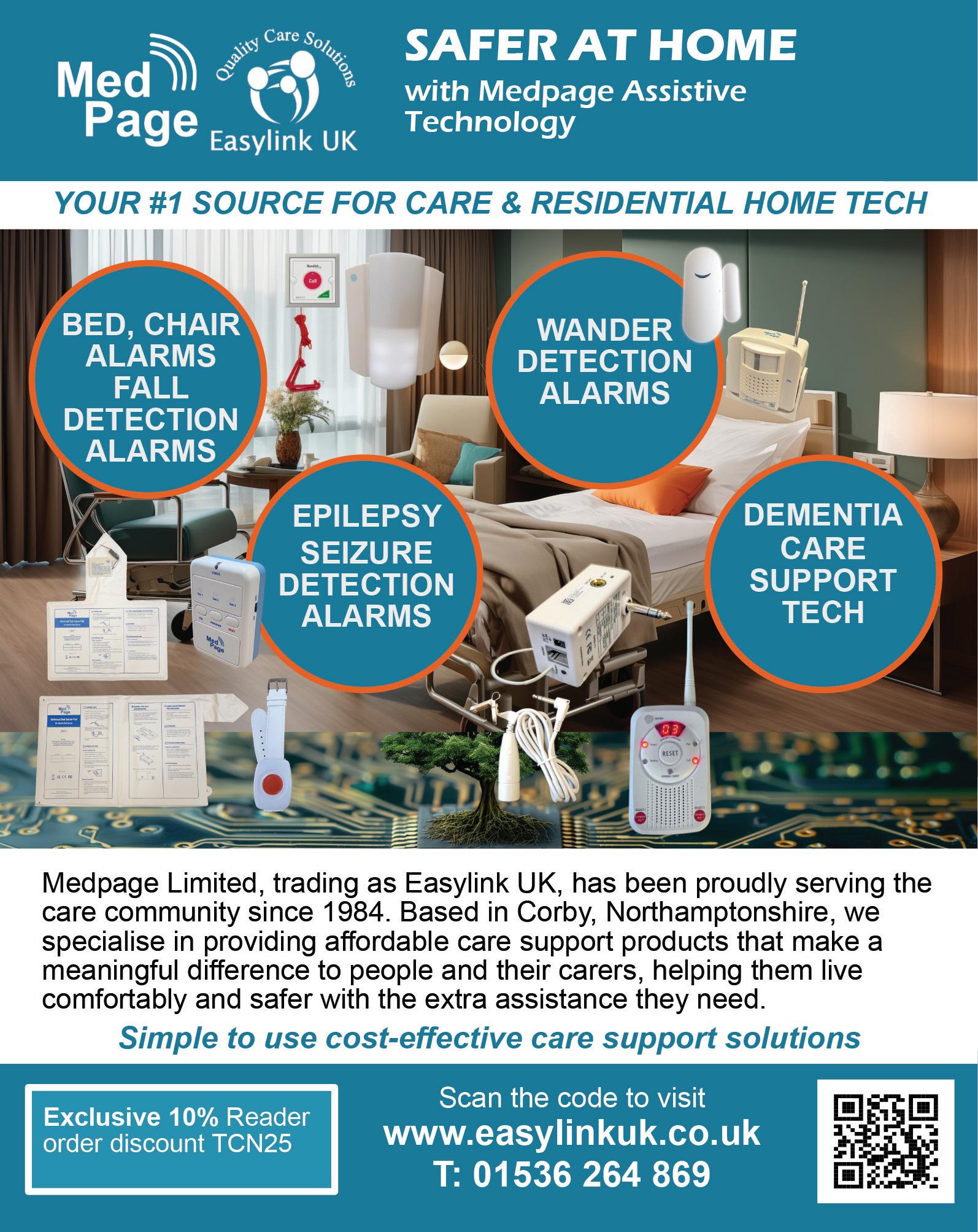
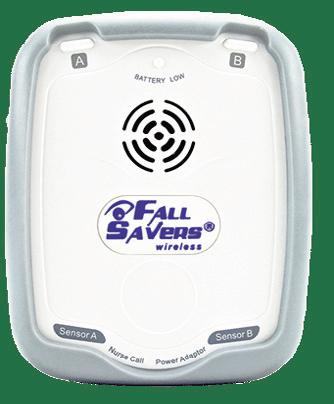
Eliminate all
with our new generation falls management solutions! Upgrade your falls programme with the latest technology from Fall Savers®. The NEW Fall Savers® Wireless eliminates the cord between the monitor and sensor pad. This results in less work for nursing staff, improved safety for patients and reduced wear and tear on sensor pads. Wireless advantages include the ability to use one monitor with two sensor pads simultaneously and support for many new wireless devices.
FEATURES

BENEFITS INCLUDE:
for patients; less work for staff Bed and chair pads available One monitor works with two sensor
Smart Notes helps you create accurate, detailed notes, using AI to write up forms in moments and and deliver them directly into Access Care Planning. That means less time writing, and more time with the people who matter most.
Access Smart Notes key features and benefits:
• Save thousands of pounds every year on Care Assessments without a drop in quality.
• Capture detailed notes quickly and effi-

ciently in the moment.
• Reduce errors and missed details with templates customised to your service
• Integrated with Access Care Planning for real-time updates saving hours of admin time.
• Built-in AI accuracy to streamline the documentation process to reduce risks and improve the quality of your notes
• Full audit trail for peace of mind and transparency
Visit www.theaccessgroup.com
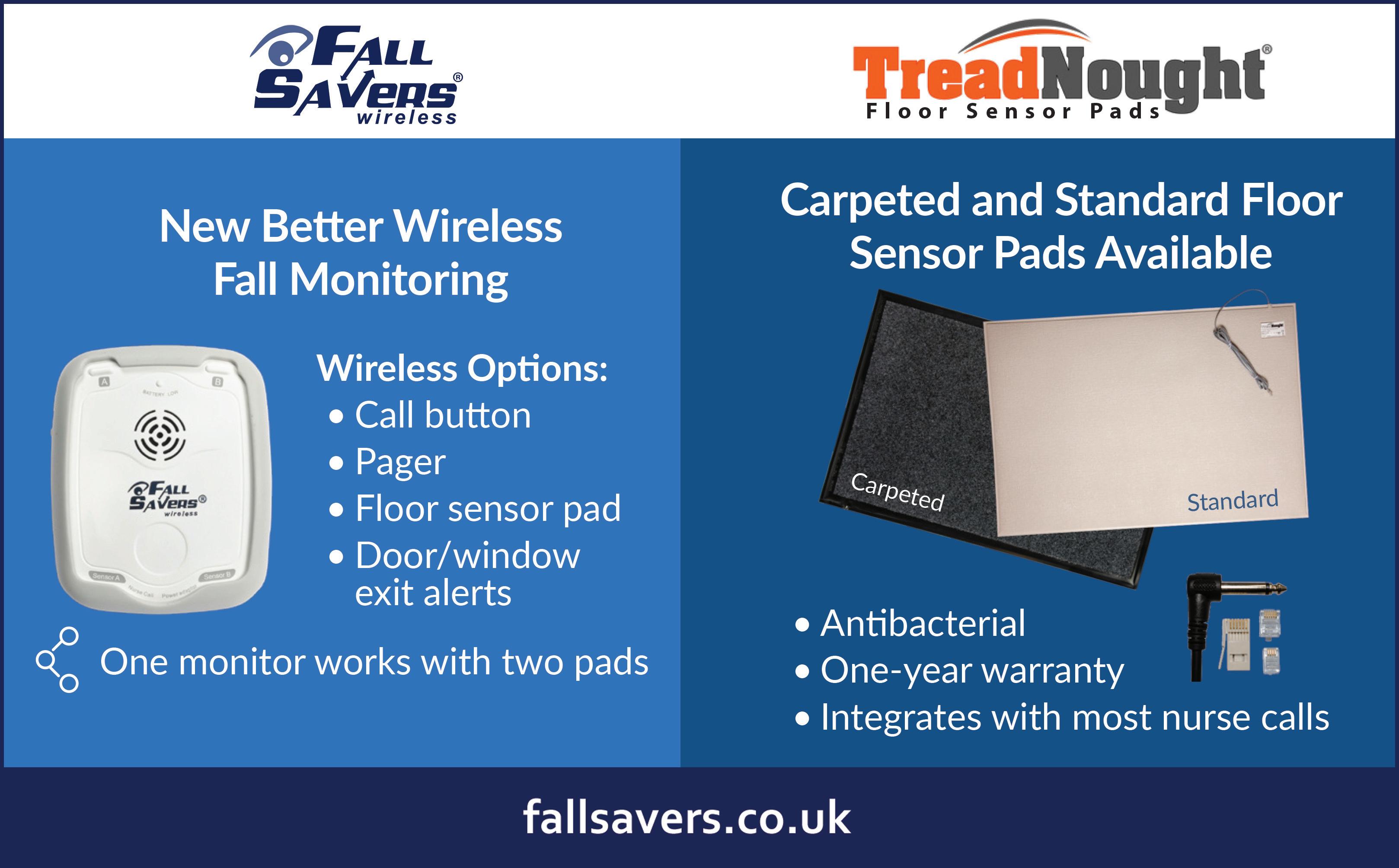
Falls are a significant concern for vulnerable individuals, especially seniors and patients at risk. Medpage, a leader in assistive technology, offers a range of cuttingedge products designed to enhance safety and provide peace of mind for caregivers and families. Here’s an in-depth look at some of their standout solutions: MPRCG1 (2023) BED LEAVING DETECTION ALARM WITH CAREGIVER RADIO PAGER
The MPRCG1 is a comprehensive system tailored for fall prevention in domestic, commercial, and NHS care settings. This all-inclusive kit includes a bed pressure mat sensor, a BTX21-MP alarm sensor transmitter, and an MP-PAG31 radio pager. The system is designed to alert caregivers when a patient leaves their bed, reducing the risk of falls. Key features include:
Wireless Alerts: Notifications are sent to the caregiver’s pager via tone or vibration.
• Customizable Alarm Delays: Options for instant, 15-minute, or 30-minute delays. Durable Design: Antimicrobial and disinfectant-resistant materials ensure longevity.
• Ease of Use: Minimal installation required, making it user-friendly and portable.
HDKMB2 HOSPITAL DISCHARGE KIT FOR FALLS RISK PATIENTS
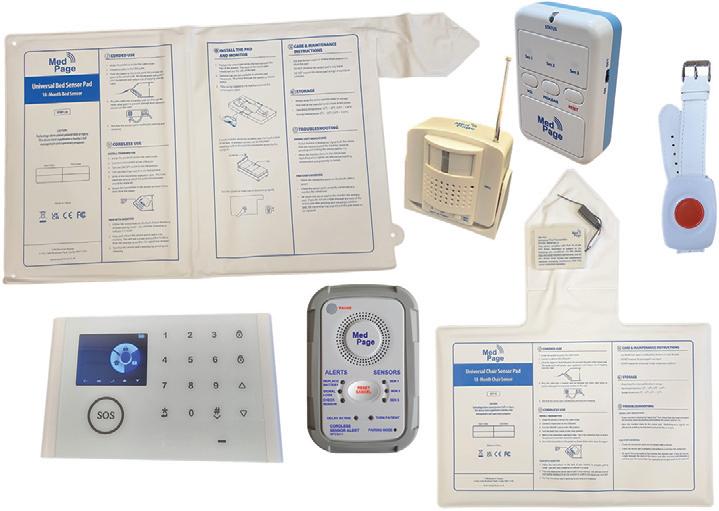
The HDKMB2 is a thoughtfully curated kit aimed at supporting patients transitioning from hospital to home care. It includes essential tools to mitigate fall risks and promote recovery. This kit is ideal for caregivers seeking a comprehensive solution to enhance patient safety during the critical post-discharge period.
MULTI-PORT WIRELESS SENSOR INPUT EXPANDER FOR NURSE CALL CONNECTION
CMEX-21
The CMEX-21 is Medpage’s latest innovation, designed to integrate seamlessly with existing nurse call systems. This multi-port expander allows for the connection of multiple wireless sensors, enhancing the
monitoring capabilities of healthcare facilities. Its versatility makes it a valuable addition to any care environment, ensuring timely responses to patient needs.
RON-WC2 WATERPROOF DISABLED PULL CORD ALARM TRANSMITTER WITH WIRELESS ALARM RECEIVER
The RON-WC2 is a robust solution for disabled individuals requiring immediate assistance. This waterproof pull cord alarm is ideal for use in bathrooms and other high-risk areas. Paired with a wireless alarm receiver, it ensures that help is just a pull away. Features include:
Waterproof Design: Suitable for wet environments.
• Wireless Connectivity: Reliable transmission to the alarm receiver. Ease of Installation: Simple setup for quick deployment. WHY CHOOSE MEDPAGE?
Medpage’s commitment to innovation and quality is evident in their product range. Each solution is designed with the user’s safety and convenience in mind, making them a trusted choice for caregivers and healthcare providers alike.
By investing in these advanced fall prevention tools, families and facilities can create safer environments for those at risk. Medpage continues to lead the way in providing practical, reliable solutions that make a real difference.
For more information, visit Medpage’s official website or contact their team to explore these products further. Safety starts with the right tools, and Medpage delivers just that. www.easylinkuk.co.uk
T: 01536 264 869
Courtney Thorne, a long-standing innovator in healthcare communication systems, is setting new standards in the care home sector with its advanced wireless nurse call technology—designed to improve resident safety, enhance staff efficiency, and support a more responsive care environment.
With over 30 years of experience serving the UK healthcare market, Courtney Thorne’s systems are now trusted by thousands of care homes nationwide. Unlike traditional hardwired solutions, their wireless nurse call systems offer non-invasive installation, scalability, and smart analytics—making them ideal for both new builds and retrofit projects.
“At the heart of our technology is the belief that better communication leads to better care,” says Graham Vickrage, Managing Director at Courtney Thorne. “Our wireless systems not only reduce response times but also empower staff
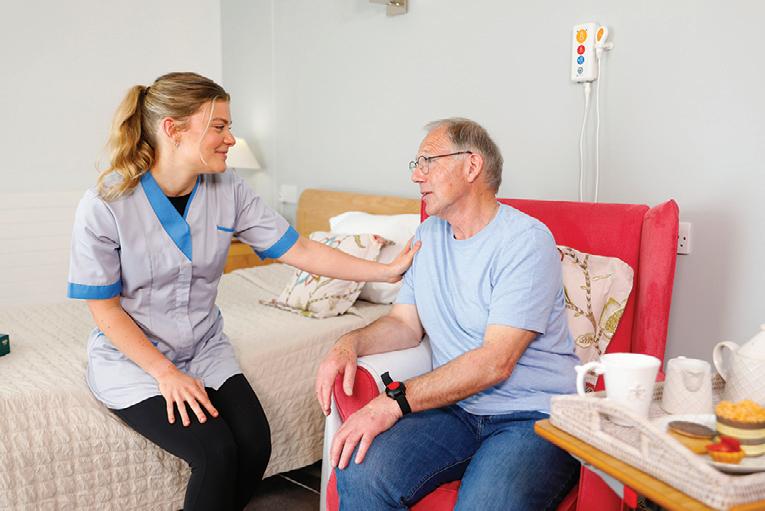
with the tools they need to deliver safe, person-centred care.”
Care providers are increasingly choosing wireless systems for their flexibility, reliability, and cost-effectiveness. With a full suite of accessories—including neck pendants, door monitors, fall detection, and bed sensors—Courtney Thorne systems can be tailored to meet the specific needs of each home and resident.
In an industry where compliance, safety, and staff pressures are always front of mind, Courtney Thorne provides more than just products—they offer ongoing support, training, and a commitment to innovation that helps care homes futureproof their operations.
For more information or to book a free demo, visit www.c-t.co.uk or contact info@c-t.co.uk.
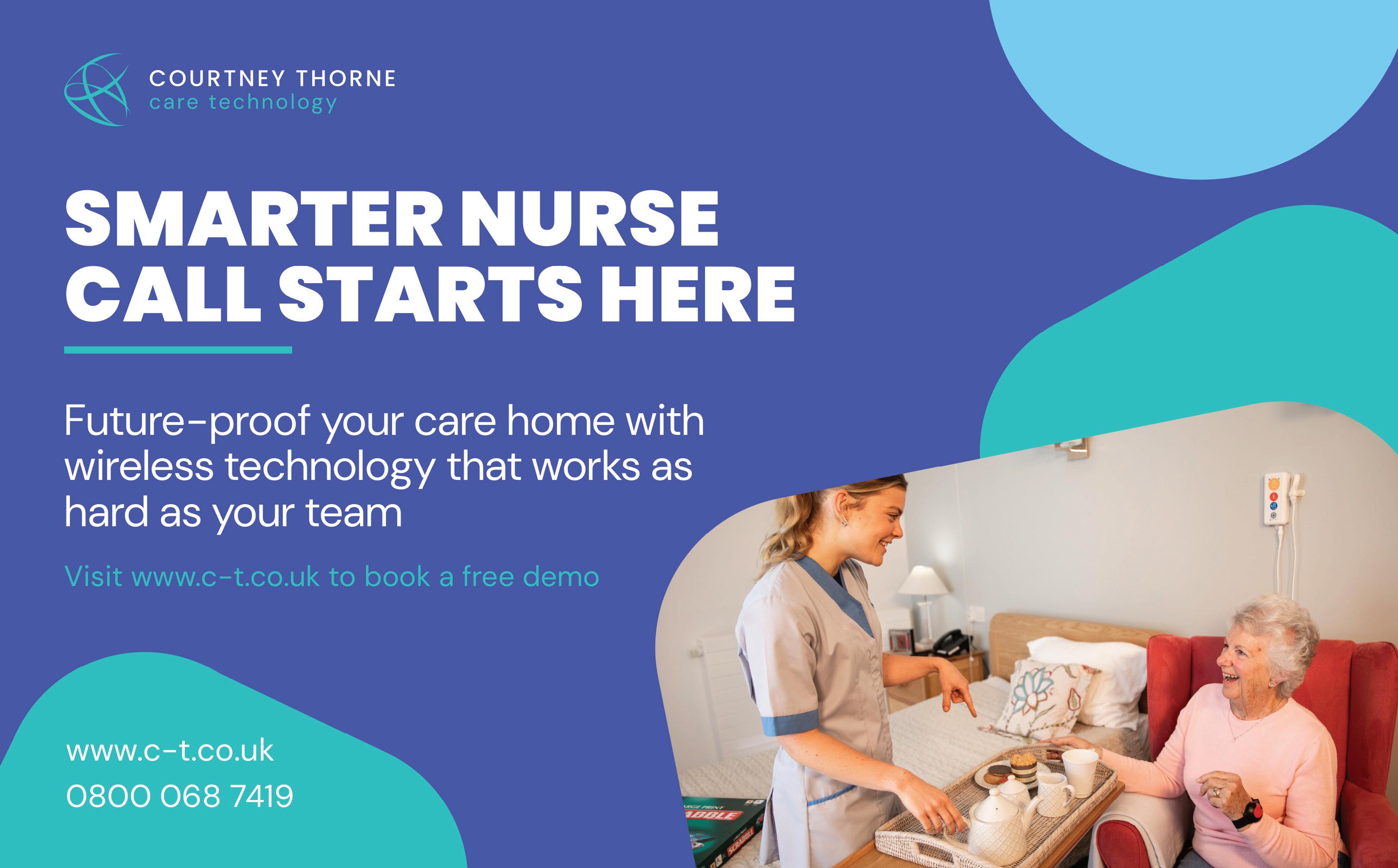
Care homes across the UK are transforming how they deliver care thanks to SyndoraAlto, the newly rebranded name behind CHARIS, the UK’s most advanced digital nurse call system.
Fully supplied, installed, and maintained from just £6.40 per bed, per month, CHARIS delivers smarter, safer, and more connected care through real-time alerts, mobile integration, and intuitive smart displays that help staff respond faster when residents need them most.
Every CHARIS system comes fully inclusive with 15” smart displays, help buttons, pull cords, guaranteed radio coverage, and 24/7 UK technical support, all backed by SyndoraAlto’s trusted installation and maintenance team.

For care providers not yet ready to replace their existing nurse call system, AltoEnhance offers the perfect first step into digital care.
Available from just £129.00 per month, AltoEnhance seamlessly connects to your current nurse call system, bringing digital reporting, mobile alerts, and actionable insights without the need for a full system upgrade.
“Technology should make care easier, not harder,” says Louis Johnson, Managing Director. “CHARIS and AltoEnhance connect people, information, and action empowering care teams to deliver truly person-centred care.”

�� Meet the team & learn more at www.syndoraalto.com
Alarm Radio Monitoring is the market leader in the design, manufacture and installation of bespoke, end-to-end, wireless alarm systems and solutions for the healthcare, leisure, custodial and education industries.
We have been providing wireless alarm and nurse call systems for over 30 years. Supplying care homes and hospitals with an essential lifeline that supports the delivery of outstanding care.
We believe in excellence which translates into:
Advanced Technology
Industry-leading wireless alarm technologies and software
Bespoke Solutions
We design systems to your needs rather than your team having to work around the system Innovative Design
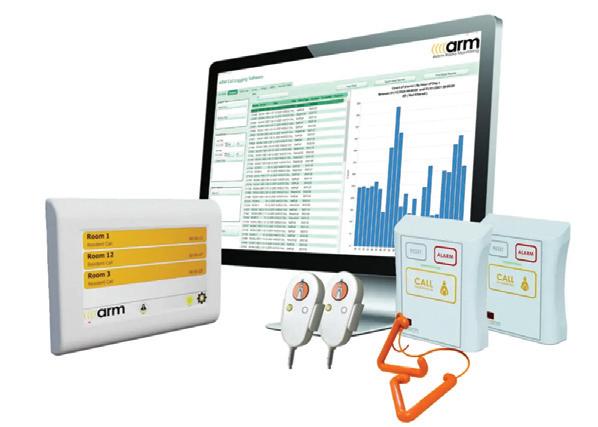
Pushing boundaries with the reliability that comes from decades in the industry Flexible Finance Options
Ensuring organisations of any size can provide safety for their staff and clients
24 Hours a Day, 365 Days a Year Service
Your ARM service team is on hand, on the phone, on-site or return to base, whether you have a service contract or not
For further information, see the advert below or visit www.arm.uk.com
Croner-i was founded in 2017 as a proud part of the Peninsula Group. Since its beginning, it has supported thousands of care providers across the UK to stay compliant with Care Quality Commission (CQC) requirements and wider regulatory obligations, setting a standard in the industry.
Through their Navigate-Care platform, Croner-i specialises in providing practical, accessible and easy-to-understand guidance that enables care services to exceed their compliance responsibilities. From residential care homes, and domiciliary care agencies to supported living providers and other care services, thousands of care providers rely on Croner-i’s resources to maintain quality, safety, and best practice across their operation.

“We understand that compliance can be a challenging and time-consuming process for care providers,” said Andrew Murphy, Head of Content at Croner-i. “Our mission is to take the complexity out of CQC and regulatory requirements, giving providers the clarity and confidence they need to deliver outstanding care.”
With Croner-i’s Navigate-Care platform, care services have access to a comprehensive library of policies,
toolkits, and expert guidance written by industry and care specialists. This includes practical step-by-step advice on preparing for CQC inspections, meeting the new Single Assessment Framework (SAF) and implementing robust quality assurance processes.
Being part of Peninsula Group allows Croner-i to benefit from decades of experience in employment law, HR, and business compliance. This ensures the advice and support given is both legally and operationally practical.
With the care sector under increasing scrutiny and public pressures, Croner-i remains committed to empowering providers with the tools they need most, to operate efficiently, protect service users, achieve inspection success and grow their care service.
Look out for more details from Croner-i in the coming weeks.
For more information about Croner-i Navigate-Care, get in touch with the partnership team at partnerships@croneri.co.uk.
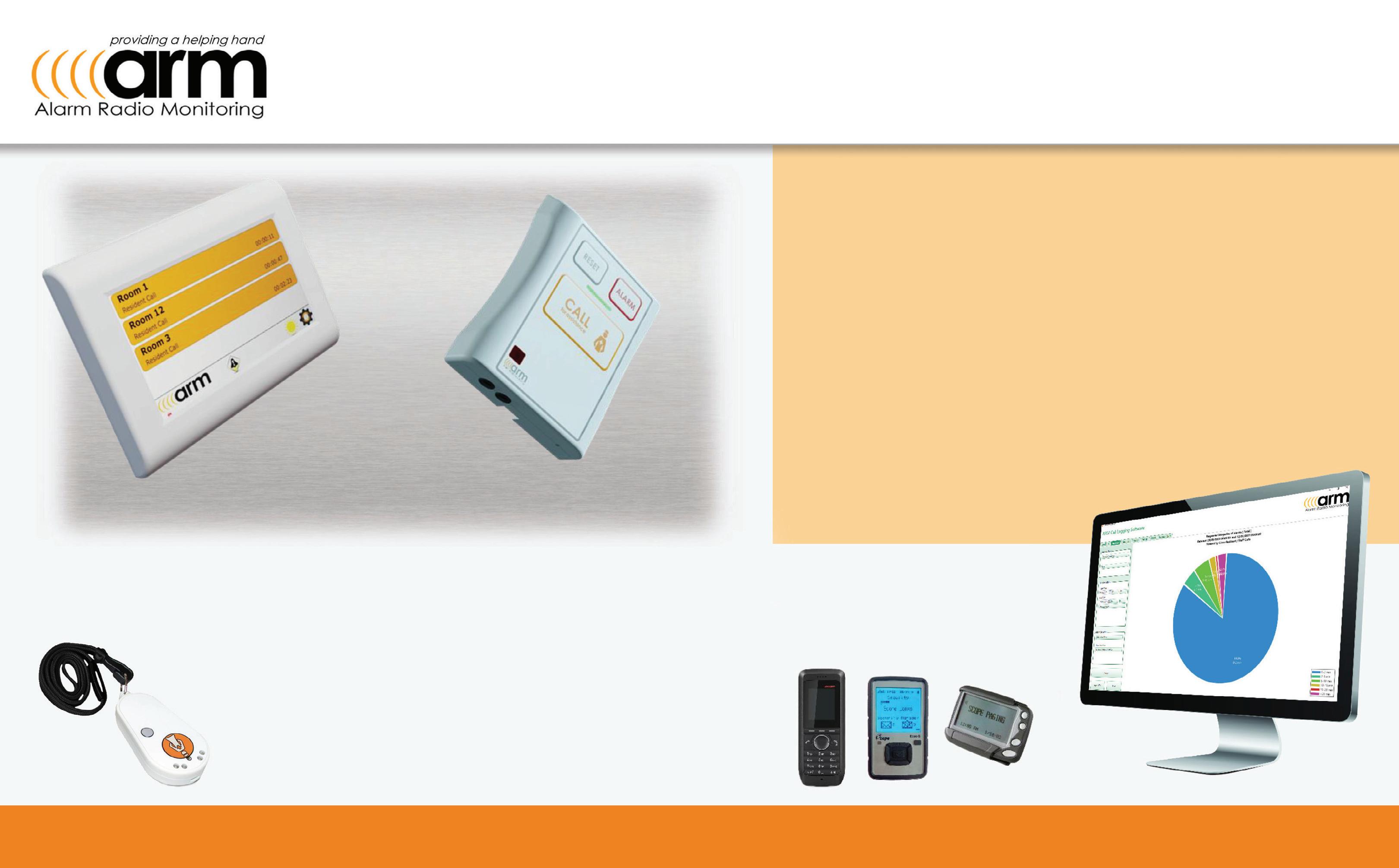
The wireless ARM Nurse Call system has been developed over 30 years with both the client and user in mind.
It enables staff to efficiently answer calls, making the management of resources more flexible and provides the functionality you would expect of any nurse call system.
The system is quick and easy to install and works wirelessly, using radio communication between both the call points and the system infrastructure.
Data Analysis software provides a full audit trail of events
The all-new call logging software from ARM enhances the functionality of your care call system dramatically.
• It can help you track the quality of your service to your residents.
• It can help you demonstrate compliance with your aims and best practices, both to relatives and to authorities.
• It can help you find bottlenecks in service provision, track staffing requirements, and allow you to ensure staff are meeting expectations.
• Most importantly, it provides assurance that you know and can demonstrate what is happening in your care home.
Call messages can be sent direct to staff to speed up response times and can also be integrated to work with smart phones & messaging.
Sensore launches a smart pressure ulcer prevention system, a breakthrough technology combining a smart fabric sensor mat with an intuitive app and powerful AI analytics. Today’s best practice is reactive: manual checks and frequent repositioning. Sensore flips the model - continuously monitoring pressure distribution in real-time and providing simple preventative alerts, so users stay protected while easing the daily vigilance demand on users and carers.
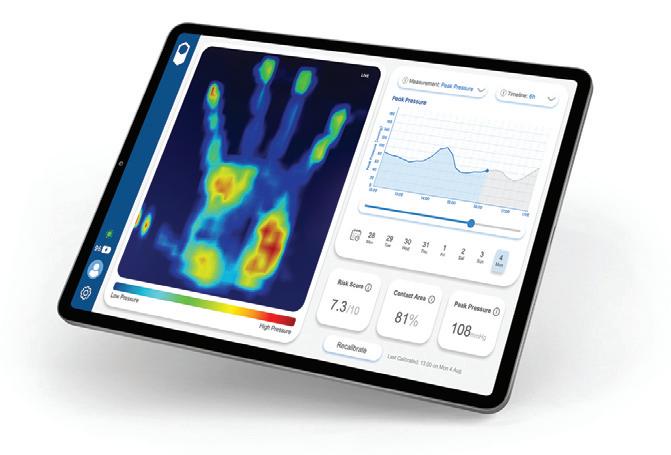
A personal early-warning system that integrates seamlessly into any wheelchair or bed, Sensore is built for elegant simplicity - restoring peace of mind for wheelchair users and supporting higher-quality, more

consistent care. For care providers, Sensore can help standardise prevention workflows and contribute to meaningful cost savings, while building a unique dataset to advance pressure-injury research.
Sensore is supported by clinical experts: "We believe Sensore’s continuous pressure monitoring will have a transformational impact on our ability to prevent and manage pressure ulcers effectively, while driving measurable improvements in patient care quality" - NHS Consultant Clinical Scientist Specialist in Clinical Biomedical Engineering Visit www.sensore.health for more information, to sign up for early access and book a free demo.
Technology has made people more connected with the world around them and the revolution in assistive care devices has made it possible for the elderly to spend their last years in a comfortable and familiar environment. These devices have also made it easier for home carers to provide quality care for their loved ones while managing their own lives. They allow you to care for your elderly whether they are travelling in the city for errands, staying alone at home, or staying in the same home as you. They are also helping nursing homes provide better care for them with discrete monitoring and quick responses to emergencies. If you’re looking for these kinds of assistive care devices for your loved ones or nursing home, Frequency Precision produce some of the best systems available to help you with elderly care
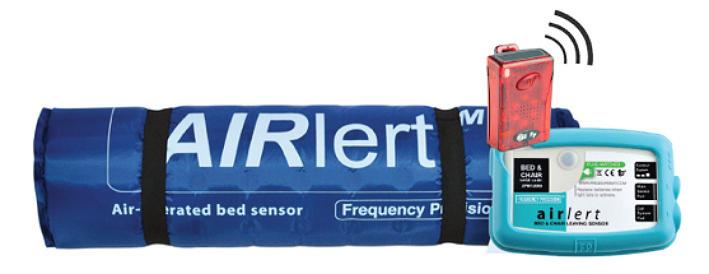
and mobility monitoring, ranging from bed, chair and floor sensor mats through fall monitoring and GPS tracking to fully integrated nurse call plug or wireless systems.
Phone: 01837 810590
Email: contact@frequencyprecision.com
Website: www.frequencyprecision.com


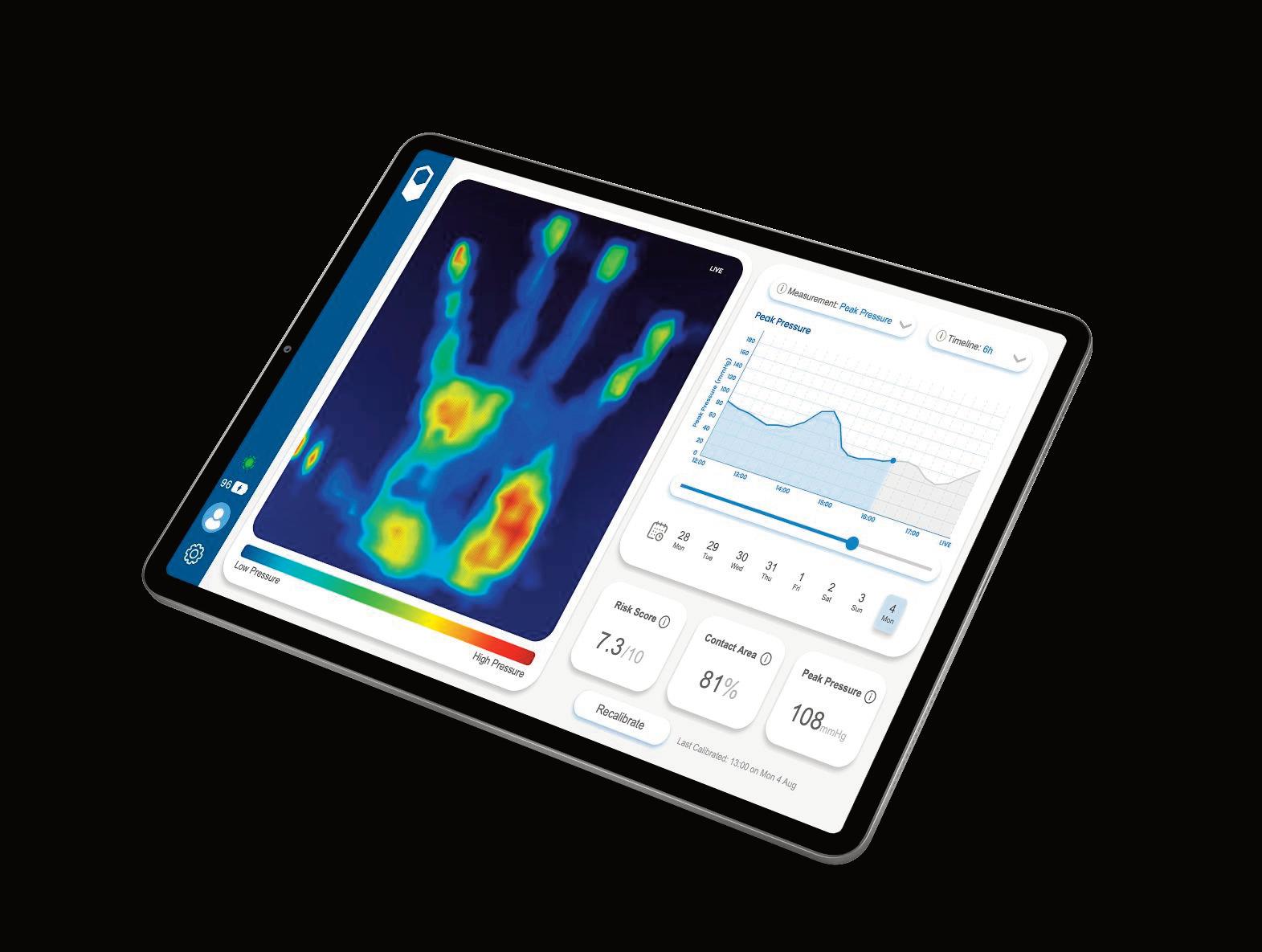
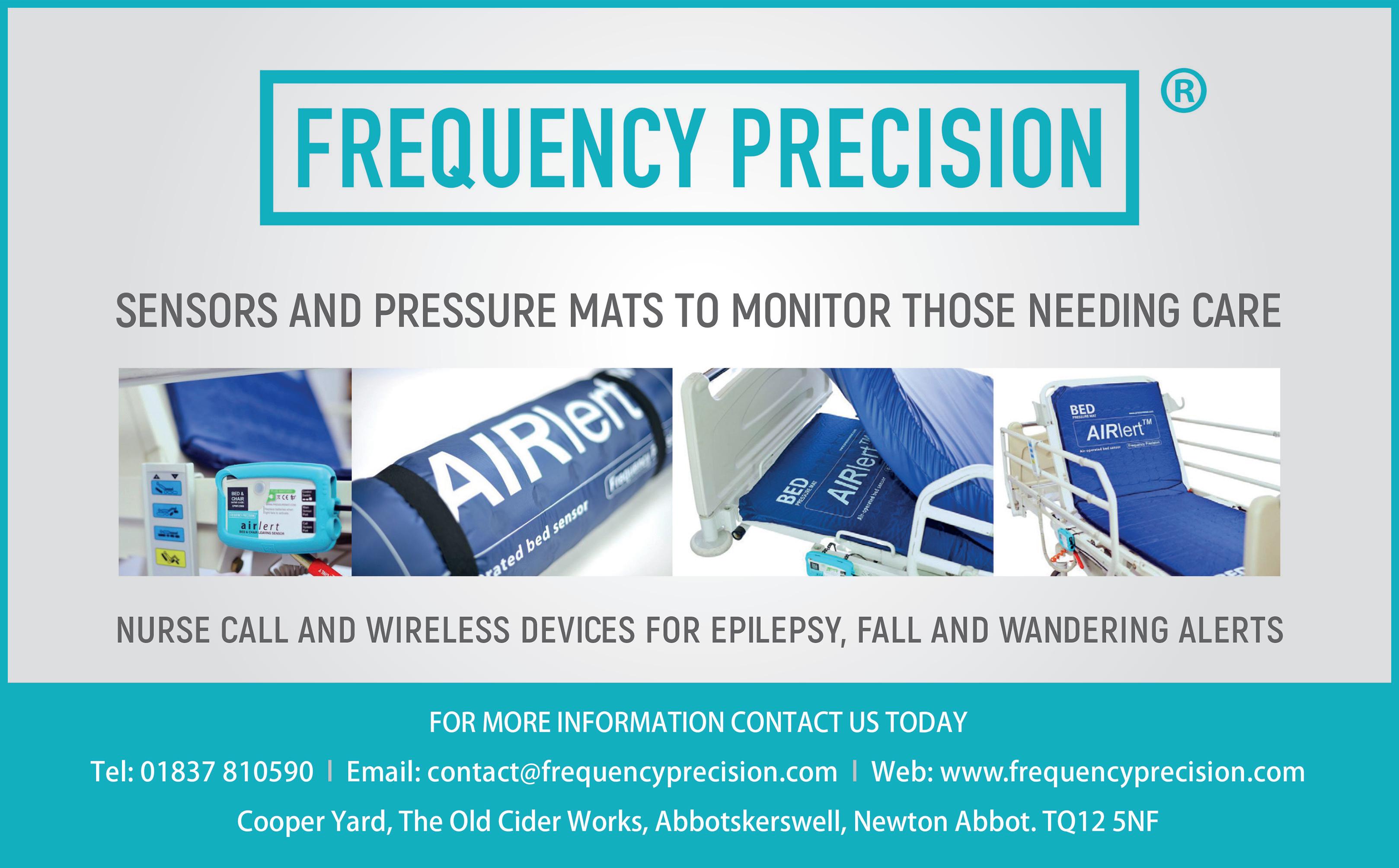
The NHS Long Term Plan is reshaping healthcare to make it more personal, preventative, and accessible. At the heart of this transformation are three strategic shifts: delivering more care in the community, embracing digital solutions, and focusing on prevention rather than treatment. For patients and carers, these changes mean more support at home, fewer hospital visits, and better tools to manage health.
One innovation helping to make this vision a reality is Evondos—an automated medication dispensing service and virtual care platform designed to support safe, timely, and consistent medicine use at home.
SUPPORTING INDEPENDENCE AND SAFETY
Evondos Anna Medicine Dispensing Robot is installed in the patient’s home and dispenses pre-packed doses at the right time. It provides spoken instructions and visual cues, making it easy to use for people of different ages and abilities. If a dose is missed, the medication is stored safely and securely inside the device until a carer or healthcare professional can follow up.
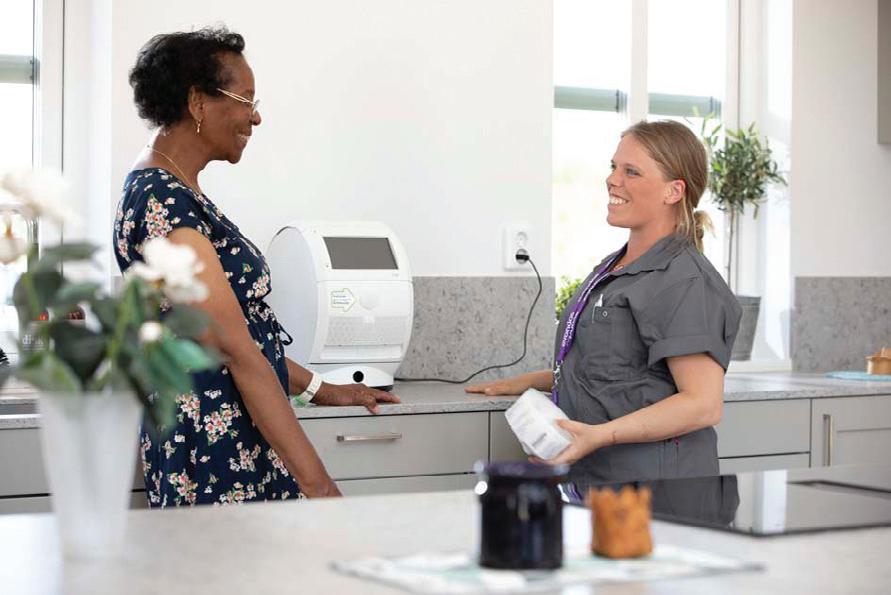
This is especially important for patients with time-sensitive or multi-dose medication schedules, such as those managing diabetes, Parkinson’s, or heart conditions. Evondos ensures that every dose is delivered as prescribed, helping prevent complications and hospital admissions.
PEACE OF MIND FOR CARERS
For carers—whether family members or professionals—Evondos offers reassurance. You don’t need to be present for every dose, and you’ll be notified if a dose is missed. This reduces stress and allows carers to focus on other aspects of support, knowing that medication is being managed reliably.
Evondos also supports virtual care through its built-in two-way video camera, allowing care professionals to check in with patients remotely. This adds a personal touch to digital care and helps maintain strong relationships between patients and their carers.
Evondos includes a built-in roaming cellular SIM card, which means it connects automatically—no home internet or technical setup is required. Patients don’t need to understand or manage any digital connectivity. This makes Evondos accessible to everyone, including those who are not confident with technology or live in areas with limited digital infrastructure.
TRAVEL MODE FOR FLEXIBILITY
Evondos also includes a travel mode, allowing patients to take their medication with them when away from home—whether visiting family, going on holiday, or staying in respite care. This keeps routines consistent and supports independence, even when life changes temporarily.
EQUALITY
Evondos is built with equality at its core. Its intuitive design, secure medication handling, automatic connectivity, and virtual care features make it accessible to people from all backgrounds. Whether you’re living alone, supported by carers, or part of a busy household, Evondos fits into your life and helps you stay well.
CONCLUSION
Evondos supports the NHS’s three strategic shifts by delivering smarter, safer, and more accessible care. For patients, it means more independence and better health. For carers, it means peace of mind and less pressure. With support for complex medication schedules, secure storage, travel flexibility, virtual care, and no need for internet knowledge, Evondos is helping bring the future of healthcare into everyday life.
If you or someone you care for could benefit from help with medication, speak to your local care team about Evondos. It’s a powerful solution designed with real people in mind.
See the advert on the facing page for details.

PASS by everyLIFE Technologies, UK and Ireland’s leading digital care management platform, showcased its award-winning software at this year’s Care Show in Birmingham.
Used by over 1,200 services and supporting more than 85,000 care professionals every day, PASS brings care planning, medication management, rostering and finance together in one simple system. The platform helps providers save time, reduce risk, and improve compliance - giving care teams more time to focus on the people they support.


Visitors to the Care Show will also be able to see PASSgenius™, the suite of AI-powered insights now built directly into the platform. PASSgenius™ analyses care notes and rostering data to highlight risks, changes, and trends that may otherwise be missed. From punctuality dashboards to health note summaries, it turns everyday information into clear, actionable insight.
Robin Batchelor, CEO at everyLIFE Technologies, said: “The Care Show is always a fantastic opportunity to meet providers, share ideas, and demonstrate how digital tools can make a real difference to quality of care.”
For more information, visit www.everylifetechnologies.com.


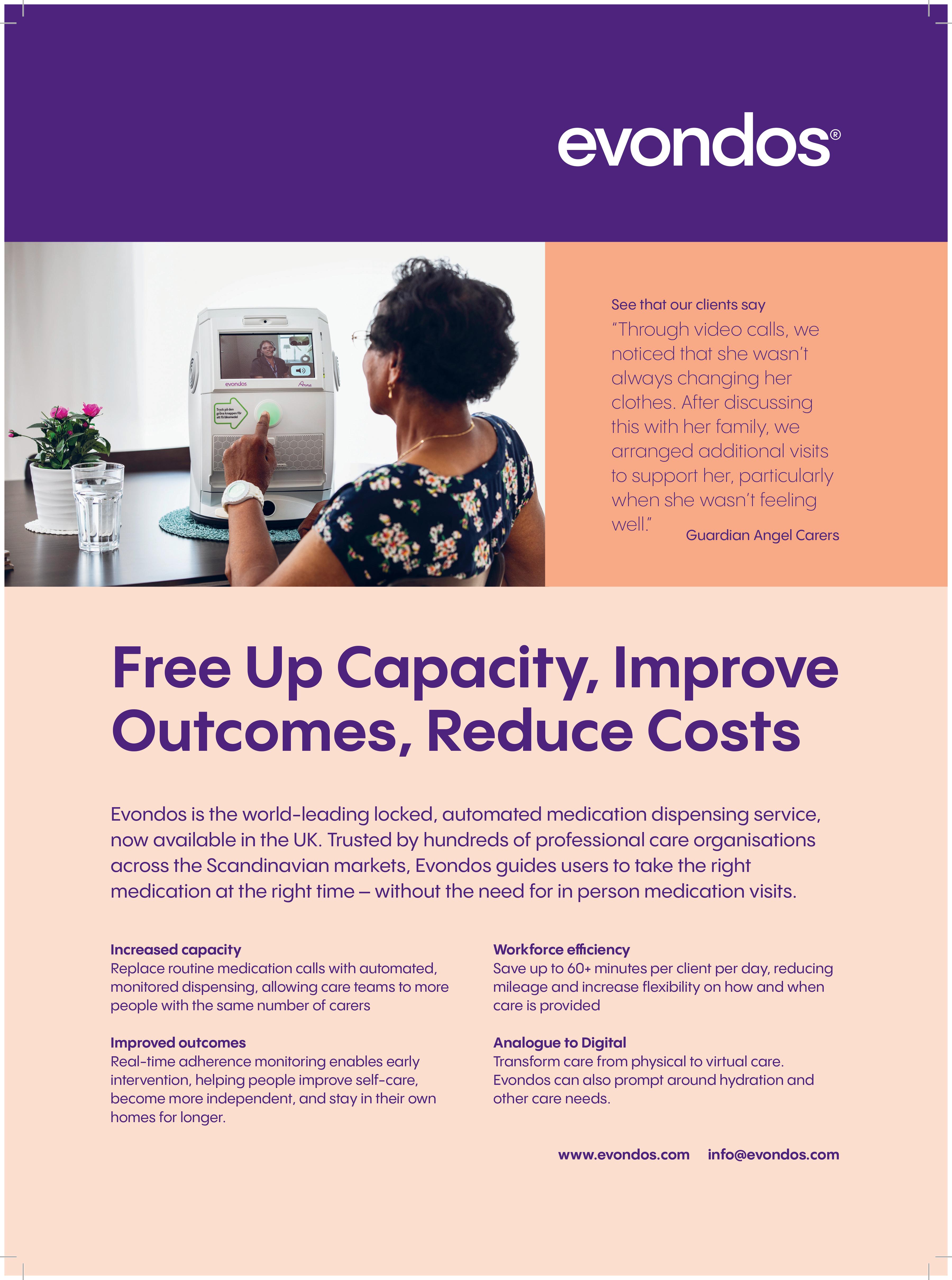
Every day, care organisations are working tirelessly to deliver essential support in the face of growing needs and rising costs. However, too many providers are stuck balancing tight budgets, having ‘just enough’ to stay afloat. The hard truth is, just enough isn’t enough—not for the providers, not for the employees, and certainly not for the clients who depend on them.
Rising operational costs—from wages and the Fair Pay Agreement to energy bills—compound historic underfunding and financial pressures. And demand for care continues to increase, creating a widening gap that organisations are often forced to fill with limited resources.
Providers then end up in survival mode, unable to invest in improving their services for today and the future.
THE NEED TO RETHINK FINANCIAL STABILITY
Care providers need to have healthy finances in social care, and that doesn’t come at odds with delivering compassionate care.
A financially strong organisation has the breathing room to improve services, retain employees, and innovate to make a meaningful difference to the lives of people they support. And having this financial security means providers can actually plan for the future rather than constantly reacting to the present.
BENEATH THE SURFACE
Social care organisations face a web of financial intricacies. Local authority

how financial pressures continue to challenge social care providers.
support often comes with layers of red tape. Managing aged debt and resolving invoicing errors take a significant amount of time that few organisations can spare. Regulation and compliance require meticulous reporting, and the sheer volume of admin work to manage all these leaves teams stretched thin. At the same time, there’s an expectation for providers to keep doing more. But without the right tools and systems in place, these compounded financial struggles threaten to overwhelm this indispensable sector.
Social care providers aren’t just keeping their organisations alive; they’re safeguarding the wellbeing of countless individuals and families.
Providers need to be able to prioritise long-term financial resilience. And part of this means having the tools—including robust financial management softwaresimplify manual processes, optimise resources, and reduce inefficiencies.
By championing financial sustainability, we’re creating conditions where employees can thrive, where clients receive the quality of care they deserve, and where the sector can confidently meet future challenges.
Find out more at: www.oneadvanced.com/ai
See the advert on the facing page.
We were excited to be heading to the Care Show in Birmingham on 8–9 October bringing something brand new with us.
At this year’s event, we launched the Data Policy Builder, a powerful new tool designed to make data protection policies simple, practical, and meaningful for your organisation. Too often, policies sit on a shelf, written in complex language that no one reads. The Data Policy Builder helps you create living documents that reflect your service, speak to your staff, and actually shape day-to-day practice.
By guiding you step by step through the process, the tool ensures your policies are DSPT-compliant and tailored to your unique risks and needs. Whether you run a single care home, a homecare service, or a larger group, this tool will help you write policies that your team can understand and use – supporting safer care and better data security.
LIVE DEMO – DATA POLICY BUILDER

The Care Show offered a first look at the Data Policy Builder in our live demo session. We’ll be focusing
on Bring Your Own Device (BYOD) policies, an area many care providers struggle with. You’ll learn:
• The risks of staff using personal devices for work
• What should be included in a robust BYOD policy
• How the tool can generate a clear, easy-to-read document for you – in minutes
We’ll also be sharing which other policies we’ll be adding to the tool in the future, so you can start planning ahead.
DROP-IN HUB – YOUR QUESTIONS ANSWERED
Throughout the Care Show, the Digital Care Hub team ran a drop-in hub where you could ask all your questions about digital technology, data protection, and cyber security. Whether you need help with the Data Security and Protection Toolkit (DSPT), want advice on cyber security risks, or just want to sense-check your approach to data sharing, we’ll be there to support you.
For further information, please see the advert below.


By Sam Wilson, Director of Apprenticeships – Exeter College
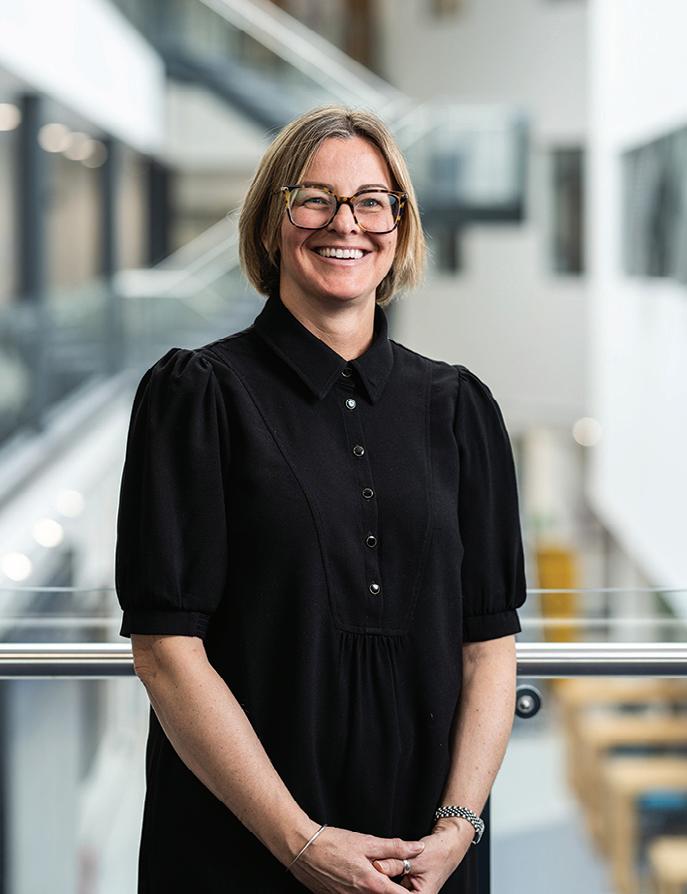
The care sector in the UK is facing a growing crisis. With an aging population, rising demand for services, and chronic staff shortages, pressure on providers has never been greater. In 2023, Skills for Care reported around 152,000 vacancies in adult social care in England alone. These challenges not only strain the system but also compromise the quality and continuity of care. Yet, a powerful and often underutilised solution lies in education and training pathways, particularly Foundation Apprenticeships, full Apprenticeships, and vocational work-based learning such as college placements and T Levels.
These routes into the care profession not only address immediate staffing shortages but also support the longterm sustainability and professionalism of the sector. By combining academic learning with hands-on practical experience, these pathways provide young people with the skills, confidence, and motivation to build fulfilling careers in care. In turn, employers benefit from a pipeline of wellprepared, passionate, and loyal workers.
FOUNDATION APPRENTICESHIPS: ENGAGING
FUTURE TALENT EARLY
Foundation Apprenticeships (FAs), offered to school leavers (and up to the age of 19 or 24 with an EHCP), provide an invaluable early introduction to the care sector. These programmes combine classroom learning with structured work placements, giving apprentices the chance to gain practical experience in real care settings in an 8-month window. By engaging with the profession early on, students gain a realistic and positive understanding of what care work involves, dispelling myths and building confidence in their abilities.
This early engagement is crucial. Foundation Apprenticeships help students make informed career choices and allow employers to spot and nurture young talent as they enter the workforce. For the care sector, which traditionally struggles to attract younger workers, FAs serve as a vital bridge between education and employment. They also broaden access to the profession, particularly among school-leavers who may not have considered care as a viable or attractive career path.
COLLEGE PLACEMENTS AND T LEVELS: BUILDING REAL-WORLD EXPERIENCE
Further education colleges play a key role in preparing students for care roles. Health and Social Care students typically complete structured placements in settings such as care homes, day centres, and domiciliary services. These experiences allow learners to apply theory in practical environments and develop essential interpersonal skills.
T Levels, introduced in 2020, are two-year programmes for 16-19 year-olds that include a minimum of 315 hours of industry placement. The Health and Science T Level equips students with both technical knowledge and soft skills like empathy, patience, and communication - all vital for high-quality care.
For employers, T Level placements offer a low-risk way to assess potential recruits in real working contexts. Students who complete meaningful placements are often more confident and better prepared for full-time roles, leading to improved retention and smoother transitions into employment.
APPRENTICESHIPS: STRENGTHENING AND RETAINING THE WORKFORCE
While Foundation Apprenticeships and T Levels lay the groundwork, full Apprenticeships serve as a critical tool for both recruitment and retention in the care sector. Apprenticeships offer a blend of paid work and formal study, allowing individuals to "earn while they learn" and progress toward nationally recognised qualifications in adult care, childcare, and support work.
Crucially, apprenticeships cater to a wide age range and can be used both for new recruits and for upskilling existing staff. This makes them incredibly versatile. For young people who may not thrive in traditional academic routes, apprenticeships offer a clear, supported pathway into meaningful employment. For care providers, investing in apprenticeships can help fill vacancies with committed, well-trained individuals while demonstrating a commitment to workforce development.
Apprenticeships also promote staff loyalty. When employees are supported to learn and develop within their role, they are more likely to stay with their employer long-term. This helps to reduce the high turnover rates that plague the care sector and improves continuity of care for service users.
In a sector crying out for skilled, compassionate workers, the potential of Foundation Apprenticeships, college placements, T Levels, and full Apprenticeships cannot be overstated. These pathways equip learners with the necessary skills and values while embedding them in the culture of care from an early stage. By integrating education with employment, we can reshape how the care sector recruits and retains its workforce. This is not a short-term fix but a sustainable, future-focused strategy.
The care sector cannot afford to wait. By actively engaging with local education providers such as colleges, schools, and apprenticeship training organisations, care employers can build a robust pipeline of skilled, motivated individuals ready to make a difference. Whether it’s offering a placement, mentoring a student, or hiring an apprentice, every action contributes to a stronger, more sustainable workforce. Reach out to Exeter College today and start shaping the next generation of carers.
Sam has been part of the apprenticeship world for over 25 years, having gained vast experience in teaching, designing and managing the quality of apprenticeship curriculum in both independent training provider & College settings. Sam joined Exeter College over 4 years ago and played a key role in the Ofsted Outstanding grading for Apprenticeships. Apprentices@exe-coll.ac.uk https://exe-coll.ac.uk/apprenticeships/
PIONEERING TECHNOLOGY-ENHANCED CARE FOR THE FUTURE
Multisensory Care Solutions represents a significant advancement in specialist care provision, founded by industry veterans Karen Bradley and Brian Lumb. Drawing upon their exceptional track record of operating a CQC Outstanding-rated residential care home for complex care residents over three decades, the company brings unparalleled expertise to the care sector.
PROVEN LEADERSHIP IN CARE EXCELLENCE
Karen Bradley brings over 45 years of comprehensive experience working with individuals living with dementia, autism, learning disabilities, and other specialist needs. As a former Registered Manager and certified trainer across multiple care disciplines, her deep understanding of person-centred care principles has consistently delivered outstanding outcomes for residents and their families.
Brian Lumb contributes extensive technical expertise from his background in multimedia systems, touchscreen displays, and point-of-information technologies. His proven track record in developing and implementing innovative digital solutions—both as a business owner and senior executive within major PLCs—provides the technical foundation for revolutionary care applications.
INNOVATION-DRIVEN CARE EXCELLENCE
The founders' unique combination of care expertise and technological innovation has enabled them to integrate cutting-edge solutions into their care delivery model. This pioneering approach to person-centred care through technology played a crucial role in achieving their CQC Outstanding rating, demonstrating measurable improvements in quality of life for residents and enhanced support for families.
INTRODUCING MULTISENSORY MAGIC
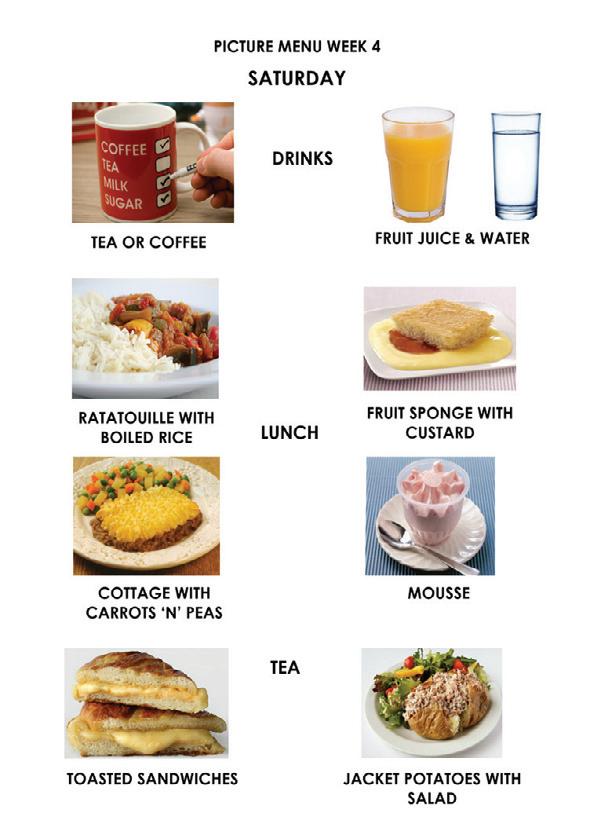
Building upon decades of practical experience, Multisensory Care Solutions has developed "Multisensory Magic"—an accessible software application designed to democratise technology-enhanced care. This cost-effective solution makes advanced multisensory interventions available to care providers across the sector, extending beyond premium facilities to benefit a broader range of residents.
Meeting Critical Care Challenges
With approximately one million people currently living with dementia in the UK—a figure projected to reach 1.5 million by 2040—the need for innovative care solutions has never been more urgent. Technology-enhanced interventions offer proven benefits in:
Sensory stimulation and engagement
Cognitive function support
Enhanced communication pathways
Improved resident wellbeing outcomes
As the care sector observes World Alzheimer's Month in September 2025, culminating in World Alzheimer's Day on 21st September, the opportunity to transform dementia care through accessible technology solutions represents both a professional imperative and a moral responsibility.
Multisensory Care Solutions stands ready to support care providers in achieving improved CQC ratings whilst delivering meaningful enhancements to resident care and family satisfaction. For more information see the advert on the facing page or please call or email Brian Lumb - 07801 498483 or Email - brian@multisensorycaresolutions.com www.multisensorycaresolutions.com
Restrictive practices such as physical restraint, bed rails, or lap belts remain one of the most challenging aspects of health and social care. Intended to keep patients safe, they can also cause harm, distress, and loss of dignity when used unnecessarily. Across the UK, the principle is clear: care must always use the least restrictive option.
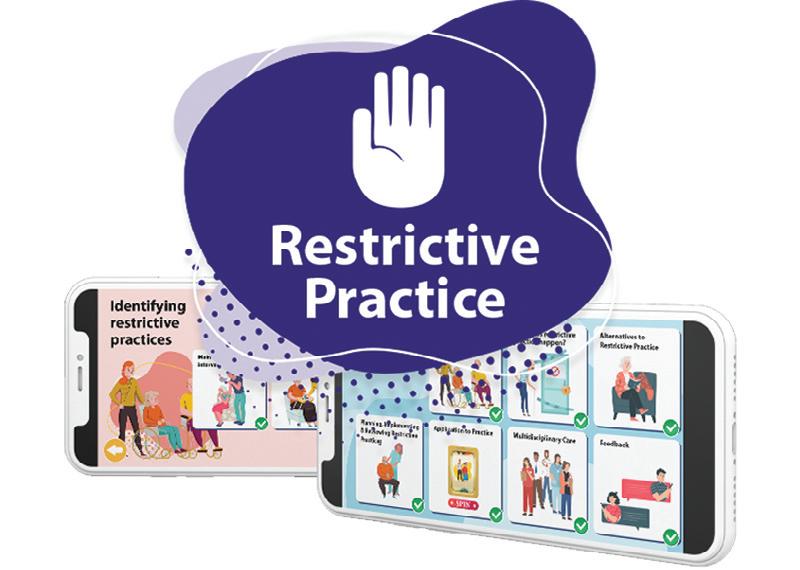
Legislation provides the framework, but culture and staff behaviour shape daily practice. Nurses, carers, and clinicians often make quick decisions balancing safety with autonomy. Without training, restrictive practices risk becoming routine. To change this, staff need better understanding of the human impact and confidence to use alternatives. That’s where Restrictive Practice makes a difference. Developed through co-design workshops with patients and carers, this gamified e-resource gives a voice to those most affected by restraint. Their lived
experiences shaped the learning, helping staff see restraint not as a neutral safety tool, but often as something frightening or disempowering.
The results are powerful. Staff trained with the resource led Quality Improvement projects, achieving measurable reductions:
- Bed rails dropped from 360 to 277 incidents
- Bed bumpers from 303 to 227
- Lap belt use halved, from 46 to 22
These improvements represent safer, more compassionate care and reassurance for families.
Restrictive practices may never disappear entirely, but they should be the exception, not the rule. With the right knowledge and tools, staff can choose safer alternatives and build a culture of dignity, compassion, and respect across UK care services. See our advert on the front cover or visit www. RestrictivePractice.com



Users / providers are enabled to ‘CONJURE
and reminiscence therapy sessions. Audio, video, slide shows, text, images and aromas can all be blended
using multiple screen displays.




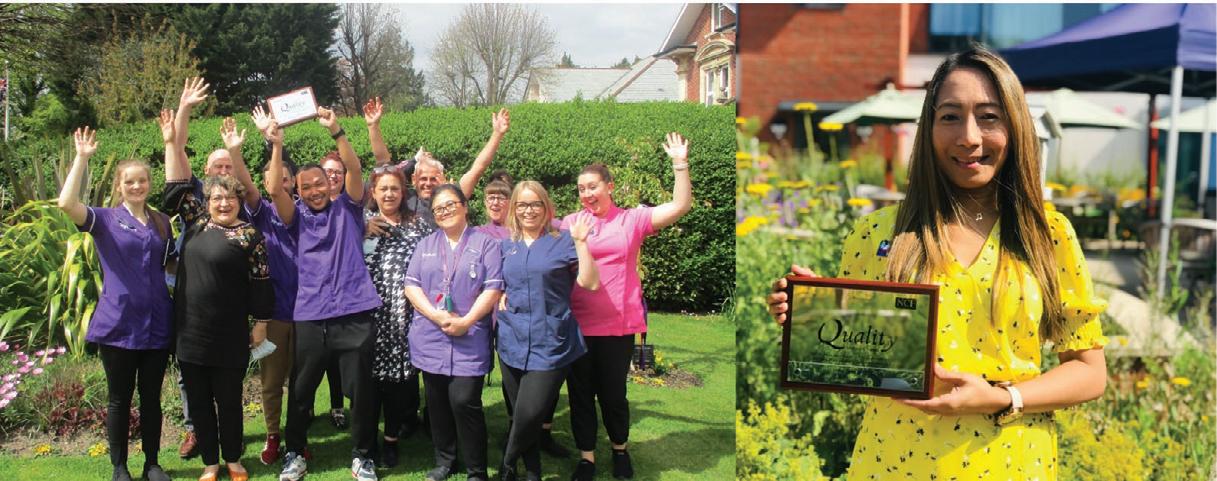
The Gold Standards Framework (GSF) Charity equips your team with the skills, confidence, and compassion to deliver person-centred care that truly makes a difference.
For a limited time, the GSF Care Homes Training & Accreditation Programme is available at 50% OFF – now only £1,095
This affordable, high-impact training is designed for your whole organisation (for training
GSF Accreditation is CQC-recognised, endorsed by leading care organisations, and more than 97% of accredited teams report better experiences for people and their families.
For more information, visit: www.goldstandardsframework.org.uk / 020 7789 3740 Future-proof your care. Empower your workforce. See the advert on page 7 for more information.

Care home residents, new staff and visitors can all benefit from clear way-finding signage, which is why the Care Quality Commission places great importance on a well thought out signage scheme – especially where memory care needs demand specialist input. Add the need to reflect a group's branding objectives whilst working within interior design guidelines, and the challenge for managers tasked with sourcing signage is knowing who to call.
With nationwide coverage, Taylor and Pickles have a reputation for well thought out signage schemes which effectively and discreetly direct people around care homes for many of the UK’s leading care providers.
Starting with a client’s briefing, Taylor and Pickles carry out a comprehensive site survey and develop

detailed design proposals. Often working with a client’s interior designers, the team at Taylor and Pickles create options for bespoke signs which provide clear directions and are sympathetic to the client’s creative concepts. This custom approach prevents signs looking out of place, or like “off the shelf” stock items.
Of course, there are times when greater visual contrast is essential. Residents with memory care needs require a bold and sometimes bright scheme which might seem heavy handed elsewhere. When the special needs of these residents are added to the brief, clients can be confident that Taylor and Pickles’s approach, guided by leading academics and their experience of helping many homes through the Care Quality Commission signage inspection process, will pay off. Often a multi-tiered approach allows signs across different zones in a development to have a cohesive look yet serve differing care needs.
Taylor & Pickles also recognise a client’s commercial needs. Timely, unobtrusive surveys – effective design and tidy installation by in-house teams make Taylor and Pickles the chosen signmaker for many of the UK’s leading care home groups.
See the advert on this page for details.
"23 years, operating 4 Devon Nursing homes, has been pretty tough, as anyone in social care, knows, only too well. And if it was hard already, after 2024 budget, it's just got harder. Anyway, at heart, I am just customer of Eden Alternative, and it was a stroke of luck to come across this whilst on holiday in New Zealand in 2009. It started in USA in 1994 and now runs in 22 countries.
The fact that I am now involved with this not-for-profit organisation (in the UK area) came about when one of the 2 main UK directors died suddenly just before Covid. But it's something I have run with for 11 years to help make 'vision' a reality, not a struggle. So, being both a customer and helping the admin seems quite natural.
It is a modern philosophy of care, but moreover, it's a programme that is straight forward, tried and tested for 30 years and really works.

Its member care organisations generally become trainers for their own teams, and run it themselves.
The programme is run in person over 2-3 days or online 1 hr a wk for 7 weeks. You choose.
It addresses loneliness, helplessness and boredom and operates through 10 principles to underpin 7 critical domains of wellbeing.
Moreover, it's effective, transformational and really works. As residents, and team members wellbeing, matter so much , it's a must, in my opinion.
Geoffrey Cox Southernhealthcare.co.uk eden-alternative.co.uk"
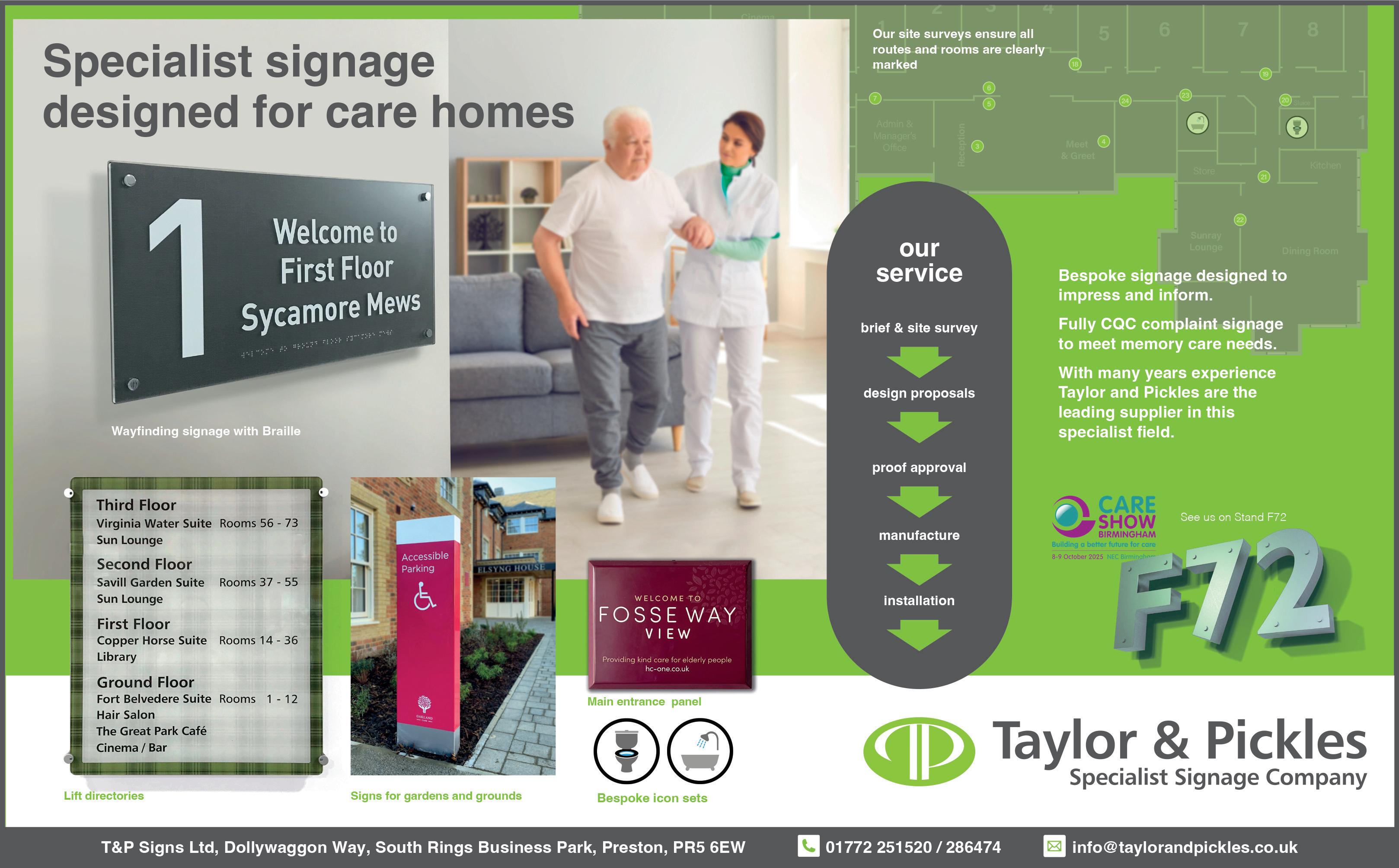
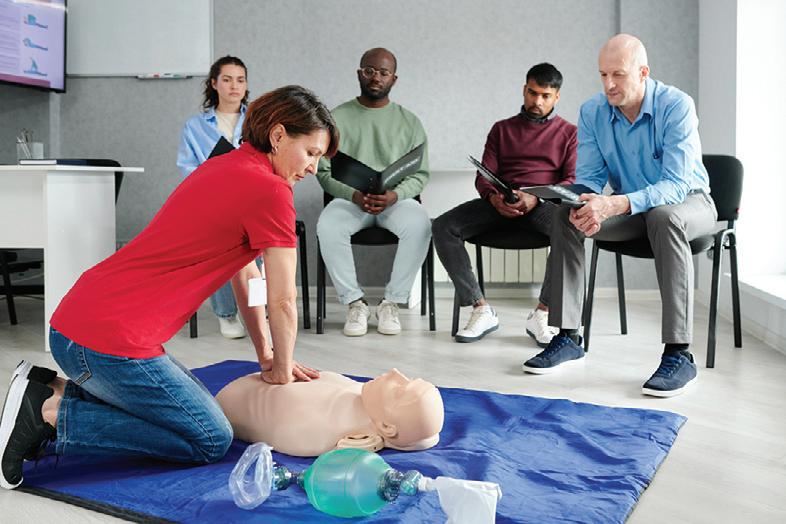
Training and learning are often treated as a requirement to be completed, but real learning is about giving your team the confidence they need to deliver safe, high-quality care. This is where blended learning comes into its own.
Blended learning recognises that effective training goes beyond theory. Knowledge is important; staff must first understand the what and the why, however knowledge alone doesn’t always prepare them for the realities of a care setting. Skills need to be practised, rehearsed and refined in an environment that’s safe before they are put into practice with residents or service users. When staff build confidence through role play, simulation, and guided practice, the leap from theory in the classroom to
the real world becomes less daunting.
The next step is proving capability on the job. Competency assessments connect learning with practice, giving managers assurance, regulators evidence, and service users confidence in the care they receive. But learning shouldn’t end there; structured pathways that map skills to roles, prompt refreshers, and track development over time keep staff on course, turning their training into a process of continual growth which is also aligned with Skills for Care standards and expectations set out by CQC.
The impact on organisations is clear – teams feel supported and this improves retention, which in the Health and Social Care sector is more important now than ever. Families, inspectors, and service users see a higher quality of care, and managers gain reassurance that their workforce is competent and confident. Ultimately, blended learning creates safer, kinder, and more consistent outcomes for everyone, meaning higher care standards and greater satisfaction all round.
Which is why your team deserves myAko.
Blended learning is more than just an approach, it’s essential for everyone in our sector!
ww.myako.online hello@myako.com 01202 283283
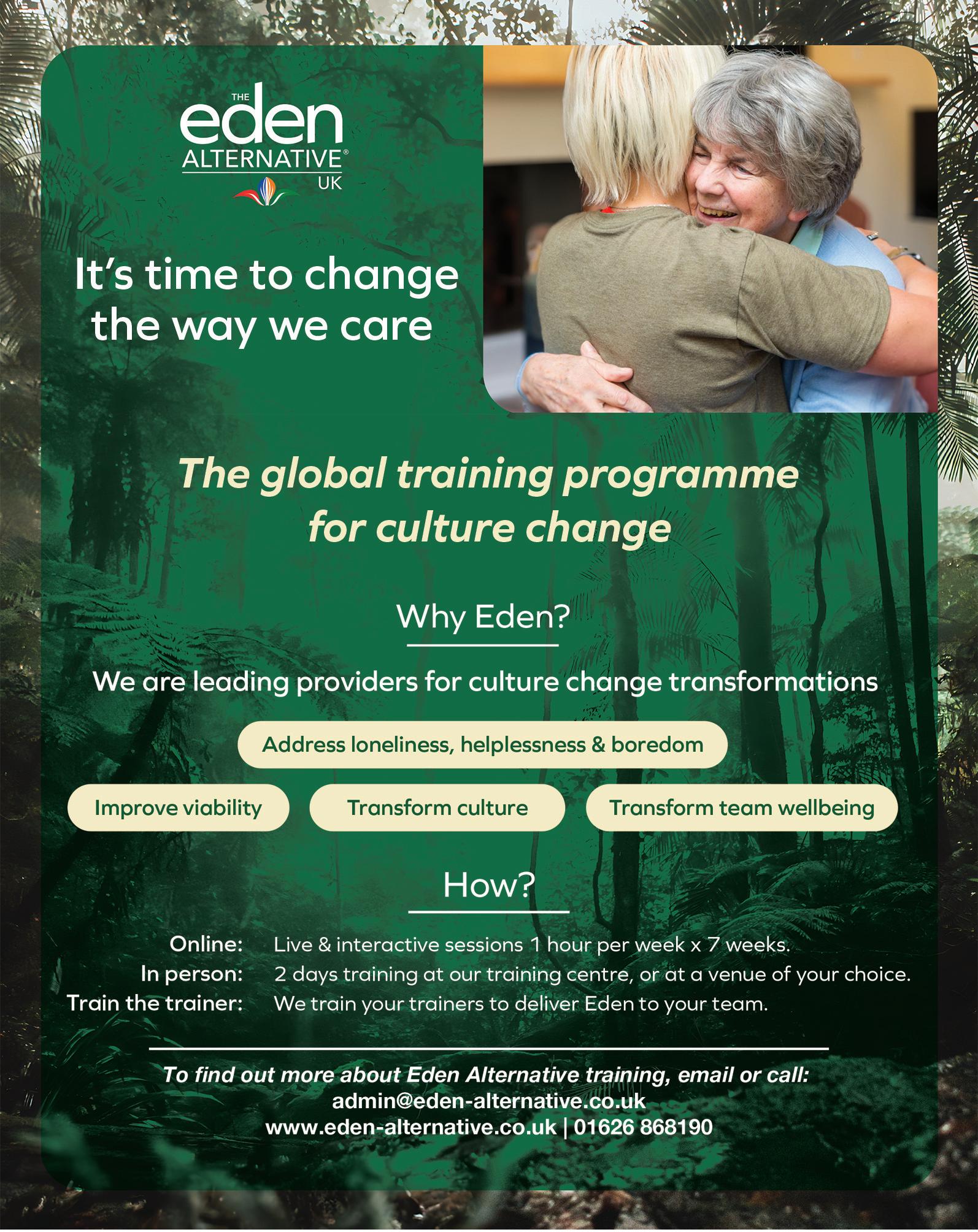





A new apprenticeship has been launched for adult care support workers who assist people with mental health challenges, including dementia and neurodiversity.
Leading training provider Realise has revealed its new Level 3 Senior Healthcare Support Worker Apprenticeship which features a specialist mental health pathway.
The apprenticeship aligns with The Care Workforce Pathway - developed by Skills for Care and the Department of Health and Social Care –which emphasises the importance of equipping staff who support people with mental ill health with the right knowledge and skills.
The programme’s focus on mental health makes it ideal for those working in complex care services or supporting individuals living with dementia or mental health conditions. It also benefits those supporting individuals with a dual diagnosis.
Standard apprenticeship funding rules apply with no age restrictions. However, learners aged 16–22 are eligible for 100% government funding, meaning non-levy employers are not required to pay the usual 5% co-investment. This is available in England only.
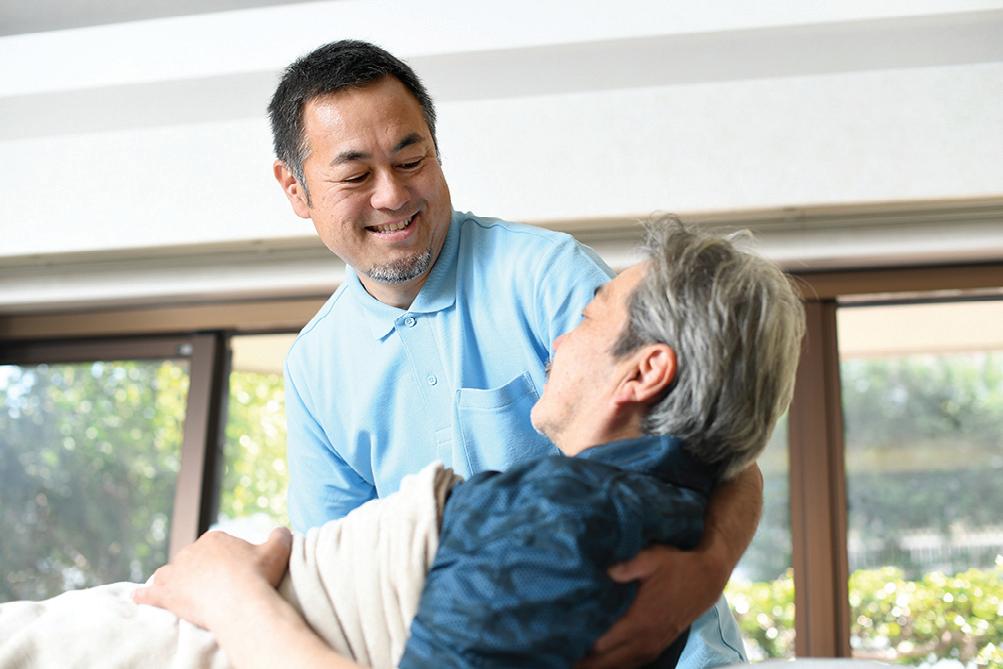
While a few other providers offer the Level 3 Senior Healthcare Support Worker Apprenticeship in Mental Health Pathway, the Realise progamme was developed in collaboration with leading industry provider Barchester Healthcare, ensuring it is closely aligned with the real-world demands of the role, particularly in complex care.
Angela Kaine, Director of Health & Social Care at Realise, said: “We fully support The Care Workforce Pathway, which emphasises the importance of people being able to receive training in areas in which they
specialise.
“Care workers supporting individuals with dementia or other mental health conditions benefit greatly from targeted training in crisis intervention, mental capacity and de-escalation techniques.
“Offering this apprenticeship can help adult care providers recruit individuals for specialised roles and improve retention - two major challenges within the sector.
“There is a wide variety of opportunities within adult care, and we’re proud to support those looking to develop both their technical skills and their chosen specialism.”
This comprehensive 18-month apprenticeship is designed to provide a rich and supportive learning experience. Learners will benefit from a blend of face-to-face support and interactive webinars, creating the perfect balance between in-person guidance and flexible online learning.
These sessions not only enhance understanding but also offer valuable opportunities to connect, collaborate, and network with peers from across the sector- helping to build confidence, share best practices, and develop lasting professional relationships.
Modules include quality improvement - where learners are challenged to identify small changes to enhance performance - and team leadership, which encourages them to take on more responsibilities.
Realise can tailor programmes to suit the employer’s needs by utilising unit selection through the diploma.
The apprenticeship is available throughout England.
For more information, visit www.realisetraining.com
In today’s regulated care environment, having clear, current, and wellcommunicated health and social care policies is essential for delivering safe, compliant services. The Care Quality Commission (CQC) now places increasing emphasis on how policies are implemented and understood—especially during registration and inspections.
Outdated or poorly communicated policies can significantly impact your CQC rating. Even if documentation is comprehensive, failure to ensure staff understand and follow procedures may lead to a “Requires Improvement” or even “Inadequate” rating under the ‘Effective’ domain.
Well-maintained policies promote consistent standards across care teams and help safeguard services when incidents arise. In regulatory investigations, the first request is often to review relevant policies—making accuracy and accessibility key to reducing legal and compliance risks.

However, keeping policies up to date is challenging. Constant changes in legislation, best practice guid-

ance, and case law mean that policies can quickly become obsolete. W&P has been a trusted provider of CQC-ready care policies and procedures for over 20 years. Our expert team monitors industry developments to ensure your policies remain fully compliant.
Our Online Policy Portal simplifies policy management. With just a few clicks, providers can update content, distribute documents to staff, track confirmations, and monitor compliance via a real-time dashboard. You can even provide temporary read-only access to inspectors—demonstrating transparency and accountability instantly.
Ensure your care service meets CQC expectations with fully up-to-date, easily accessible, and well-communicated policies.
Email: info@wandptraining.co.uk Call: 01305 767104
See the advert on page 2 for details.
Since our founding in 2010, Activities to Share has been dedicated to enhancing the lives of those in care by providing thoughtfully designed activity products. Our mission is to support activity coordinators in delivering uplifting, engaging experiences that foster connection, joy, and well-being.
We achieve this by listening closely to your feedback and evolving with your needs. Whether over the phone, via email, WhatsApp, or Live Chat on our website, our team is always ready to offer advice and help you find just the right products to bring your ideas to life.

While we embrace the convenience of technology to expand our resources and share knowledge, we remain firm believers in the irreplaceable power of sensory engagement. That’s why we continue to make our Reminiscence Kits and Sensory Bags with
real, tactile items that stimulate the senses. Some experiences—like popping bubbles for the splash, breathing in a familiar scent, or piecing together a puzzle with others—simply can’t be replicated on a screen. These sensory moments are invaluable in encouraging storytelling, sparking memories, and fostering conversation. Our values remain rooted in this commitment to meaningful connection. We’re here to partner with you—the professionals on the front lines of care—to create a sense of structure, well-being, and fun for those who need it most.
Are you longing for your activity diary to be full?
Look no further
www.activitiestoshare.co.uk are here for you! Call 0117 966 6761


Strong cash flow management can make the difference between thriving and merely surviving. Here's how to keep your care home finances on track.
For care home operators, maintaining healthy cash flow is as vital as delivering quality care. Yet many providers struggle with the timing mismatch between when costs are incurred and when payments arrive, particularly from local authorities where payment terms can stretch to 30 days or more.
The first step to effective cash flow management is knowing exactly where you stand. Weekly cash flow forecasting should be standard practice, projecting income and expenditure at least 12 weeks ahead. This allows you to spot potential shortfalls before they become critical and plan accordingly.
Key metrics to monitor include debtor days (how long it takes to receive payment), creditor days (how long you take to pay suppliers), and your current ratio (current assets divided by current liabilities). A healthy current ratio sits above 1.5, indicating sufficient liquidity to meet short-term obligations.
Late payments from local authorities remain a persistent challenge. While most councils adhere to payment terms, delays do occur, and with potentially dozens of council-funded residents, even a few late payments can strain finances significantly.
Implementing robust credit control processes and maintaining regular communication with commissioning teams helps minimise delays.
Seasonal variations in occupancy can also create unexpected cash crunches. Many homes experience dips during summer months as families explore alternative care arrangements. Building a cash reserve equivalent to at least two months of operating expenses provides a crucial buffer during quieter periods.
Consider negotiating better payment terms with key suppliers. Many are willing to extend credit periods for reliable customers, easing immediate cash pressure. Conversely, offering modest discounts for families who pay privately and settle invoices early can accelerate income.
Review your fee structure regularly. Ensure private pay rates genuinely reflect your cost base plus a reasonable margin, and don't neglect annual fee reviews with existing residents and their families. Clear communication about rising costs helps justify necessary increases.
For homes experiencing persistent cash flow challenges, invoice financing or block discounting arrangements can provide working capital by advancing funds against outstanding invoices, though fees must be weighed against the benefit.
Cash flow management isn't glamorous, but it's fundamental to sustainability. Regular monitoring, proactive planning, and swift action when issues arise will help ensure your care home remains financially stable and able to continue delivering excellent care to residents.
Global assists clients throughout the U.K. who specialise in the healthcare sector to achieve their objectives of purchase, development and refinance.
We have organised over £1.8bn for clients in the past 30 years, providing clients with competitively priced funding to refinance existing debt, ease cashflow and develop businesses further.

From helping clients make their first purchase through to allowing groups to grow significantly in size we assist at every stage of your business expansion.
Every proposal is individual and deserves to be treated that way, so we hope you will allow us to be of assistance to you and call us to chat through your plans and requirements, I am sure we will be able to tailor a facility to your requirements. Call us on 01242 227172 or e-mail us at enquiries@globalbusinessfinance.net

Since 2008, Satellite Finance has been a trusted commercial finance broker specialising in funding solutions for care homes and healthcare providers.

Based in Newport, Wales, Satellite Finance has a range of tailored business finance services from asset finance, business loans, and mortgage funding to support care home acquisitions, refurbishments, and equipment purchases.
If you’re looking for Asset Finance to help grow your business, new equipment is a must. Satellite Finance can help you to get all the equipment you need, without making large dents to your cashflow. With Asset Finance you don’t have to pay for everything upfront, you can spread the cost of your equipment over the period of time its expected to be used for which can be from 12-72

months, allowing you to spend more money on higher standard equipment without feeling the economic pinch.
Perhaps you’re looking for a loan for a new building, or to make a refurbishment in a care home or surgery? Satellite Finance works with you to choose the best loan for your project. Choose from either a Business, Professional, Personal, or Corporate & VAT loan, and because Satellite Finance has access to over 40 specialist lenders that have facilitated over £100 million in funding for more than 4,500 clients, you know you’re in good hands.
For a Mortgage Loan, Satellite Finance can help you to request a loan for anything between £50,000 – £40 million. With rates starting from just 2.25% above Bank of England base rate, your repayment period
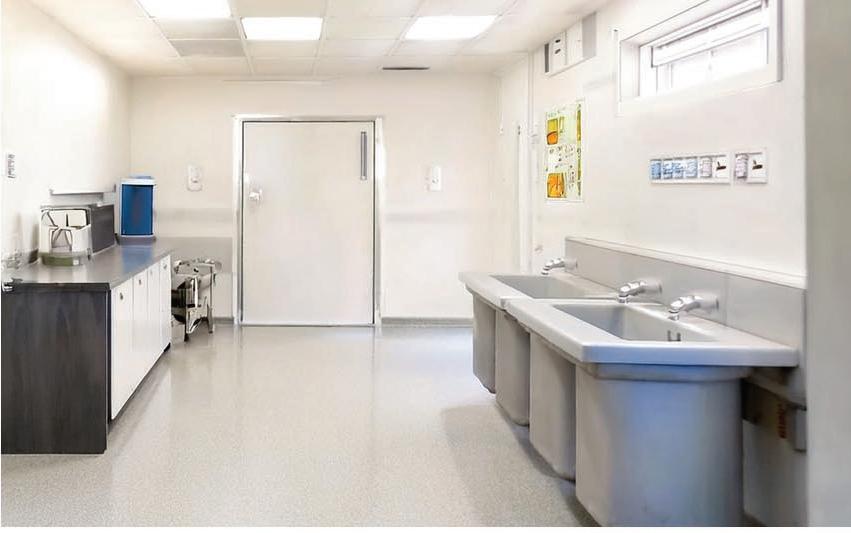



can be anywhere between 5 and 30 years. Unlike other finance companies, Satellite Finance’s terms won’t feel like a burden, as they’re both competitive and flexible, ensuring you get an arrangement that is affordable and convenient for you. Having close relationships with over 40 high street banks, challenger banks, and regional lenders all over the UK, Satellite Finance is experienced and up to date with the best lenders who offer the best rates to the healthcare sector.
